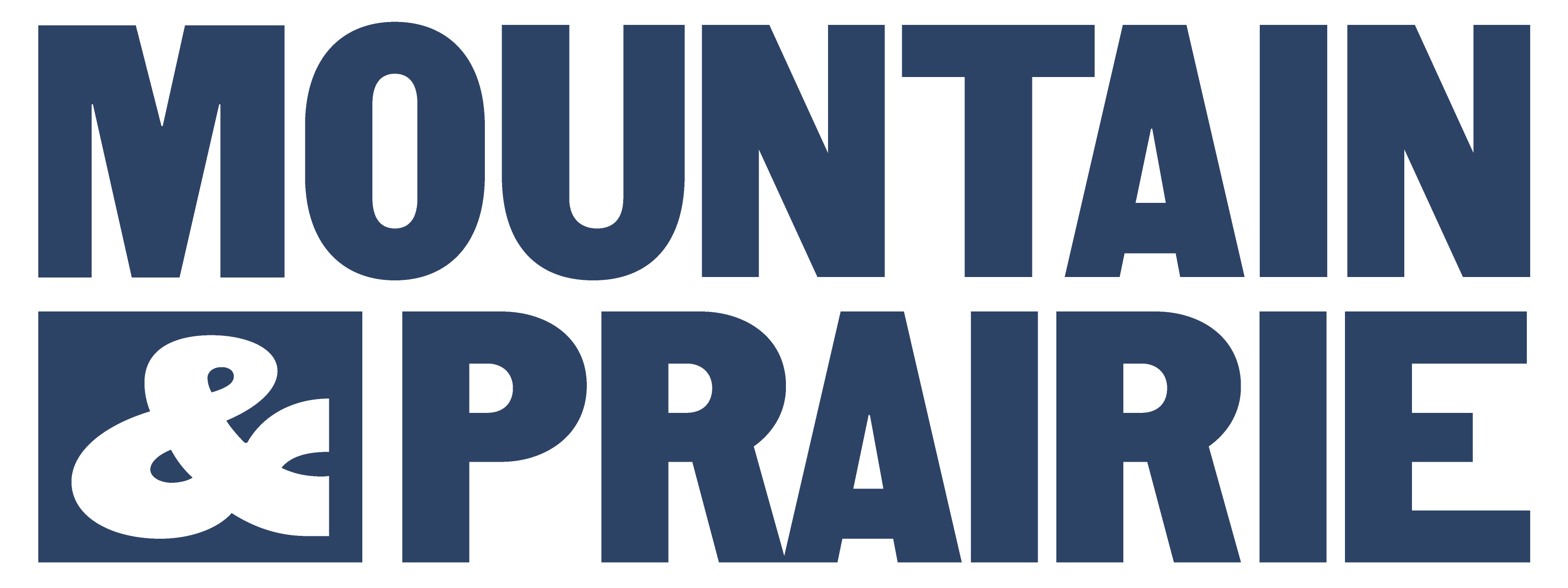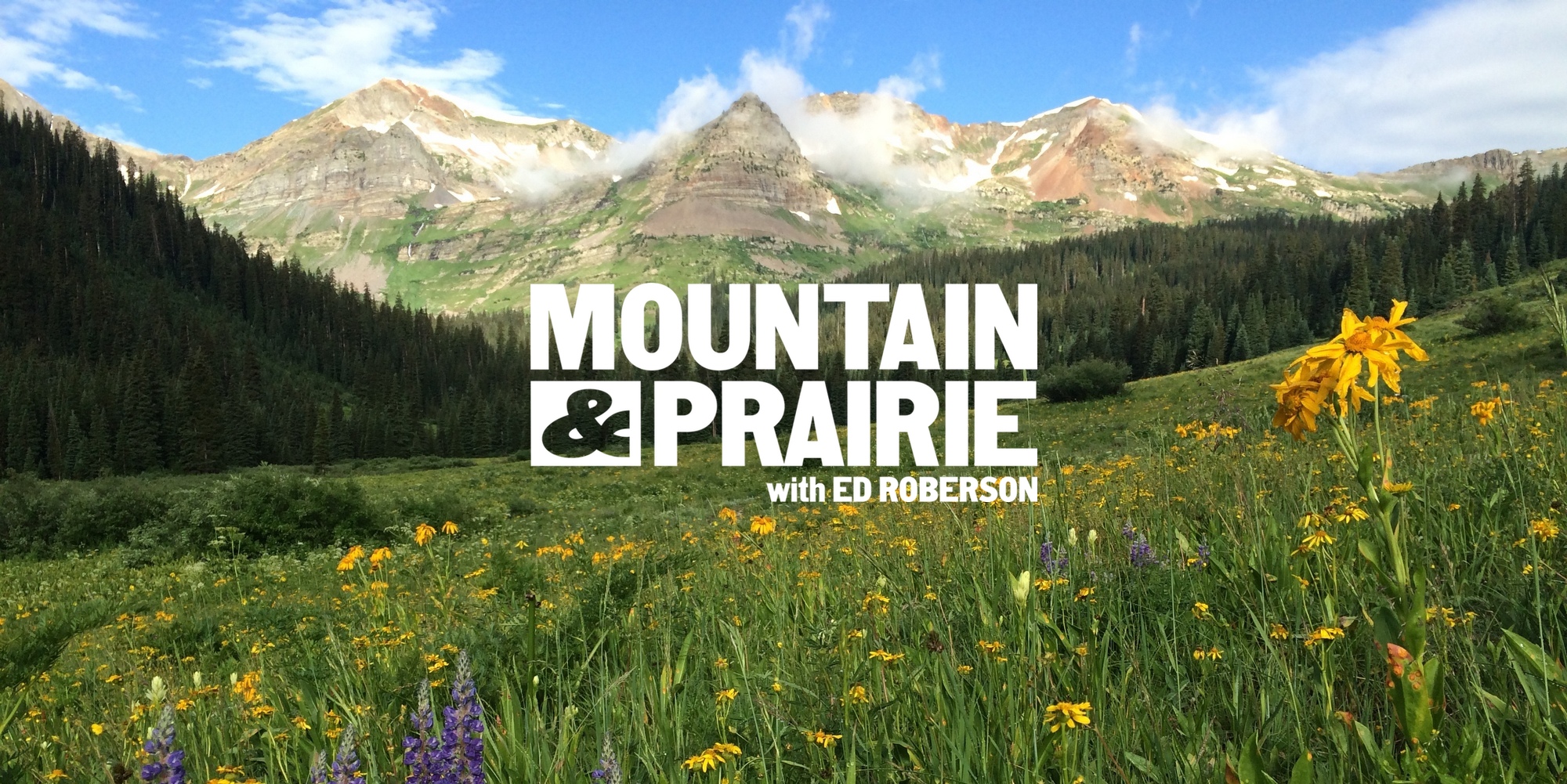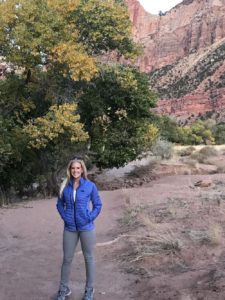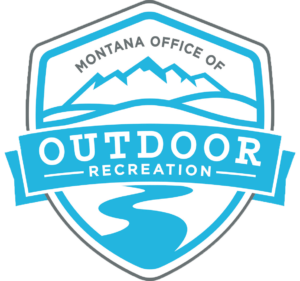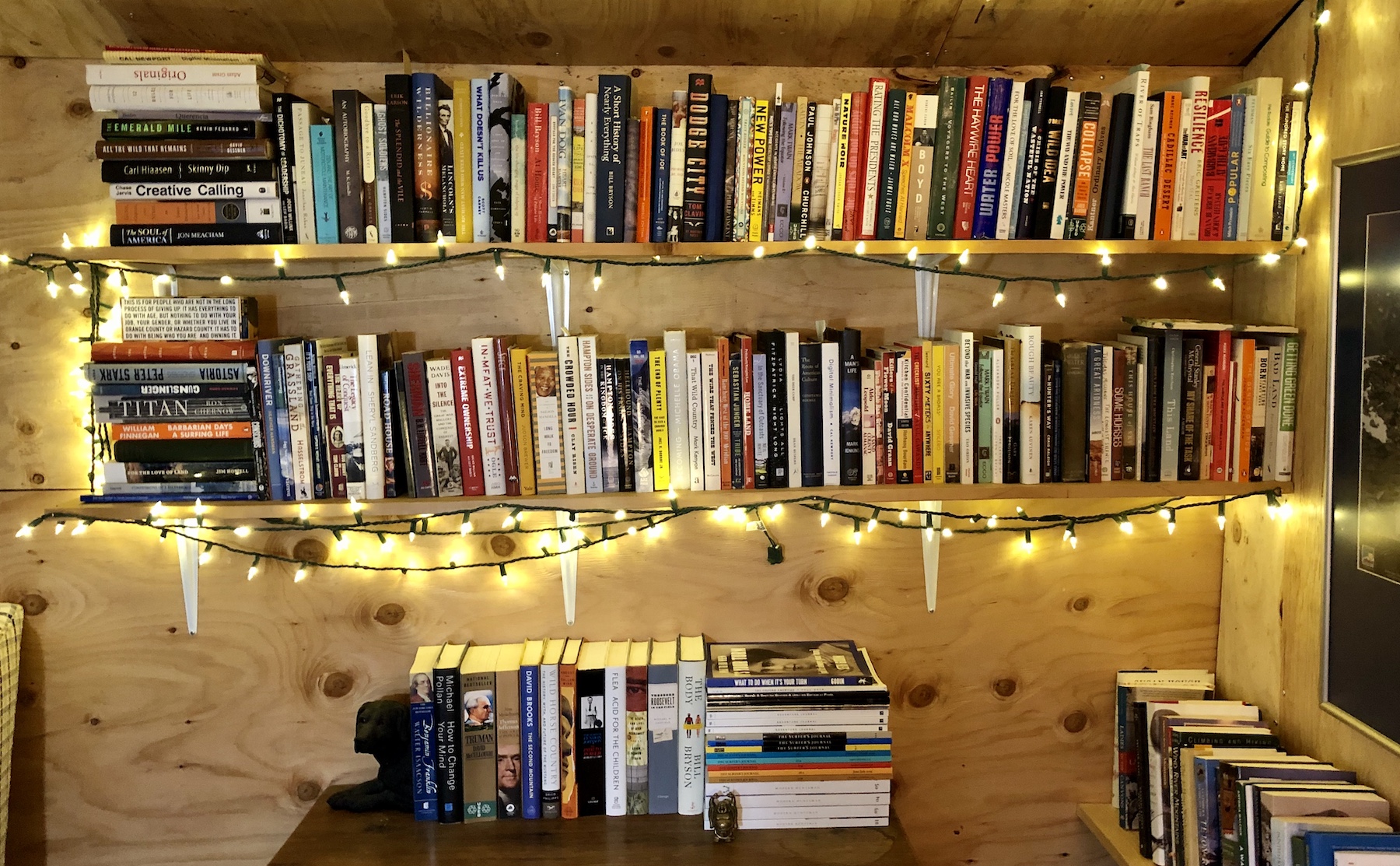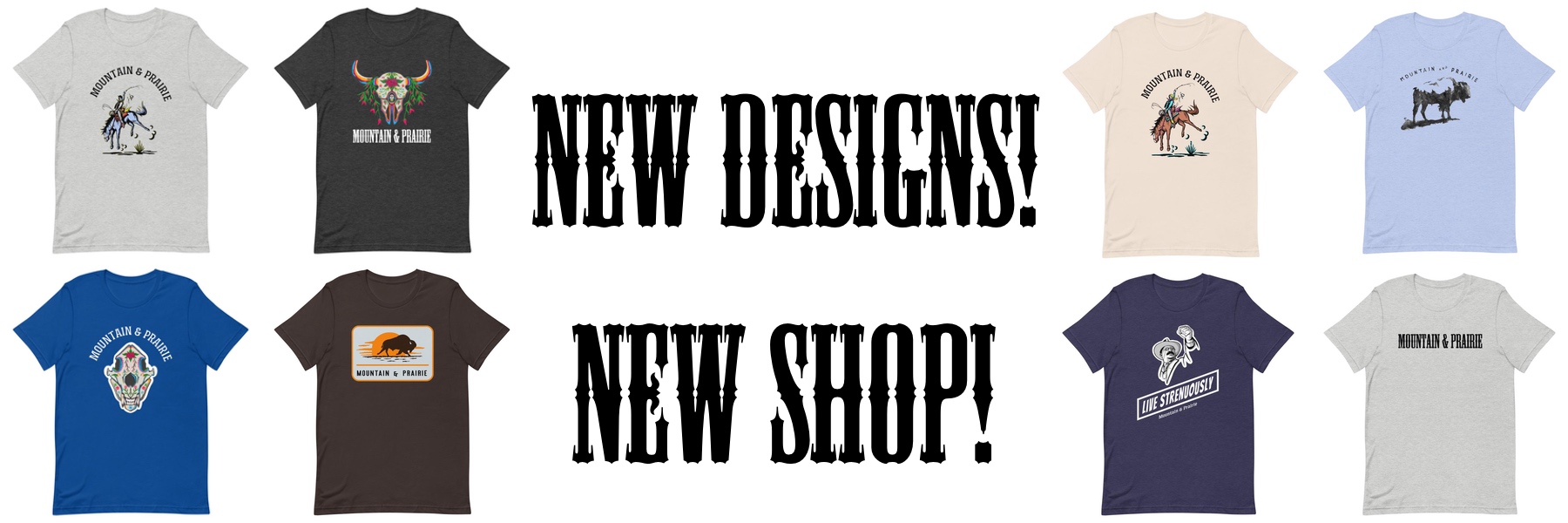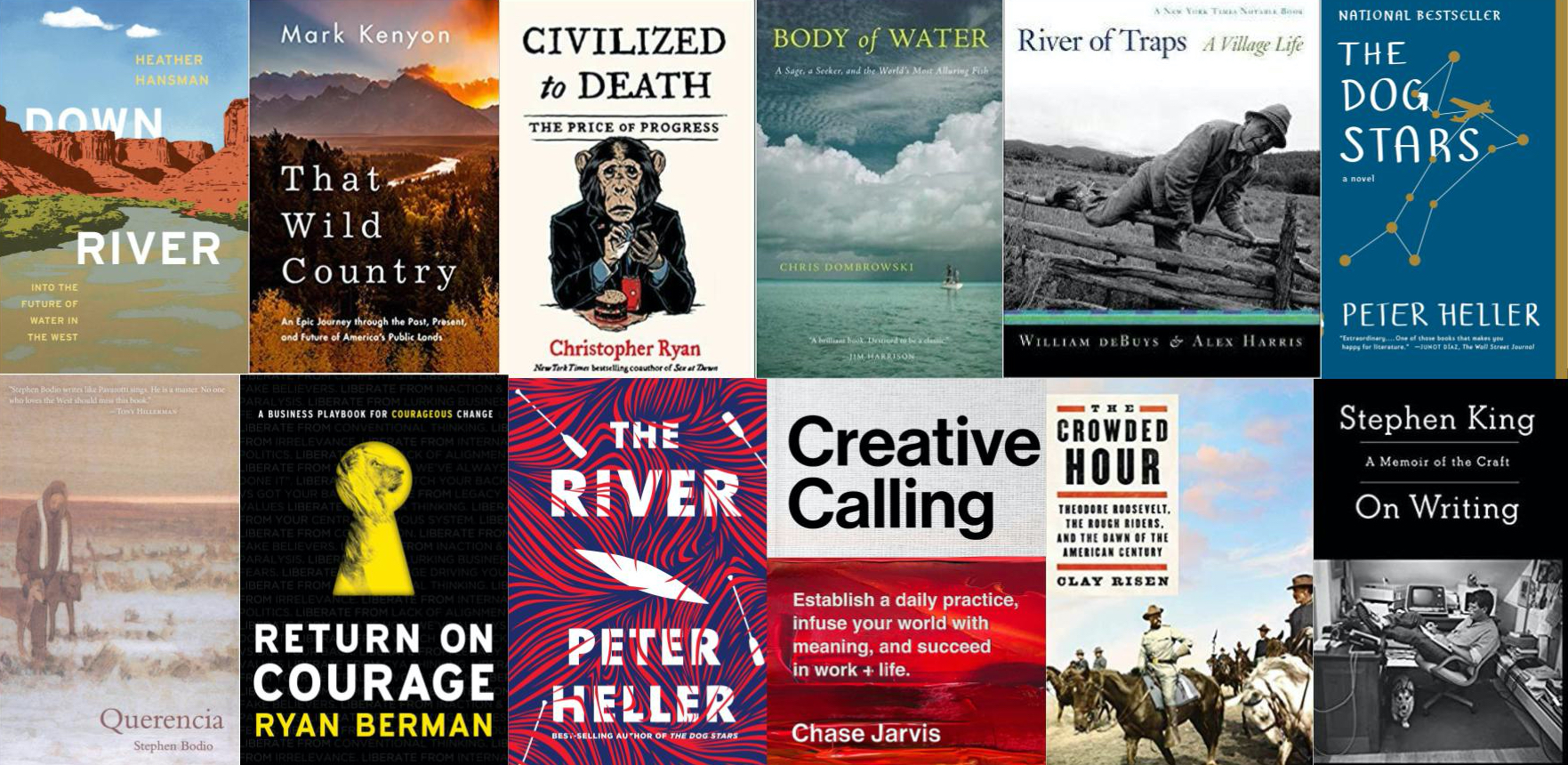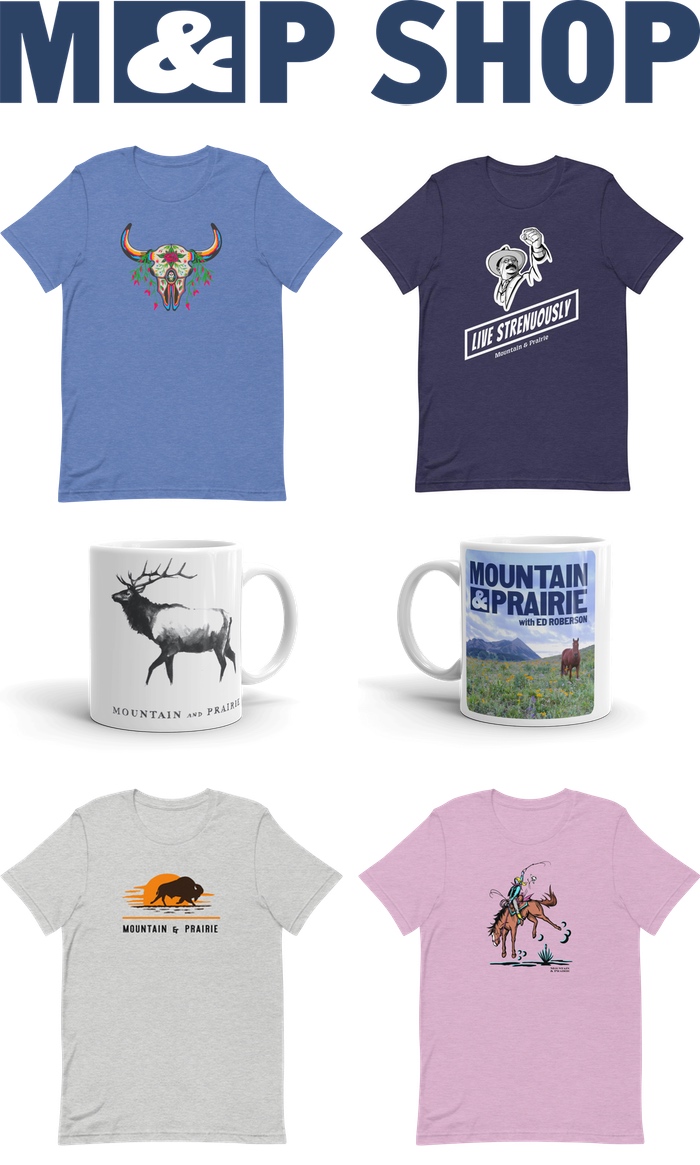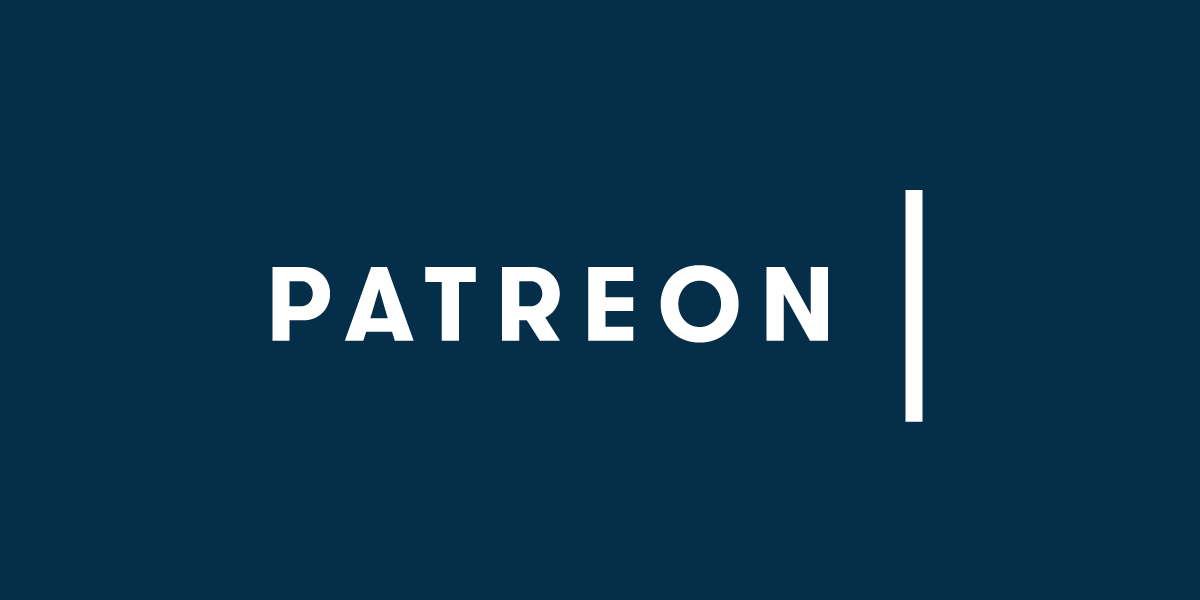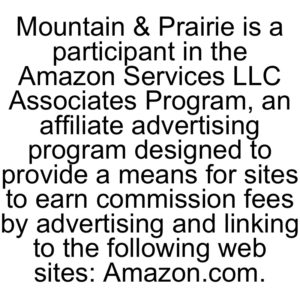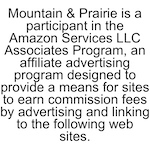VIRTUAL EVENT – In Conversation with Jim Howell
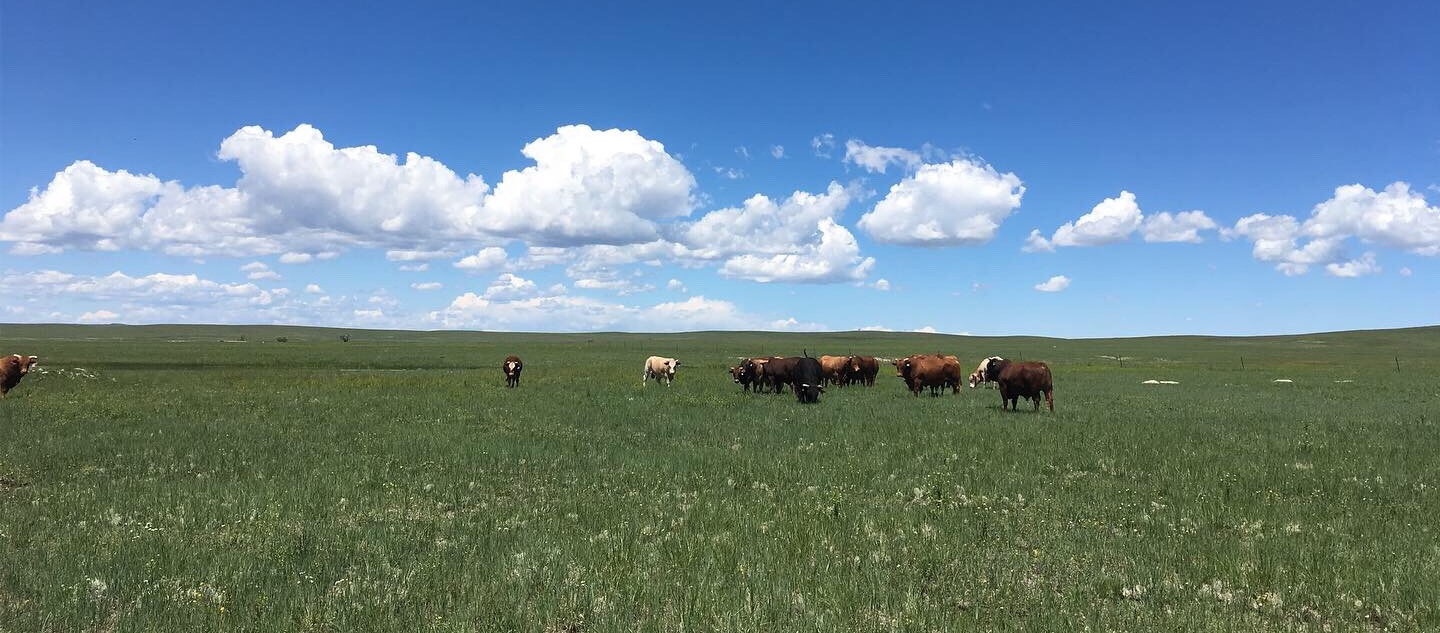
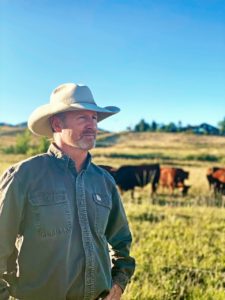
Please join me Tuesday, December 1 at 7:30 PM MST for what is sure to be a fascinating and wide-ranging video conversation with Jim Howell, CEO of Grasslands, LLC. Jim is also a past two-time podcast guest, a co-founder of the Savory Institute, author of For the Love of Land (one of my favorite books), endurance aficionado, committed family man, and all-around-great guy.
I expect a fun conversation about regenerative agriculture, Grasslands’ newest Colorado ranches, challenges and opportunities of ranching in the alpine, COVID’s effects on the cattle business, books, and hopefully lots of Q&A from the audience.
REGISTER VIA ZOOM
These Mountain & Prairie video chats are usually reserved exclusively for Patreon supporters, but I’m excited to open this one up to everyone. If you enjoy it and glean value from the conversation, I hope you’ll sign up to support the podcast via Patreon. Starting in January 2021, I’ll be hosting monthly video chats with a variety of innovators of the American West, conversations that will allow plenty of interaction from the viewers.
For the uninitiated, here are a few resources that will give you some background on Jim and his work:
Jim’s First and Second M&P episodes
For the Love of Land: Global Case Studies of Grazing in Nature’s Image by Jim Howell
See you on Tuesday night!
Mike Foote – Perfection is in the Process
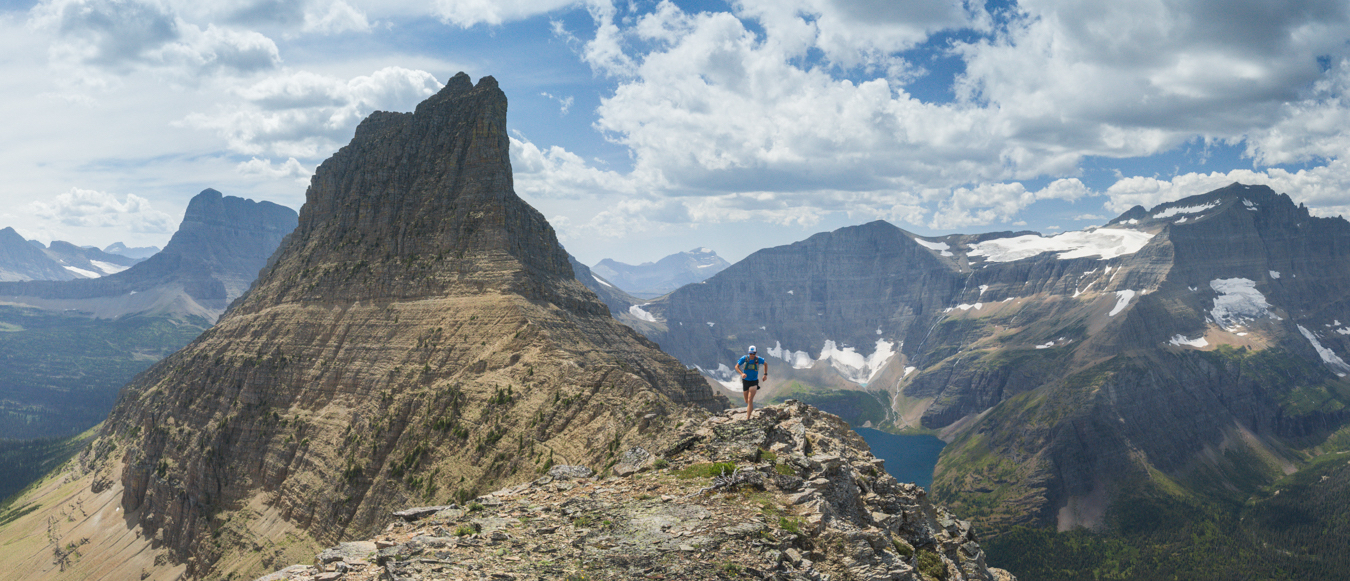
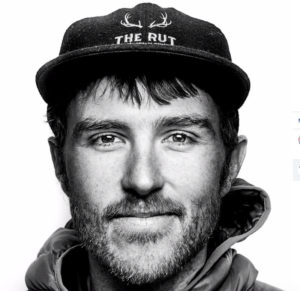
Mike Foote is a Montana-based professional ultrarunner and ski mountaineer who is best known for his inspiring performances in 100-mile ultramarathons and multiday endurance expeditions through wild landscapes. In 2018, he set the world record for the most vertical feet climbed and skied in 24 hours– a mind-blowing 61,200 feet. And in addition to his impressive athletic career, Mike is also a committed conservationist, serving on the board of directors of the Five Valleys Land Trust, an innovative conservation organization that serves the five valleys surrounding Missoula.
Mike grew up in Ohio and had never visited the American West until a life-changing college road trip took him to Moab, Utah. He instantly fell in love with the wide-open landscapes of the American West– so much so that he left college in Ohio and moved to Steamboat Springs, Colorado. During that first year in Steamboat, Mike became obsessed with the mountains– skiing, running, and enjoying all aspects of life in a Rocky Mountain ski town. Although the learning curve was steep, Mike loved every minute of his new life in the mountains, and he gradually became more and more obsessed with endurance sports. Fast forward to today, and Mike’s list of endurance accomplishments is astonishing– he’s earned podium finishes at some of the world’s most notable races, including the Hardrock, UTMB, Big Horn 100, and more.
Despite all of his world-class athletic accomplishments, Mike is an amazingly down-to-earth and humble guy. We had a wonderful conversation and managed to cover a lot in a little over an hour– topics that will be impactful to runners and nonrunners alike. We started by discussing his early years in Ohio and that fateful, life-changing trip out West. We talked about his progression in endurance sports, and his transformation from complete beginner to North Face sponsored athlete to race director of The Rut Mountain Runs. We spend a lot of time talking about mental health, and Mike graciously shares some of the techniques, books, and resources that have helped him manage the inevitable ups and downs in life and sport. We also talk about his hands-on work with the Five Valleys Land Trust, and why he has chosen to be so deeply involved in conservation. And Mike is a voracious reader, so he offers up quite a few excellent recommendations throughout the conversation.
This is an excellent episode, and I can’t thank Mike enough for being so open and thoughtful throughout the entire conversation. I hope you enjoy!
Header photo by Steven Gnam, headshot by Clayton Boyd
Download on Apple Podcasts
—
Download on Spotify
—
Download on Google Podcasts
—
Download on Overcast
—
EPISODE NOTES
Topics Discussed:
- 4:00 – Where Mike grew up
- 5:45 – What drew Mike out West
- 11:50 – What was Mike’s first year out West like
- 14:25 – When Mike first started running
- 15:45 When did Mike realize he had a talent for distance running
- 19:10 – How did Mike end up in Missoula?
- 21:20 – Mentality shift from ”just going running” (paraphrased) to professional, goal-oriented training?
- 27:35 – What drives Mike on his runs?
- 32:00 – Community of ultra-endurance events
- 35:47 – Mike getting into the race directing business
- 39:57 – How does Mike deal with the mental struggles when running.
- 46:20 – Mike’s book recommendations for setting his mind right
- 49:00 – The importance of having deep conversations about mental health
- 50:30 – Mike’s commitment to land conservation
- 59:00 – General book recommendations
- 1:02:42 – Film recommendations
- 1:06:00 – Parting words of wisdom
Information Referenced:
- Mike Foote Instagram
- Catalina Marathon
- The North Face
- Wasatch 100
- Hardrock 100
- UTMB
- VIDEO: Mike Foote breaks world record for most vertical feet skied in 24 hours
- Ben Parsons
- The Rut Mountain Runs
- Mountain & Prairie: Live in Bozeman
- Essentialism by Greg McKeown
- Tim Ferriss
- Daring Greatly, Brene Brown
- Wendell Berry
- Mary Oliver
- Hafiz
- Wherever You Go, There You Are, Jon Kabat-Zinn, PhD
- Pema Chodron
- Land Trust Alliance
- Outdoor Retailer (“OR”)
- Five Valleys Land Trust
- Collapse by Jared Diamond
- Ed’s book recommendations
- Grapes of Wrath, John Steinbeck
- East of Eden, John Steinbeck
- The Brothers K, David James Duncan
- Hamilton
Enjoy this episode? Then you might like these as well:
- Steve Casimiro – Voice of Adventure
- Chris Burkard – The Art of Suffering
- Kyle Richardson – Mountains & Music
- Juanita Vero, Part 2 – A Deep Desire to Serve
- Pete McBride – A Passion for Water & Wild Places
- Heather Hansman – Demystifying Water in the West
- Chandra Brown – Fostering Creativity Through River Adventures
- Hampton Sides – Live at the Aspen Institute
NEW WEST DISPATCH: Matt Skoglund – Ranching in the Age of COVID
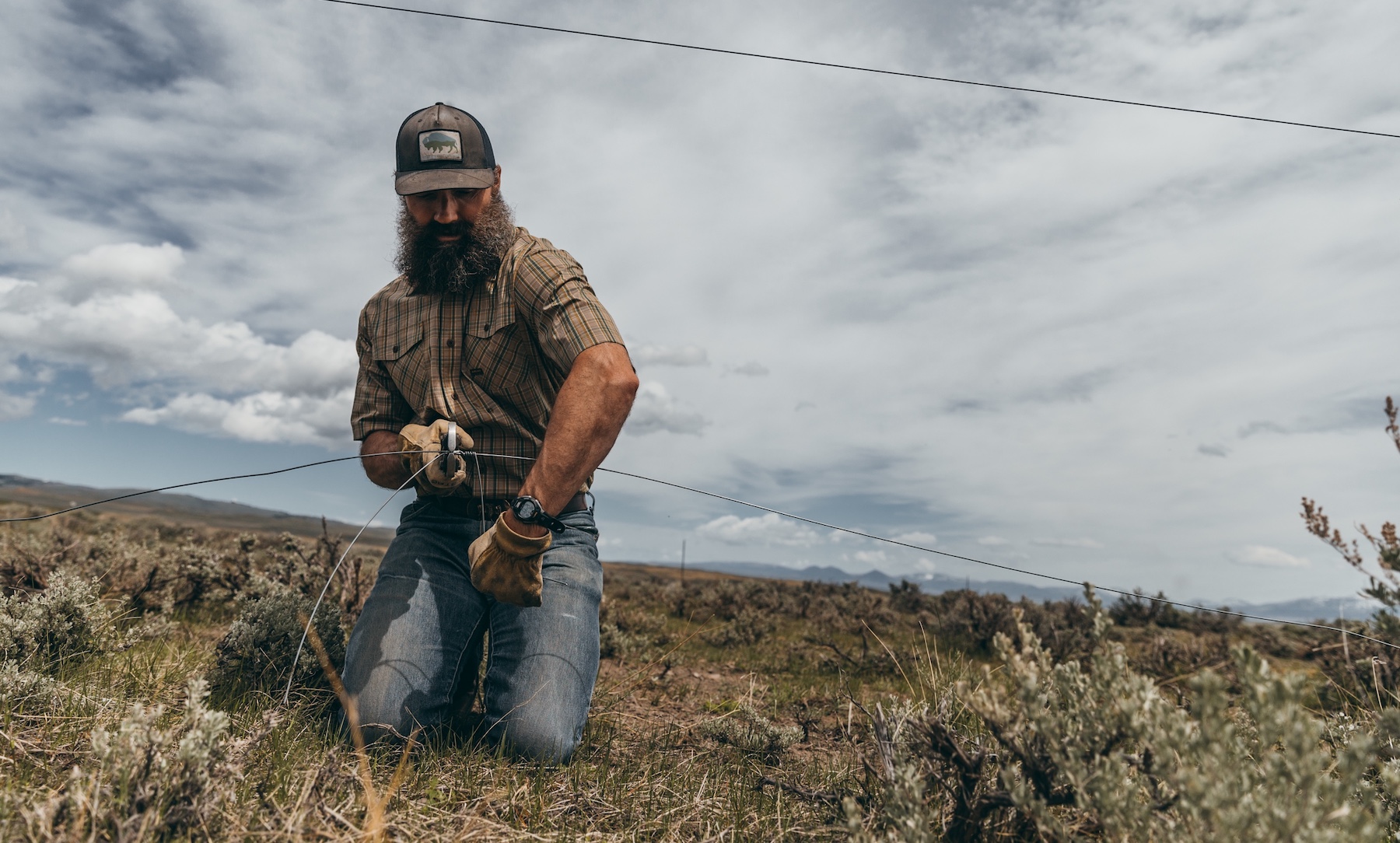
If you’ve listened to the podcast for a while, then you’re probably familiar with each episode’s general format: I have a long-form conversation with an interesting person who is doing important work in the American West. We usually spend about half of the time discussing their work and the other half discussing their personal backstory—a format that I thoroughly enjoy and seems to have struck a chord with a surprisingly large audience of listeners. The episodes are designed to be evergreen—whether you listen to them now or ten years from now, guests offer up timeless lessons you can apply to your own life.
But given our current moment in history and the public health, economic, social, and environmental challenges that have been accelerated by COVID, I’ve decided to periodically experiment with a new episode format, one that I’m calling New West Dispatches. In each New West Dispatch, I’ll speak with an expert about a very specific, current issue that is creating challenges for a specific sector of the American West. We’ll dig deep into the nitty gritty of the topic, going into more detail than usual, with the goal of gaining a better understanding of time-sensitive issues facing the West. We’ll hear firsthand stories from people on the front lines of their sectors, and discuss solutions to the problems at hand. The vast majority of Mountain & Prairie episodes will continue to follow the tried-and-true interview format, but every so often, as opportunities present themselves, I’ll look forward to getting a little more technical with Dispatches.
My guest for the first New West Dispatch is Matt Skoglund. Matt is an attorney-turned-bison rancher who joined me on the podcast last year for a fun and wide-ranging conversation about his path to founding his business North Bridger Bison. Matt came back to discuss some of the specific COVID-related challenges facing his bison business, specifically the astounding shortage of meat processing facilities throughout the American West. As you may remember, when COVID hit in March, there were endless news stories about meat shortages and breakdowns in supply chains linking producers and consumers. Although it’s not on the front page of the paper anymore, large-scale challenges persist, and Matt is in the middle of it all on a daily basis. So he was kind enough to return to the podcast to share his extensive knowledge on the subject, and to offer some potential solutions toward bolstering the food production system here in the West.
Matt covers a lot of ground in less than an hour, so be sure to check out the episode notes for a list of all the topics we discuss and links to resources. Hope you enjoy!
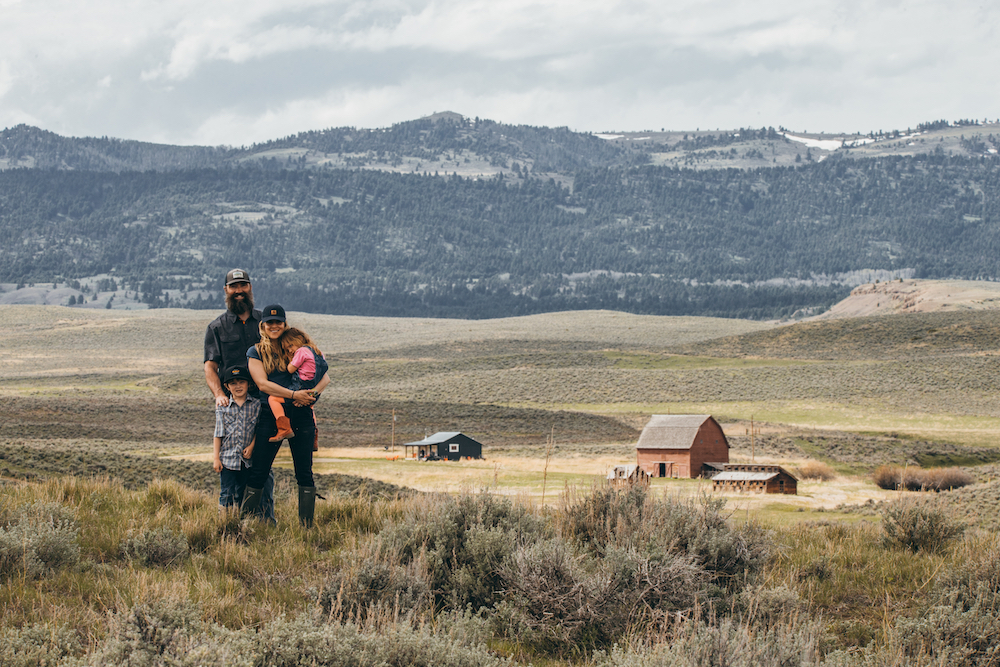
All photos by Chris Douglas for Boot Barn
Download on Apple Podcasts
—
Download on Spotify
—
Download on Google Podcasts
—
Download on Overcast
—
EPISODE NOTES
Topics Discussed:
- 4:00 – Overview of North Bridger Bison
- 8:30 – COVID’s effects on meatpacking
- 11:45 – Big outbreaks in packing plants
- 15:30 – Challenges to regenerative ag because of COVID
- 17:30 – Cause of the processing backlog
- 21:00 – Fragility of the US food system
- 23:30 – What prevents entrepreneurs from opening more processing plants?
- 26:00 – Appreciation for good meat
- 29:30 – Grazing as healing for the ecosystem
- 33:00 – Will more meat processing businesses open?
- 35:15 – Will meat processing go back to “normal” after post-COVID?
- 39:00 – Gov. Steve Bullock’s COVID relief
- 40:30 – Labor shortages
- 42:00 – The art of butchery
- 44:00 – Be intentional with impact
- 49:00 – Externalities of cheap meat
- 53:00 – Books to read about meat
- 54:30 – Productive actions to take
Information Referenced:
- North Bridger Bison
- Matt’s first Mountain & Prairie episode
- Wild Idea Buffalo
- Dan O’Brien
- Gallatin Valley Land Trust
- Natural Resources Defense Council
- COVID outbreaks at meat processing plants
- NBB Bees and Butterflies shirt
- Niche Meat Processor Assistance Network
- PRIME Act
- Governor Steve Bullock
- Miles City Community College
- The Jungle by Upton Sinclair
- Buffalo for the Broken Heart by Dan O’Brien
- Nourishment by Fred Provenza
- Kate Kavanaugh episode
- Kate Kavanaugh in the NY Times
- Ed’s “Good News” email
Enjoy this episode? Then you might like these as well:
- Duke Phillips IV – Living with the Land
- Duke Phillips III – A Vision for the New West
- Kate Kavanaugh – Regeneration & Restoration
- Daniela Ibarra-Howell – Healing the Land Holistically
- Jim Howell – Conserving and Restoring the World’s Grasslands
- Carlos Fernandez – The Power of Partnerships
VIRTUAL EVENT – In Conversation with Kate Kavanaugh
VIRTUAL EVENT – In Conversation with Kate Kavanaugh
I hope you’ll join me on Tuesday, October 27th at 7PM mountain for a wide-ranging, live video chat with my good friend Kate Kavanaugh. Kate is a farmer, entrepreneur, and regenerative agriculture advocate who co-owns and operates Western Daughters Butcher Shoppe in Denver. Since our podcast episode, she and her partner Josh purchased a farm in the northeast, where they have been living and working since early this year. Kate’s episode was one of the most popular in recent memory, so if you haven’t listened already, I’d encourage you to do so here.
Kate and I have a lot to discuss—the new farm, adjusting to life in the east, challenges around starting a farm, and how these past crazy eight months have affected everything from Kate’s outlook to the business of Western Daughters. Kate is always ready to offer up excellent book recommendations, as well as interesting ideas around nutrition and mental health. We will be devoting lots of time to Q&A, so bring your questions.
Every single time I have the pleasure of chatting with Kate, I leave the conversation inspired and educated, so I know you will too!
This event is exclusively for Mountain & Prairie Patreon supporters at the “Intense TR” ($5) level and above. To learn more about Patreon, become a patron, and access the Google Meet link for the event, click the button below:
A sincere thanks to everyone who has so generously supported the podcast through Patreon over the years– its means the world and has allowed me to expand the podcast in ways that I never thought possible!
Hope to see you on Tuesday!
Photos courtesy of Kate Kavanaugh
Juanita Vero, Part 2 – A Deep Desire to Serve
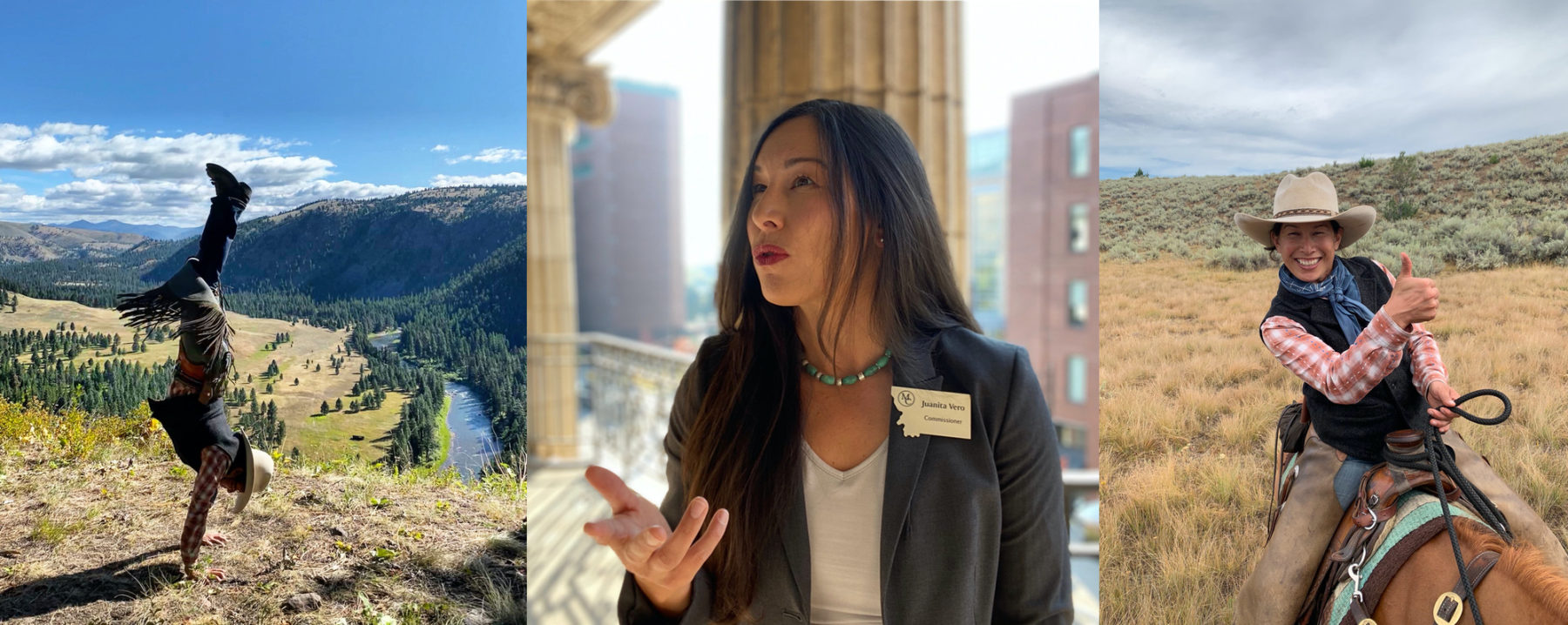
If you’re a long-time listener, then surely you remember Juanita Vero. Juanita is a fourth-generation Montana rancher, conservationist, community leader, and all-around inspiring woman. She’s also a devoted public servant, serving as a Missoula County Commissioner, where she gets her hands dirty with the critical and often not-so-glamorous work of county government. Juanita’s name will be on the ballot in Missoula County this November, where she is hoping to win a six-year term to continue her service as a Commissioner.
Juanita joined me on the podcast back in 2018, then again on stage at last year’s live podcast in Bozeman, so her personal story is probably familiar. I wanted to have her back on the show as we approach the election because her story serves as an inspiring example of how citizens can push outside of their comfort zones to lead the communities they love. As you’ll hear, Juanita had never considered assuming a public office—but when the opportunity presented itself, and she was encouraged to pursue it by fellow community leaders, she jumped at the chance. Since then, she has gone all-in and has thrived in her role as County Commissioner.
If you’re like me, you are probably overwhelmed with the negative, inflammatory news regarding politics and the upcoming election. But Juanita’s campaign and her desire to serve stands in stark contrast to much of our national discourse—she’s driven by a love of place, humility, a sense of duty, genuine curiosity, and a desire to find common ground. I think it’s important to remember that there are committed public servants in every county and city—good people who are driven not by the desire to accumulate power but by a desire to leave their communities better than they found them. Wherever you live, I hope that Juanita’s example will encourage you to engage with your local elected leaders, truly understand the candidates running for local offices, or maybe even run for office yourself. But at the least, I know you’ll enjoy listening to Juanita’s story, which will hopefully make you feel better about the world during these crazy times!
Photos courtesy of Juanita Vero
Download on Apple Podcasts
—
Download on Spotify
—
Download on Google Podcasts
—
Download on Overcast
—
EPISODE NOTES
Topics Discussed:
- 3:30 – Why and how Juanita decided to enter politics
- 9:30 – Specific experiences that let Juanita know she was ready to be a commissioner
- 13:30 – Importance of talking to her Grandfather
- 19:15 – What exactly is a county commissioner?
- 22:15 – Example of how commissioners can influence development
- 25:30 – Why she’s running for office
- 28:30 – Commissioners as true public servants
- 32:30 – COVID’s impact on Missoula County
- 34:30 – Positive effects of the “new normal” of COVID
- 36:00 – Transition from working on the land to an office job
- 39:20 – Advice for citizens who want to work productively with local government
- 42:30 – Greatest challenges and opportunities in Missoula County
- 46:15 – Smaller issues worth considering
- 48:00 – Climate change & Missoula County solutions
- 52:00 – Importance of community leadership
- 53:30 – Favorite books
- 57:15 – Favorite films
- 58:30 – Funny and surprising activities
- 59:30 – Parting words of wisdom
Information Referenced:
- Juanita Vero for Missoula County Commissioner
- Juanita Vero episodes – Part 1 and Live in Bozeman
- Missoula County
- Missoula County Commissioners
- Jim Howell episodes 1 and 2
- Will Laverack
- The Tipping Point by Malcolm Gladwell
- The Heart of Everything That Is by Bob Drury
- One Sentence Journal by Chris La Tray
- Chris La Tray episode
- Woman: An Intimate Geography by Natalie Angier
- Public Trust documentary
- Hal Herring episode
- Victor Frankl
Enjoy this episode? Then you might like these as well:
- Gabe Vasquez – Advocate for Equity in the Outdoors
- Daniela Ibarra-Howell – Healing the Land Holistically
- James Decker – Inspired Leadership in the New West
- Becca Aceto – Forging Her Own Path in the West
- Hal Herring – A Man of Words & Wild Places
- Mary Rondepierre – Melding Work, Play, and Purpose
- Jessica Lewis – Doing More With Less
Jessica Wahl Turner – Outdoor Recreation & Rural Economies
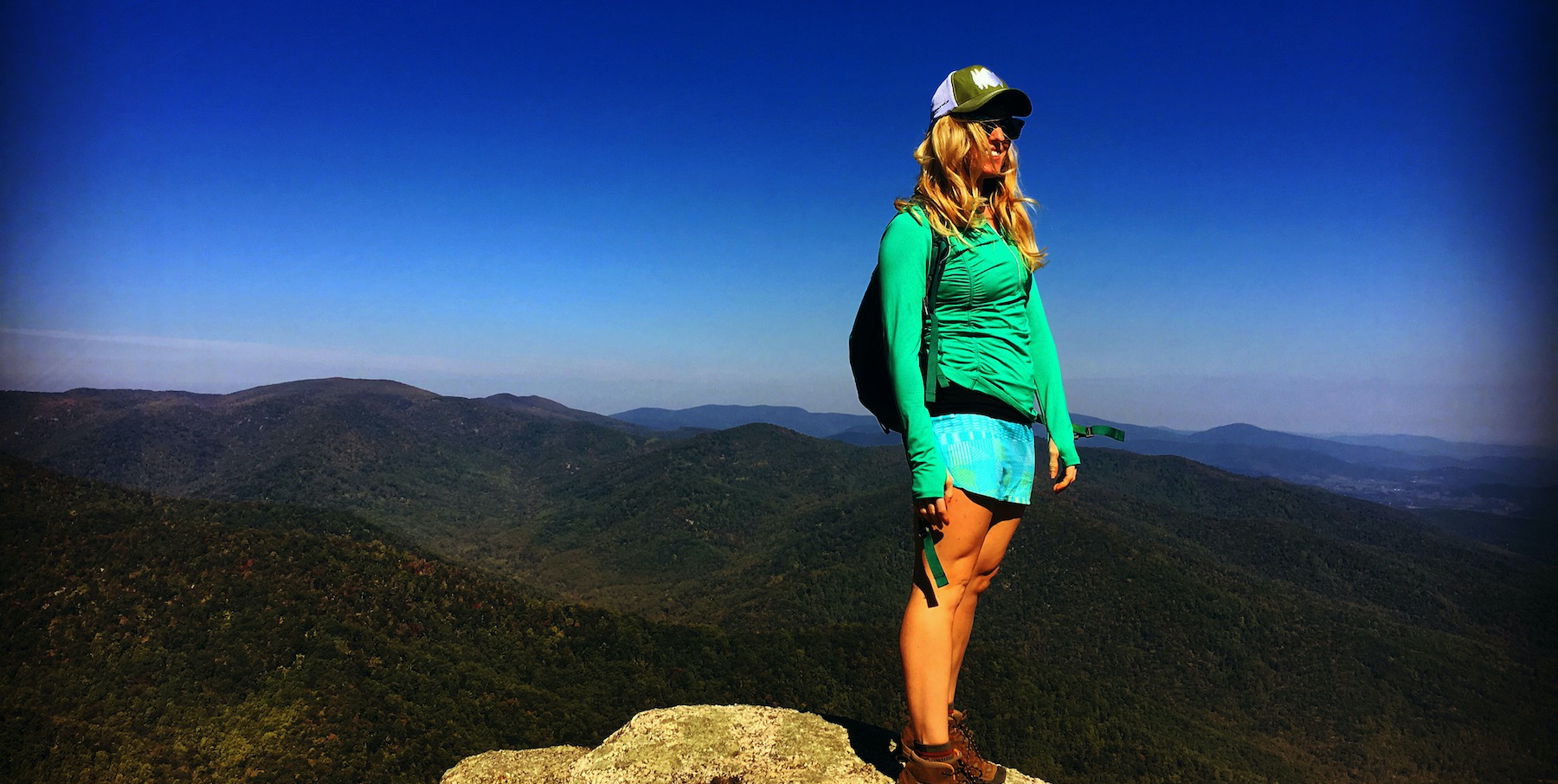
Jessica Wahl Turner is the Executive Director of the Outdoor Recreation Roundtable (ORR), America’s leading coalition of outdoor recreation trade associations and organizations. Currently, ORR is comprised of 31 national association members that serve more than 100,000 outdoor-related businesses, which is an amazing feat considering that the organization is less than three years old. Jessica and her team bring together all sectors of the outdoor economy to harness the industry’s collective power and advance issues related to conservation, outdoor access, public lands infrastructure, and much more. Whether she’s in the halls of Congress or the wide-open spaces of the American West, Jessica is a devoted, effective advocate for the outdoor industry.
This conversation is part of the Montana Governor’s Office of Outdoor Recreation’s “Business of Outdoor Recreation Summit“—a gathering of some of the most notable names in the outdoor recreation sector. Because of COVID, this year’s summit has gone virtual, but the need for collaboration and idea-sharing among industry experts has never been greater. The Outdoor Recreation Roundtable is a case study in focusing on common goals, putting aside petty differences, and overcoming challenges with new and innovative approaches. So I was thrilled to get a chance to learn exactly how Jessica has gone about leading her organization during these changing times.
Jessica and I connected on Zoom and had a fun, educational, and wide-ranging conversation about all aspects of the outdoor economy. We started by chatting about the history of ORR and precisely what the organization does. We also discussed the Great American Outdoors Act and how this landmark legislation will positively affect the outdoor industry. We talked about COVID’s effect on the outdoor economy and how ORR is working to support outdoor businesses during these unprecedented times. We also talked about how the outdoor economy contributes to rural and urban areas and how all aspects of the outdoor economy are interconnected. We also spend some time talking about Jessica’s educational and professional backgrounds, and what makes her so uniquely qualified for her current role. And as usual, we discuss favorite books, favorite outdoor adventures, and she offers some wise parting words.
This was a wonderful conversation, and I hope you enjoy. Be sure to check out the “Business of Outdoor Recreation Summit” webpage, as there are many resources, films, and other podcasts that you will find enjoyable and educational. Links to everything are in the episode notes.
Photos courtesy of Jessica Wahl Turner
Download on Apple Podcasts
—
Download on Spotify
—
Download on Google Podcasts
—
Download on Overcast
—
EPISODE NOTES
Topics Discussed:
- 3:30 – Outdoor Recreation Roundtable explained
- 8:00 – Focusing on the commonalities in the outdoor industry
- 12:00 – Impact of the Great American Outdoors Act
- 17:30 – How the upcoming election could affect the recreation economy
- 22:00 – The national interconnectedness of the outdoor economy
- 26:45 – How COVID has affected the outdoor recreation economy
- 32:00 – Balancing conservation and increased outdoor activities
- 36:30 – Future goals and measures of success for the roundtable
- 40:30 – Jessica’s education and early career
- 44:15 – Lessoned learned from the Outdoor Industry Association
- 48:45 – Advice to aspiring industry advocates/lobbyists
- 53:15 – Heroes and mentors
- 58:00 – Favorite books
- 1:01:30 – Favorite place in the outdoors
- 1:03:00 – Jessica’s parting words of wisdom
Information Referenced:
- Montana Governor’s Office of Outdoor Recreation
- Business of Outdoor Recreation Summit
- Jessica Wahl Turner on LinkedIn
- Outdoor Recreation Roundtable (ORR)
- Outdoor Industry Association (OIA)
- Patagonia
- Harley Davidson
- Great American Outdoors Act
- Land and Water Conservation Fund
- Leave No Trace
- US Department of Interior (DOI)
- US Forest Service (USFS)
- Ken Salazar
- Sally Jewell
- Anne Krcik
- The North Face
- Camber Outdoors
- New York Times
- Young Men and Fire by Norman Maclean
- Bowling Alone by Robert B Putnam
- Tribe by Sebastian Junger
- Adirondacks Park
- Adirondack 46er
- Colorado’s 14ers
- Dare to Prepare by Ronald Shapiro
Enjoy this episode? Then you might like these as well:
- Rachel VandeVoort – Harnessing the Power of Outdoor Recreation
- Gabe Vasquez – Advocate for Equity in the Outdoors
- Hal Herring – A Man of Words & Wild Places
- Chris Burkard – The Art of Suffering
- Heather Hansman – Demystifying Water in the West
- Sara Dant – A Deep Dive Into the History of the West
Steve Casimiro – Voice of Adventure
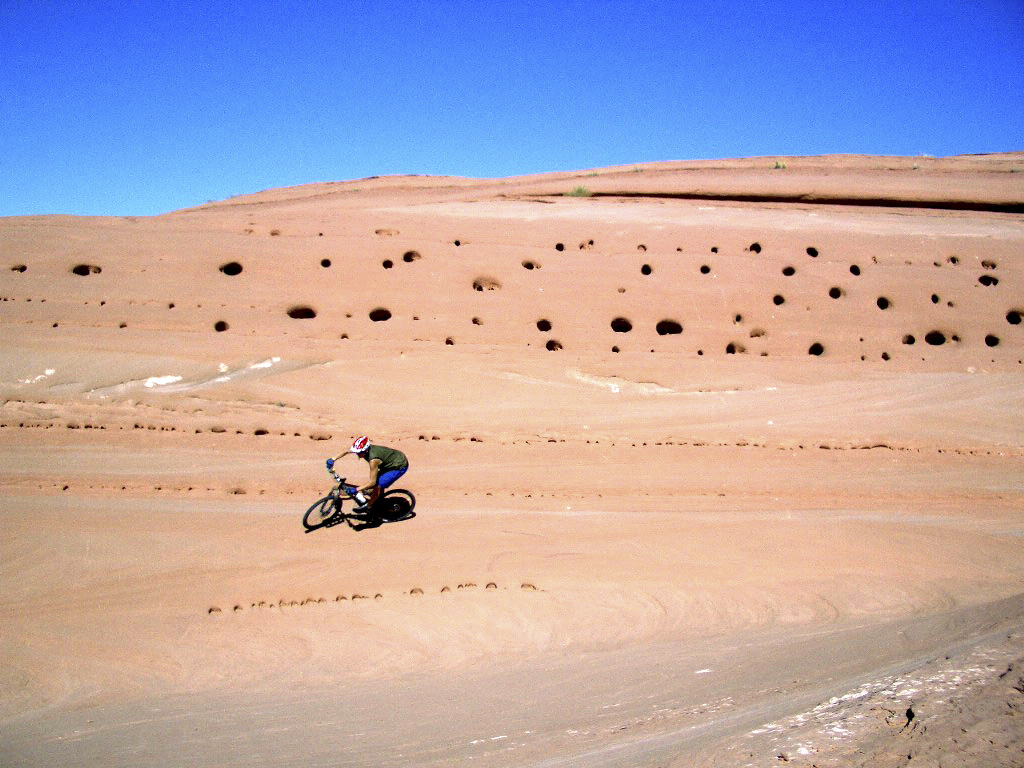
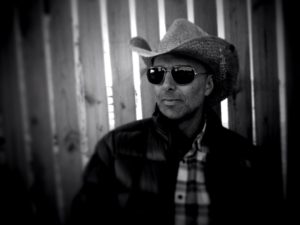
Steve Casimiro is the founder and editor of Adventure Journal, an online and quarterly print magazine devoted to outdoor adventure in all its forms. AJ began as Steve’s personal blog back in 2008—a project he created on the side while writing for National Geographic Adventure. Steve’s unique perspective and devotion to adventure writing struck a chord with the outdoor community, and AJ’s audience grew and grew. When National Geographic Adventure closed its doors, Steve decided to pursue AJ with his full professional focus, building a loyal following who is deeply devoted to AJ online and in print.
Steve grew up on the east coast, and from an early age, he was obsessed with writing, photography, and storytelling. After earning a degree in journalism, he spent his early twenties writing for traditional newspapers, including USA Today. But when presented with the opportunity to meld his passion for the outdoors with his journalism career, he left the newspaper business to join the team at the legendary ski magazine Powder. From there, Steve immersed himself in all aspects of the adventure media world, honing his craft for storytelling and dialing in his voice as a writer and editor. The culmination of these years of hard work is Adventure Journal, which is, in my opinion, one of the most essential voices in the outdoor community.
It’s no secret that I’m a massive fan of Adventure Journal. I reference it often in my weekly newsletter and suggest the quarterly print publication in my reading recommendation emails. But what I find most impressive about Steve is how he has built such a loyal community of like-minded outdoor enthusiasts—curious, thoughtful, open-minded readers who enjoy thinking deeply about the outdoors and adventure. In this conversation, Steve shares how he managed to create such a unique community and what drives him to work so hard to continue to build it. We talk about AJ’s values as a business, and we discuss his recent commitment to make AJ carbon neutral. We talk about how Steve welcomes ideas and opinions that he may not necessarily agree with, and the unique niche that AJ fills in the outdoor community. Steve also discusses how his his wife Joni, who is the AJ Art Director, has played an invaluable role in the growth of AJ. We talk about the importance of attention, the need to support independent media, what he looks for in writers, the importance of optimism, his ideas on building community, and much more.
Whether you’re a writer, photographer, business owner, community builder, or outdoor enthusiast, I can promise you that you’ll learn a lot from this conversation. And please keep an eye on my Instagram account, because I’ll be doing a giveaway of a few copies of AJ later this week. You can find a link to my Instagram Account in the episode notes.
Thanks to Steve for taking the time to join me. I hope you enjoy!
Photos by Sinuhe Xavier
Download on Apple Podcasts
—
Download on Spotify
—
Download on Google Podcasts
—
Download on Overcast
—
EPISODE NOTES
Topics Discussed:
- 4:00 – AJ’s decision to be carbon neutral
- 7:00 – Founding values of AJ
- 9:45 – Thoughts on the business decision of going carbon neutral
- 15:00 – Importance of where we focus our attention
- 20:00 – Influences on Steve’s unique approach to media and AJ
- 24:30 – AJ’s transition from personal project to full-time gig
- 26:30 – Thoughts on AJ’s tone, consistency, and content
- 30:30 – Evolution from traditional journalism to AJ
- 35:00 – Importance of doing work that is new and innovative
- 40:45 – Impactful notes and letters from AJ readers
- 41:30 – Deep feelings brought out by outdoor adventure
- 43:00 – Important example that pursuing one’s passion can set
- 46:00 – Pushing through being “stuck”
- 51:00 – Optimist or Pessimist?
- 55:45 – What Steve looks for in writers
- 1:01:30 – Importance of supporting media with your dollars
- 1:06:00 – Having high expectations of the brands you support
- 1:09:00 – Favorite books
- 1:12:00 – Parting words of wisdom
Information Referenced:
- Adventure Journal
- Subscribe to AJ
- AJ on Instagram
- Steve Casimiro
- Joni Casimiro
- AJ’s commitment to being climate neutral
- Climate Neutral certification
- The Surfer’s Journal
- Conservation Alliance
- 1% for the Planet
- Bill McKibben
- National Geographic Adventure
- Yvon Chouinard
- Let My People Go Surfing by Yvon Chouinard
- Sterling Lorence
- Powder, Bike magazines
- Steve-Brendan Leonard interview in Outside
- Brendan Leonard / Semi-Rad.com
- Chris Burkard episode
- Field Notes
- AJ Pocket Notebooks
- Craig Childs
- Terry Tempest Williams
- Peter Heller episode
- One Man’s Meat by EB White
- Peter Heller books
- The New Wilderness by Diane Cook
Enjoy this episode? Then you might like these as well:
- Peter Heller – Chasing the Flow
- Chris Burkard – The Art of Suffering
- Brendan Leonard – Grinding It Out
- Becca Skinner – Pursuing Her Passions in the West
- Hampton Sides – Live at the Aspen Institute
- Pete McBride – A Passion for Water & Wild Places
- Emilene Ostlind – Storytelling for the New West
Chris Castilian – Community, Conservation, and Colorado
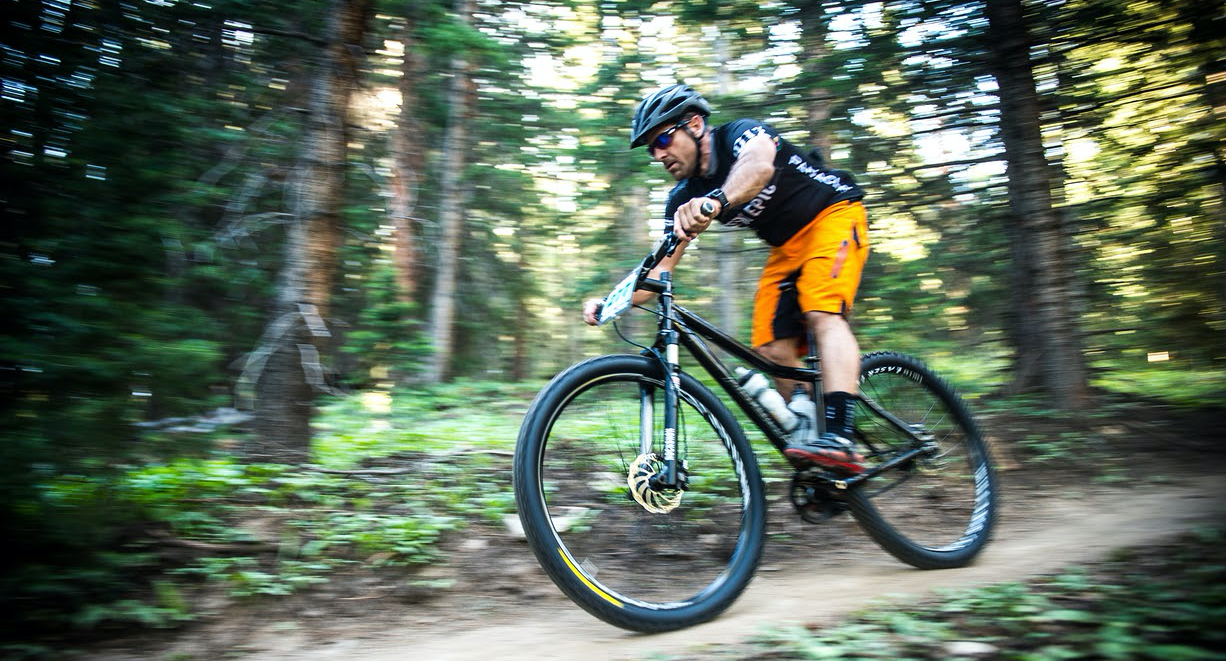
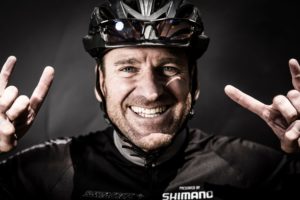
Chris Castilian is the Executive Director of Great Outdoors Colorado (also known as GOCO), an organization that has committed more than $1.2 billion toward preserving and enhancing Colorado’s parks, trails, wildlife, rivers, and open spaces. Founded in 1992, GOCO is truly a one-of-a-kind conservation funder—the organization invests a portion of Colorado Lottery proceeds into a wide variety of critical projects, with a current emphasis on issues including equitable access and community vitality. GOCO’s impact around Colorado is staggering—its funding has conserved more than 1.2 million acres, added over 47,000 acres to the state park system, protected over 1,000 miles of rivers, and much more.
Chris is a native Coloradan, and all aspects of his professional success and personal passions speak to his deep love of his home state and its wide-open spaces. Chris was formally trained as an attorney, but early is his career, he chose to focus on service rather than billing hours at a fancy law firm. He served as the Deputy Chief of Staff to Governor Bill Owens and as Director of the Colorado State Board of Land Commissioners. He also had a successful stint in the private sector, honing his business skills which have served him well at GOCO. And, as you’ll hear, his focus manifests itself in his personal life through his commitment to the outdoors and mountain biking—he’s completed the Leadville 100 mountain bike race multiple times.
Since we’re all sticking close to home these days, Chris and I connected via Skype to talk about GOCO, his career, and his thoughts on conservation in Colorado and beyond. We started with a deep dive into the history of GOCO, discussed how the organization has evolved, and talked about its goals and plans for the coming years. We also discussed how GOCO is working to address some of the current public health and social challenges here in Colorado, including equitable access to the outdoors. Chris and I spent a lot of time discussing his personal background—why he chose to pursue a service-based career, his thoughts on leadership, lessons learned from his time in the business world, and what characteristics he looks for in employees. We also discussed his love of mountain biking, the Leadville 100, our shared interest in books and history, and he offered some wise parting words to listeners.
If you care about protecting the West’s open spaces and communities, then this episode is a must listen. Enjoy!
Download on Apple Podcasts
—
Download on Spotify
—
Download on Google Podcasts
—
Download on Overcast
—
This episode is brought to you by Colorado Parks and Wildlife’s Partners in the Outdoors program. The Partners in the Outdoors program brings together diverse interests from across the entire spectrum of the outdoors to advance and balance both outdoor recreation and conservation in Colorado. The program seeks to foster alignment and trust through three cornerstone initiatives: the Partners in the Outdoors Conference, the Colorado Outdoor Partnership, and the Colorado Outdoor Principles, as well as extensive resource sharing and network building.
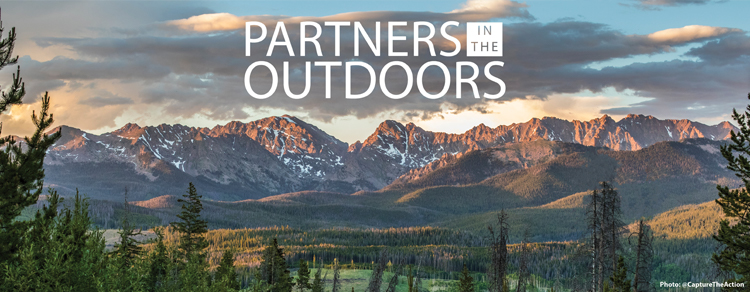
EPISODE NOTES
Topics Discussed:
- 5:00 – The history of GOCO
- 7:30 – Similar programs in other states
- 8:30 – Why conservation matters during these crazy times
- 11:15 – GOCO’s new strategic plan
- 15:30 – A new holistic approach to community and conservation
- 18:45 – The evolution of GOCO
- 21:30 – Core values of GOCO
- 24:45 – Equitable access to the outdoors
- 28:30 – GOCO’s Equity Principles
- 34:00 – Inspiring work in Leadville, Colorado
- 37:45 – Growing up in Denver
- 38:30 – Life after law school
- 40:30 – Why pursue mission-based work?
- 45:00 – Transition into the private sector
- 47:30 – Changing mindset of the oil and gas industry
- 50:00 – Benefits of having business experience
- 56:00 – What Chris looks for when hiring people
- 58:00 – Favorite books
- 1:00:45 – Mountain biking, Leadville 100, Breck Epic, and other outdoor activities
- 1:07:00 – Favorite places in Colorado
- 1:08:45 – Parting words of wisdom
Information Referenced:
- Great Outdoor Colorado
- Governor Romer
- Governor Owens
- Ken Salazar
- GOCO’s new strategic plan
- GOCO’s Values
- Dr. Nita Mosby Tyler
- Get Outdoors Leadville
- Colorado Mountain College
- Steve Farber
- Anadarko
- Russ Schnitzer episode
- Generation Wild program
- GOCO Staff
- Hampton Sides episodes 1 and 2
- Blood and Thunder by Hampton Sides
- In the Kingdom of Ice by Hampton Sides
- Nothing in the World Like It by Stephen Ambrose
- Undaunted Courage by Stephen Ambrose
- The Worst Hard Time by Timothy Egan
- The Principled Politician by Adam Schrager
- Leadville 100
- Breck Epic
- Ken Chlouber
- Gates Family Foundation
- Palmer Land Trust
- Colorado Cattlemen’s Agricultural Land Trust
Enjoy this episode? Then you might like these as well:
- Dan Prenzlow – Generous Service, Humble Leadership
- Rachel VandeVoort – Harnessing the Power of Outdoor Recreation
- Gabe Vasquez – Advocate for Equity in the Outdoors
- Rebecca Jewett, Part 2 – Conservation’s Role During Challenging Times
- Carlos Fernandez – The Power of Partnerships
- Russ Schnitzer – A Life Devoted to Western Landscapes
Anna Brones – Committed to Creativity
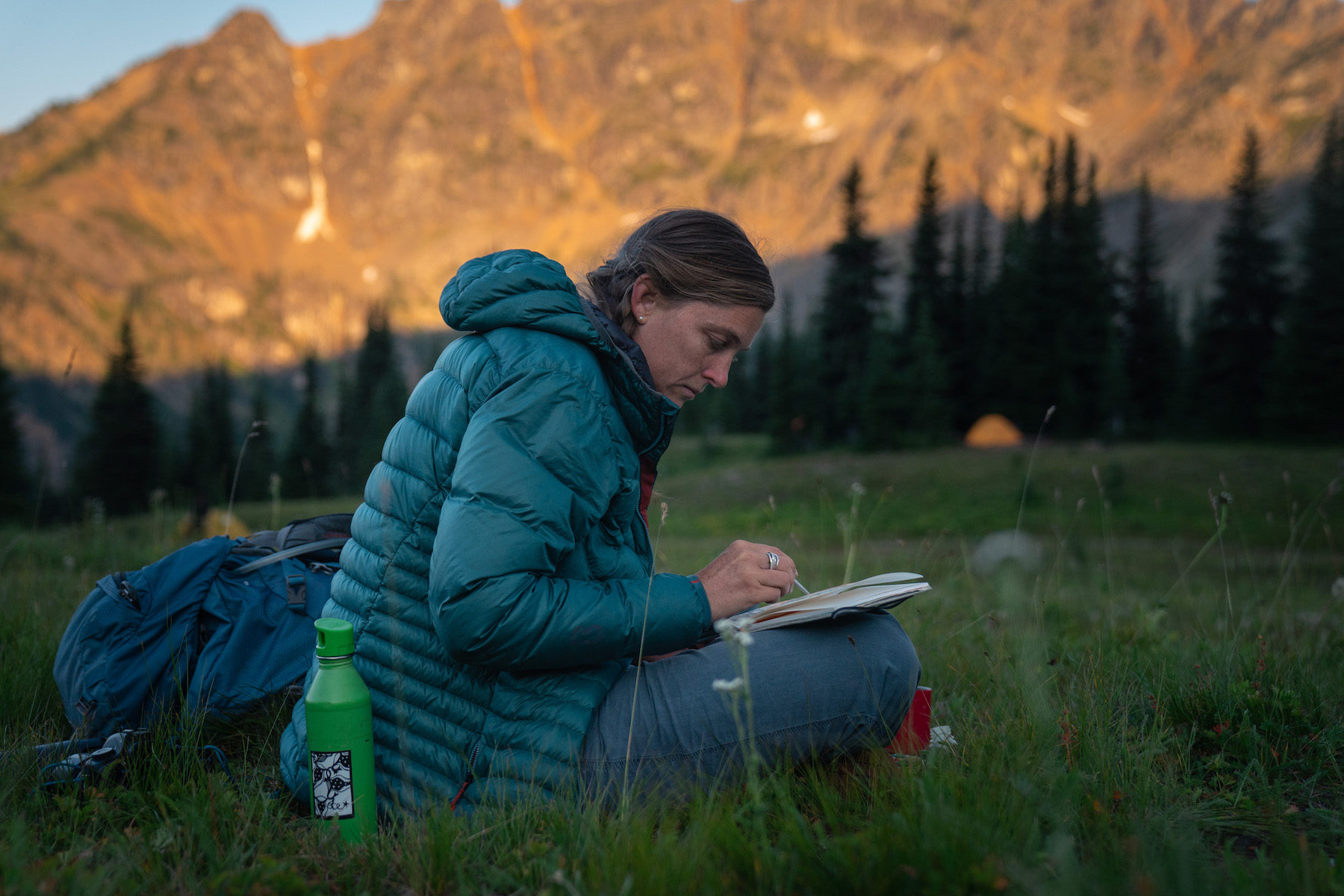
Anna Brones is a freelance journalist, author, artist, and producer who is prolific in all of her creative endeavors– she’s published four books, produced documentary films, is currently publishing a quarterly print journal about food, and much more. One of her most recent projects was the Women’s Wisdom Project, in which she showcased the wisdom of inspiring women by creating 100 papercut portraits. All of Anna’s work is authentic and enlightening, and her personal commitment to cultivating creativity is instructive and inspiring.
Growing up in the Pacific Northwest, Anna always had a deep appreciation for nature and community. She has studied, lived, and worked in many different countries and cities, but several years ago decided to return to her hometown in Washington state where she and her husband currently live. As you’ll hear in our conversation, Anna has read and thought deeply on the importance of place, and offers a unique perspective on what it means to be truly connected to a landscape or community.
Anna and I connected via Skype and had a wide-ranging conversation about her creative process, her current and past artistic projects, the importance of wilderness and nature, and much more. We started by discussing her Creative Fuel Challenge email newsletter– an amazing resource that has been very helpful to me during these past few crazy months. We also discussed her Women’s Wisdom Project–how she researched all 100 inspirational women and the process of creating 100 intricate pieces of art. Anna talked about her experience leading kids on a wilderness leadership retreat, as well as how camp and wilderness experiences in her own youth helped to shape her life and career. And as usual, we discussed favorite books and her most powerful outdoor experience, and she also offered some excellent words of wisdom for anyone with creative aspirations.
There are tons of resources mentioned in this episode. Be sure to check out the episode notes for links to everything, including a few bonus resources that Anna and I discussed before and after recording the actual episode. Enjoy!
Photo of Anna outdoors is by Julie Hotz, others courtesy of Anna Brones
Download on Apple Podcasts
—
Download on Spotify
—
Download on Google Podcasts
—
Download on Overcast
—
EPISODE NOTES
Topics Discussed:
- 3:30 – The Creative Fuel Challenge explained
- 6:30 – Why provide creative prompts?
- 7:45 – Importance of putting out regular content
- 9:30 – Time as an artist in residence
- 12:30 – Process of finding balance in life and creativity
- 15:30 – Pushing through creative blocks
- 19:00 – Fighting the reptile brain
- 20:45 – Using social media productively
- 23:45 – The Women’s Wisdom Project
- 27:45 – Process of researching women leaders
- 32:30 – The myth of having millions of ideas
- 36:00 – Anna’s early years in Washington state
- 41:00 – Importance of “place”
- 45:30 – How Anna came to appreciate the complexities of place
- 50:30 – Artists that Anna admires
- 53:30 – Anna’s experience leading wilderness trips
- 57:45 – How camp experiences benefited Anna
- 1:02:00 – Favorite books
- 1:06:30 – Most powerful outdoor experience
- 1:09:00 – Parting words of wisdom
Information Referenced:
- Anna Brones
- Creative Fuel Challenge
- Creative Fuel
- Women’s Wisdom Project
- Brendan Leonard episode
- Brendan Leonard creative prompt
- The Nature Fix by Florence Williams
- Blue Mind by Wallace J Nichols
- Wendell Berry
- Afghan Cycles
- Lisa Congdon
- Hilma af Klint
- Beyond the Visible
- The Overstory by Richard Powers
- Daily Rituals by Mason Currey
- Daily Rituals: Women at Work by Mason Currey
- How to Do Nothing by Jenny Odell
- Deep Work by Cal Newport
- The Summer Book by Tove Jansson
- IndieBound
- NOLS
- Outward Bound
- Nikki McClure
- Hannah Viano
- Wasteland
- Story of Plastic
Enjoy this episode? Then you might like these as well:
- Jillian Lukiwski – Art and Adventure in the American West
- Cate Havstad – Cultivating Creativity & Craftsmanship
- Becca Skinner – Pursuing Her Passions in the West
- Brendan Leonard – Grinding It Out
- Becky Edwards – Amplifying the Power of Women in the West
- Jessica Lewis – Doing More With Less
- Logan Maxwell Hagege – Artistic Evolution
Why Do You Read So Many Books?
Why Do You Read So Many Books?
I’m surprised by how often people ask me this question, and even more surprised by my inability to give them a concise, sensible answer. Reading has long been one of my top priorities, so it’s time that I figure out why the hell I do it.
A while back, I tried to answer the question of how I read so many books, but Why? is a much more interesting question. So here are a few thoughts on why I choose to spend an inordinate amount of time with my nose in a book. [And each thought is followed by an excellent book that I associate with each point, for one reason or another.]
- The Boring Antidote – I’m lucky to know many interesting people, and, without exception, all of them are intensely curious. The vast majority of them satiate that curiosity through reading, and most of them read a lot. The same goes for historical figures whom I admire. If imitation is the most sincere form of flattery, then these folks should feel uber-flattered—I’m trying to be a minor-league version of them. [Team of Rivals: The Political Genius of Abraham Lincoln by Doris Kearns Goodwin]
- Focus Barometer – Reading takes focus. And if I’m not reading as much as I’d like, it’s usually because I’ve lost focus in other aspects of my life. Whether it’s skipping my meditation, procrastinating, or letting down my guard with social media, a long stretch of no reading is a warning signal that something else is off. Once I identify and remedy the sloppiness, my focus improves and, whaddya know, the reading resumes. [Deep Work: Rules for Focused Success in a Distracted World by Cal Newport]
- Art of Conversation – Back when I was selling ranches, my clients would run the gamut from fancy-pants CEOs to salt-of-the-earth ranchers. And because I’d read everything from the biography of Warren Buffett to treatises on livestock grazing, I was never at a loss for substantive topics to discuss, no matter who the client was. It worked in sales; it works at parties; it works on the podcast; hell, it works whenever you want to be an engaged human being! [Raising the Bar: The Story of Clif Bar & Co. by Gary Erickson]
- Bye-Bye Shyness – Years ago, I considered myself shy, and I’m still a strong introvert. Building on the point above, I’ve found no better solution to shyness than knowing that I have an extensive source of topics to discuss with pretty much anyone. Or better yet, I can ask a cogent question to jumpstart a conversation. People love to talk about themselves, so I tee up a substantive question, and voilá! We’ve got ourselves a non-awkward, usually enjoyable conversation. [The Snowball: Warren Buffett and the Business of Life by Alice Schroeder]
- Priority Check – I’m always tempted to fall back on the trusty ol’ excuse of “I’m too busy.” Nonsense! Reading is a high priority for me—miles above social media, TV, internet news, and other electronic tomfoolery. There is ALWAYS time to read ten pages a day. If I cannot find the time, it is another blaring warning that my priorities have veered into the gutter, and I’m not using my time wisely. [Getting Things Done: The Art of Stress-Free Productivity by David Allen]
- Feel Better Today – Just as reading can be the canary in the coal mine for my focus levels, it can also be a trusted tool to maintain or enhance focus. If I catch myself mindlessly scrolling Instagram or feeling the siren call of prank videos on Youtube, 15 minutes of focused reading is usually all I need to snap out of the Zuckerberg-induced delirium. [The Craving Mind: Why We Get Hooked & How We Can Break Bad Habits by Judson Brewer]
- Feel Better Tomorrow – Almost everything I do that’s good for me is not fun in the moment. Eating well, running, meditation—for some odd reason, I dread it all. But the next day, without exception, I’m always glad that I forced myself to do whatever needed to be done. So, the idea of “tomorrow I’ll be glad I did this” drives all of my essential activities, including reading. [The Art of Taking Action: Lessons from Japanese Psychology by Gregg Krech]
- Brain Aerobics – I spend many hours per week running, lifting heavy things, and watching what I eat, all for the sole purpose of keeping my body functional and not too gross looking. But my brain is obviously much more important than my biceps, so it deserves some attention too. A few minutes of focused reading is the least I can do to keep that three-pound grey blob in decent shape. [The Art of Strategy: A Game Theorist’s Guide to Success in Business and Life by Avinash Dixit and Barry Nalebuff]
- Zoom Out – We’re living in kooky times, that’s for sure. But if there’s one takeaway from my reading of history, it’s that human kookiness is a constant. Having some perspective on just how bad things have been gives me comfort that we humans can find answers to our current problems, no matter how overwhelming they may seem in the moment. [Birth: The Surprising History of How We Are Born by Tina Cassidy]
- RESIST Nonsense – In the age of tweets, hastily written news, sensational clickbait, and inflammatory “hot takes,” reading is a refuge from all of that surface-level foolishness. Reading is my commitment to depth, my serious attempt at mindful comprehension, and my stand against the tsunami of internet bullshit. [Ten Arguments For Deleting Your Social Media Accounts Right Now by Jaron Lanier]
- Evolve – If I were to compare my 42-year-old self to my 22-year-old-self, the differences are stark. Political leanings, value systems, spiritual practices, athletic goals, philosophical frameworks, and other points of reference—by many standards, I’m a different person. This significant personal evolution is a direct result of reading curiously and voraciously. And I hope that the evolution and growth continue for many decades to come—I know that at a minimum, the reading will. [The Autobiography of Malcolm X by Malcolm X]
- Intellectual Humility – The deeper and more broadly I read, the more I realize how little I actually know. In fact, with each passing year, the ratio of “what I know” to “what I know I don’t know” skews more and more toward the “don’t know” category. It’ll be difficult for me to morph into a stuck-in-my-ways, know-it-all curmudgeon when I’m continually facing the fact that I don’t actually know a damn thing. [Surely You’re Joking Mr. Feynman: Adventures of a Curious Character by Richard Feynman]
- No Reading, No (Good) Writing – Stephen King said, “If you want to be a writer, you must do two things above all others: read a lot and write a lot.” Nowadays, we are all writers, whether we’re composing another work email or the next New York Times bestseller. I spend a large chunk of my professional time writing, and I credit any minor success I’ve had to my deep commitment to reading. [On Writing: A Memoir of the Craft by Stephen King]
- Learn Some Stuff – While I have no dreams of becoming Jeopardy’s next Ken Jennings, it’s satisfying to feel marginally informed across a broad spectrum of topics. The fact-collection aspect of reading is by far my least important reason for doing it, but I’d be lying if I claimed not to enjoy dominating a few Jeopardy categories from time to time. [A Short History of Nearly Everything by Bill Bryson]
So there you have it. Not concise, and possibly not sensible. But at a minimum, I hope these ramblings encourage you to read a few more pages than you would have otherwise.
“I am part of everything I have read.” – Theodore Roosevelt
Carlos Fernández – The Power of Partnerships
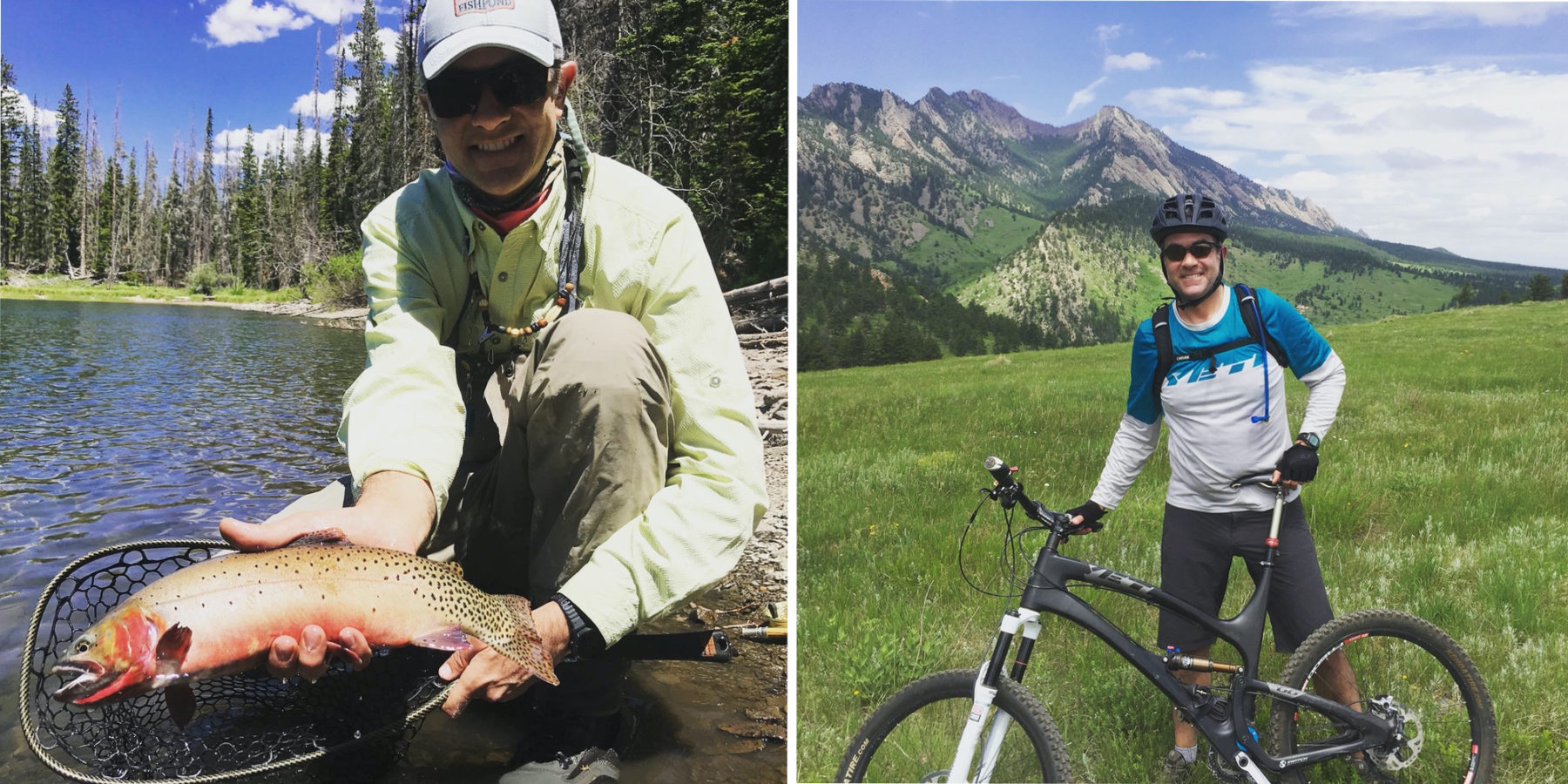
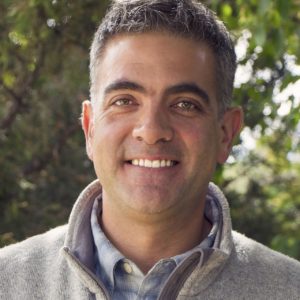
Carlos Fernández is the State Director for the Nature Conservancy in Colorado, where he and his team build alliances that advance conservation outcomes both in Colorado and around the world. Building on his formal training as an attorney, Carlos has had a long and successful career in conservation that extends far beyond the American West. He has worked extensively in his home country of Argentina, both as the Nature Conservancy’s Southern Andes Conservation Strategies Manager and as the Patagonia Program Manager. Since taking the helm in Colorado in 2015, Carlos and TNC have enjoyed many notable achievements—everything from protecting large swaths of native grasslands to helping to create Colorado’s newest state park.
Carlos grew up in Mendoza, Argentina, an agricultural region known for producing some of the world’s best beef and exceptional Malbec wine. After a childhood spent hunting and fishing along the base of the Andes Mountains, Carlos trained as an attorney and went on to practice law for large international law firms in Buenos Aires and Washington DC. Several years into his career, Carlos realized that the legal profession was not providing deep fulfillment that he needed from a job—so he made the career switch into conservation and has never looked back.
Carlos and I had a fascinating conversation that I know you’ll enjoy. We started by discussing the Nature Conservancy, and specifically what the organization does both globally and here in Colorado. We then chat about several of TNC’s recent successes, including the creation of Yampa River Fund and TNC’s critical role in acquiring and protecting the 19,200-acre Fisher’s Peak property, which will soon be Colorado’s newest state park. Carlos talks about the importance of partnerships in conservation, with other land trusts, governmental organizations, and local communities. We then discuss the future of conservation in the West and the challenges and opportunities facing the region in the next 30 years. Carlos and I both have five-year-old daughters, so we talk a bit about fatherhood and the outdoors’ role in raising children. And as usual, we discuss favorite books, films, his favorite places in Colorado, and he offers some actionable words of wisdom.
This is an excellent episode, full of optimism, inspiration, and educational resources. Be sure to check out the episode notes for links to everything we discuss. Enjoy!
Download on Apple Podcasts
—
Download on Spotify
—
Download on Google Podcasts
—
Download on Stitcher
—
This episode is brought to you by Colorado Parks and Wildlife’s Partners in the Outdoors program. The Partners in the Outdoors program brings together diverse interests from across the entire spectrum of the outdoors to advance and balance both outdoor recreation and conservation in Colorado. The program seeks to foster alignment and trust through three cornerstone initiatives: the Partners in the Outdoors Conference, the Colorado Outdoor Partnership, and the Colorado Outdoor Principles, as well as extensive resource sharing and network building.

EPISODE NOTES
Topics Discussed:
- 5:00 – The Nature Conservancy explained
- 9:30 – TNC’s mission in Colorado
- 10:30 – Yampa River Fund explained
- 16:30 – Importance of community in conservation
- 19:30 – Fishers Peak State Park
- 26:00 – TNC and equitable access to the outdoors
- 28:30 – The importance of partnerships
- 30:45 – Civic duty of partnerships
- 32:00 – Colorado Outdoor Partnerships
- 35:00 – Early years in Mendoza, Argentina
- 38:00 – Transitioning from corporate law into conservation
- 41:30 – Moving to Colorado
- 42:30 – Carlos’s unique professional background
- 46:00 – Conservation in the time of COVID
- 48:45 – Heroes and mentors
- 52:00 – Advice for people transitioning from the private sector into non-profits
- 55:30 – Envisioning the future of conservation
- 59:30 – Favorite books
- 1:04:00 – Favorite films
- 1:05:45 – Carlos’s favorite outdoor activities
- 1:07:00 – Rediscovering the outdoors through your kids’ eyes
- 1:08:00 – Favorite location in the West
- 1:10:30 – Parting words of wisdom
Information Referenced:
- Carlos Fernandez
- The Nature Conservancy
- Sydney Macy
- Ken Salazar
- Great Outdoors Colorado (GOCO)
- Great Sand Dunes National Park
- TNC 13ers Young Professionals Group
- Yampa River Fund in the news
- The Carpenter Ranch
- Big Agnes
- Fishers Peak project
- Trust for Public Land
- Governor Jared Polis
- Gabe Vasquez episode
- Keep it Colorado
- Rebecca Jewett episode
- Colorado Outdoor Partnership
- SHIFT
- Mendoza, Argentina
- Gandhi: An Autobiography
- Governor Bill Ritter
- Ed’s book recommendations email
- Where the Water Goes by David Owen
- Cadillac Desert by Marc Reisner
- The Emerald Mile by Kevin Fedarko
- Team of Teams by Stanley McChrystal
- The Future We Choose by Christiana Figueres
- Designing Climate Solutions by Hal Harvey
- Essentialism by Greg McKeown
- Planet Earth II
- Delta Dawn by Pete McBride
- Pete McBride episode
Enjoy this episode? Then you might like these as well:
- Rebecca Jewett, Part 2 – Conservation’s Role During Challenging Times
- Daniela Ibarra-Howell – Healing the Land Holistically
- Emilene Ostlind – Storytelling for the New West
- Heather Hansman – Demystifying Water in the West
- Russ Schnitzer – A Life Devoted to Western Landscapes
- Alexis Bonogofsky – Taking a Stand for the West
David Gessner, Part 3 – A Confluence of Conservation Ideals
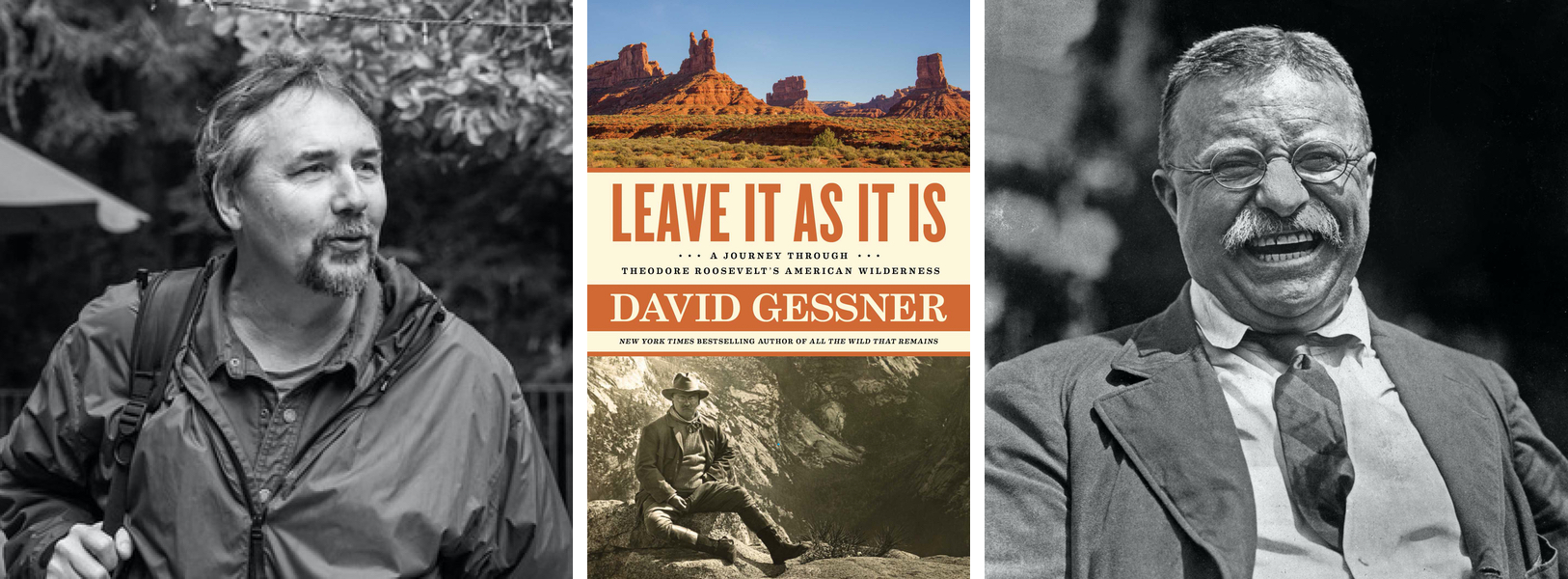
David Gessner is back for his third appearance on the podcast, and this time we are discussing his brand new book Leave It As It Is: A Journey Through Theodore Roosevelt’s American Wilderness. Most long-time listeners will remember David’s past two episodes– we discussed everything from Edward Abbey and Wallace Stegner to his daily writing rituals and his hand-built coastal writing shack. If you haven’t listened to those first two episodes, I encourage you to do so—they are chock-full of wisdom, good humor, and inspiration to fight to conserve the places you love. But first, take a listen to this episode, as it offers some timely insights into this current moment in history.
In this episode, we spend the full hour discussing his new book and digging into the good, the bad, and the ugly of Theodore Roosevelt’s legacy. As many of your know, I’ve read way-too-many TR books, and Leave It As It Is offers the most balanced, clear-eyed examination of the man that I’ve read to date. It’s not a strict biography or historical examination of TR, although there’s plenty of both within the pages. Rather, it’s David’s search to capture the best of TR’s conservation ethos, to discard the worst, and to use the balance to build a new, holistic model for conservation and environmental justice. David melds together a “confluence of ideals” that acknowledges the wrongs of the past and sets an equitable, sustainable course for the future. During this time when we are rightfully reexamining many of our country’s revered historical figures, Leave It As It Is provides a valuable, well-timed deep dive into the complexities of TR and his influence on conservation in the United States.
Although an hour-long interview is no substitute for reading the book, I believe that this conversation will give you a good taste of the fresh and unique perspective that David brings to the well-worn subject of Theodore Roosevelt. We start by discussing the relevance of studying TR now, in the midst of a global pandemic, economic crisis, and social turmoil. David also explains the series of events that led him to begin writing this book, a multi-year project that took him from Bears Ears to Yosemite with many stops in between. We talk in-depth about TR’s unacceptable views and treatment of Native Americans, some of the hypocrisies that defined TR’s life, and why David chose to stare these uncomfortable facts in the eye rather than just make excuses, as many biographers do. David discusses how TR’s idea of the Strenuous Life has helped define his own life, and how writing this book has encouraged David to become more of an activist for specific causes. We also talk about the removal of the TR statue in New York, the idea of the Confluence of Ideals, and David offers up a long list of further reading on TR.
I loved every minute of this conversation, and I highly encourage you to read Leave It As It Is. It’s an important book that is perfect for this important time in history. Hope you enjoy!
Download on Apple Podcasts
—
Download on Spotify
—
Download on Google Podcasts
—
Download on Stitcher
—
EPISODE NOTES
Topics Discussed:
- 5:00 – What is the value of studying TR during this moment in history?
- 9:00 – The Antiquities Act explained
- 12:30 – Why read biography?
- 14:00 – TR’s attitude toward Native Americans
- 17:00 – Importance of open conversation and hypocrisy
- 18:30 – “Walking the ridge”
- 20:00 – David’s “What would Teddy do?” list
- 21:00 – Why David had to write this specific book
- 27:00 – “Confluence of Ideals”
- 32:00 – Importance of living strenuously
- 33:30 – Combining books and adventure
- 37:30 – Focused action
- 39:30 – Morris and McCullagh’s TR work
- 41:30 – Thoughts on the removal of the NYC TR statue
- 46:00 – TR as an effective, energetic liberal
- 49:30 – Backstory on the title “Leave It As It Is”
- 52:30 – Who wins in a TR vs. Trump fight?
- 55:00 – How did writing this book change David?
- 58:00 – Activists that David admires
- 59:30 – Additional recommended books on TR
Information Referenced:
- Leave It As It Is: A Journey Through Theodore Roosevelt’s American Wilderness by David Gessner
- David Gessner
- All of David’s previous books
- David’s First and Second Mountain & Prairie episodes
- Washington Post John Muir article
- Red Rock Testimony book
- Edmund Morris
- Brad Watson
- Brad Watson obituary, written by David
- Bob Richardson
- John Muir
- Removal of the TR statue
- Pulling Down Our Monuments by Jason Mark
- Sunrise Movement
- Bill McKibben
- Rick Bass
- The Rise of Theodore Roosevelt by Edmund Morris
- Mornings on Horseback by David McCullough
- Theodore Roosevelt: A Strenuous Life by Kathleen Dalton
- The Crowded Hour by Clay Risen
- TR: Preacher of Righteousness by Joshua David Holly
- Red Rock Stories edited by Stephanie Trimble
- Edge of Morning edited by Jacqueline Keeler
- Ceremony by Lesley Silco
- The Western Paradox by Bernard DeVoto
- House Made of Dawn by Scott Momaday
- Beyond the Hundredth Meridian by Wallace Stegner
- The Professor’s House by Willa
- Books by Theodore Roosevelt
Enjoy this episode? Then you might like these as well:
- Sara Dant – A Deep Dive Into the History of the West
- Hampton Sides – Live at the Aspen Institute
- Brian Calvert – In-Depth Journalism in the New West
- Russ Schnitzer – A Life Devoted to Western Landscapes
- Heather Hansman – Demystifying Water in the West
- Mark Kenyon – A Passion for Public Lands
- Gabe Vasquez – Advocate for Equity in the Outdoors
Becky Edwards – Amplifying the Power of Women in the West
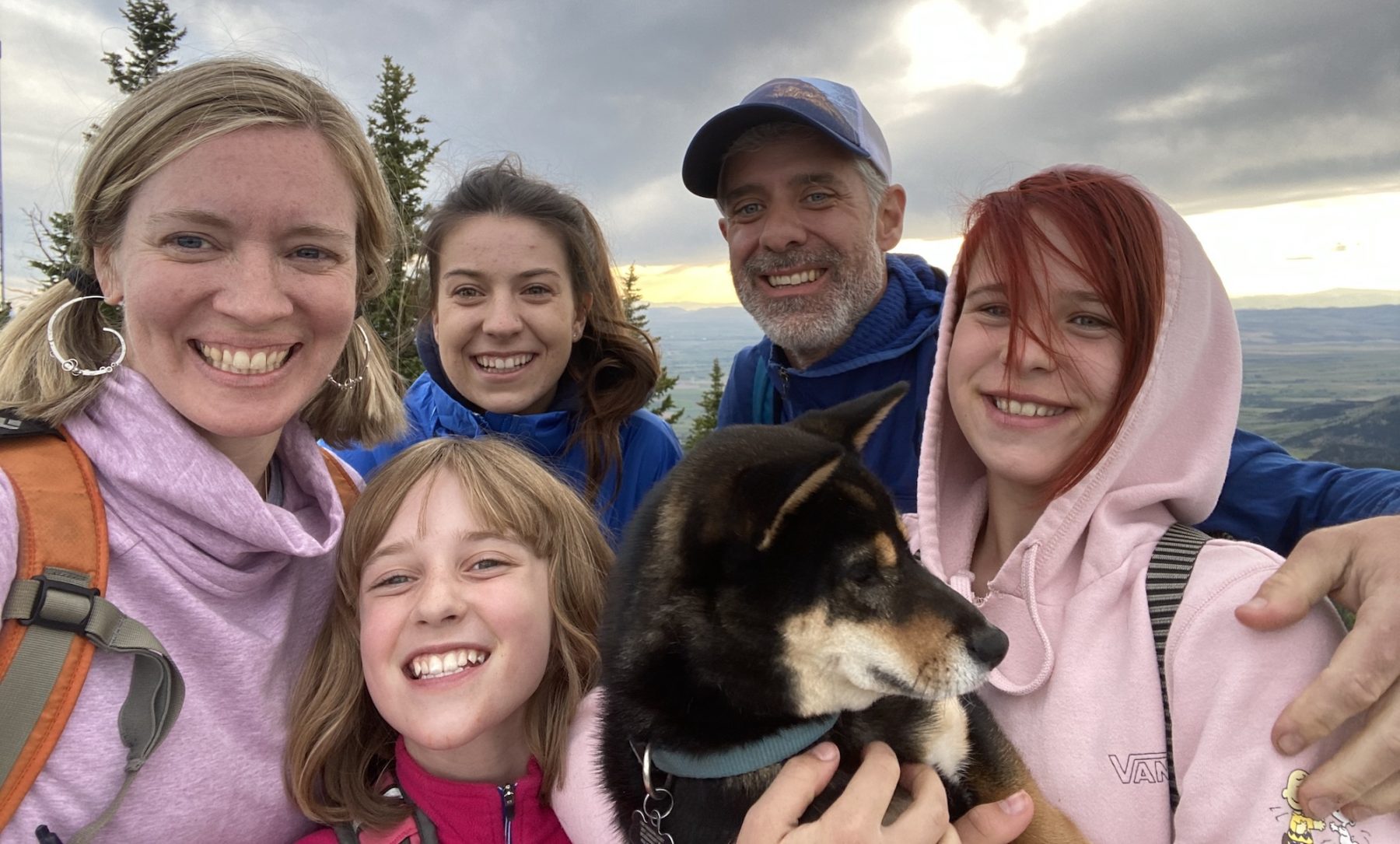
Becky Edwards is the Executive Director of the Mountain Mamas, an organization whose mission is to amplify women’s voices into a movement to ensure that kids grow up in a healthy climate with clean air and access to public lands. Operating out of both Montana and Colorado—and currently expanding throughout the West—the Mountain Mamas harness the power of mothers to advocate to solve some of the West’s most pressing conservation and environmental challenges. Whether helping to garner support for the recently passed Great American Outdoors Act or fighting for clean water in our Rocky Mountain rivers, the Mountain Mamas have become a formidable force for good in the West.
Becky grew up in Iowa but moved West to pursue her passion for climbing and mountaineering. After many years of being single-mindedly focused on life in the big mountains, her priorities drastically shifted with her daughter’s birth. No longer was she focused on big accents, but instead on making the world a better place for her little girl. And it’s worth noting that Becky’s early years of motherhood were no walk in the park—she spent many years as a single mother while simultaneously starting several successful businesses as well as the Mountain Mamas. But despite all of the challenges, Becky never gave up and built an impactful movement that is spreading across the West.
We caught up via Skype the day after the House of Representatives passed the Great American Outdoors Act, so we started out talking about that victory and its impacts on conservation and recreation. Becky is very gifted at explaining complicated legislative jargon, so she graciously and entertainingly walks me through many of the details around the Land and Water Conservation Fund, the importance of its permanent funding, and more. We discuss the importance of advocacy work with elected officials, and she offers up practical advice for anyone who wants to become more involved in guiding their elected officials on important issues. We also discuss her journey as a mother, as well as her journey as a woman in the conservation sector. Finally, we talk about the need for more diversity in conservation, and why now is a wonderful opportunity for positive change.
This was such a fun conversation—I think you’ll find it equal parts educational, inspiring, and empowering. Hope you enjoy.
Photos courtesy of Becky Edwards
Download on Apple Podcasts
—
Download on Spotify
—
Download on Google Podcasts
—
Download on Stitcher
—
EPISODE NOTES
Topics Discussed:
- 5:00 – Mountain Mamas explained
- 6:00 – Background of the organization
- 9:30 – Land and Water Conservation Fund explained
- 13:00 – What does “fully funding” the LWCF mean?
- 17:00 – Ability of groups to do conservation rather than fight for $$
- 19:00 – Importance of advocacy and discussions with Congress
- 23:45 – Practical tips for advocating for your cause
- 27:00 – The vital role of the outdoors during Covid
- 29:30 – Importance of “finding the area of commonality”
- 32:00 – Transitioning the Mamas into advocacy work
- 37:00 – Becky’s journey as a mother
- 42:30 – Decision to start a business while being a single mother
- 47:00 – The driving force behind Becky’s career
- 50:00 – Importance of storytelling
- 53:30 – Need for increased diversity and inclusion in conservation
- 58:00 – Opportunities that will arise from this moment in history
- 59:30 – Heroes
- 1:01:30 – Favorite books
- 1:03:30 – Favorite films
- 1:06:00 – Parting words of wisdom
Information Referenced:
- Becky Edwards
- Mountain Mamas
- Mountain Mamas on Instagram
- Great American Outdoors Act
- Land and Water Conservation Fund
- Conservation Easements
- John Dingell Act
- Blackfoot Clearwater Stewardship Act
- Sapiens by Yuval Noah Hurari
- Sally Jewell
- Senator Jon Tester
- Winnie the Poo by AA Milne
- Charlotte’s Web by EB White
- Travels with Charley by John Steinbeck
- East of Eden by John Steinbeck
- Some Kind of Courage by Dan Gameinhart
- Brendan Leonard episode
- How to Run 100 Miles film
- Run Rabbit Run 100 miler
Enjoy this episode? Then you might like these as well:
- Juanita Vero – A Deep Love of Place
- Becca Skinner – Pursuing Her Passions in the West
- Gabe Vasquez – Advocate for Equity in the Outdoors
- Kate Kavanaugh – Regeneration & Restoration
- Live in Bozeman – Cate Havstad, Jillian Lukiwski, Becca Skinner & Juanita Vero
- Jessica Lewis – Doing More With Less
- Auden Schendler – The Optimistic Pragmatist
- Emilene Ostlind – Storytelling for the New West
Ivan McClellan – A New Look at the Old West
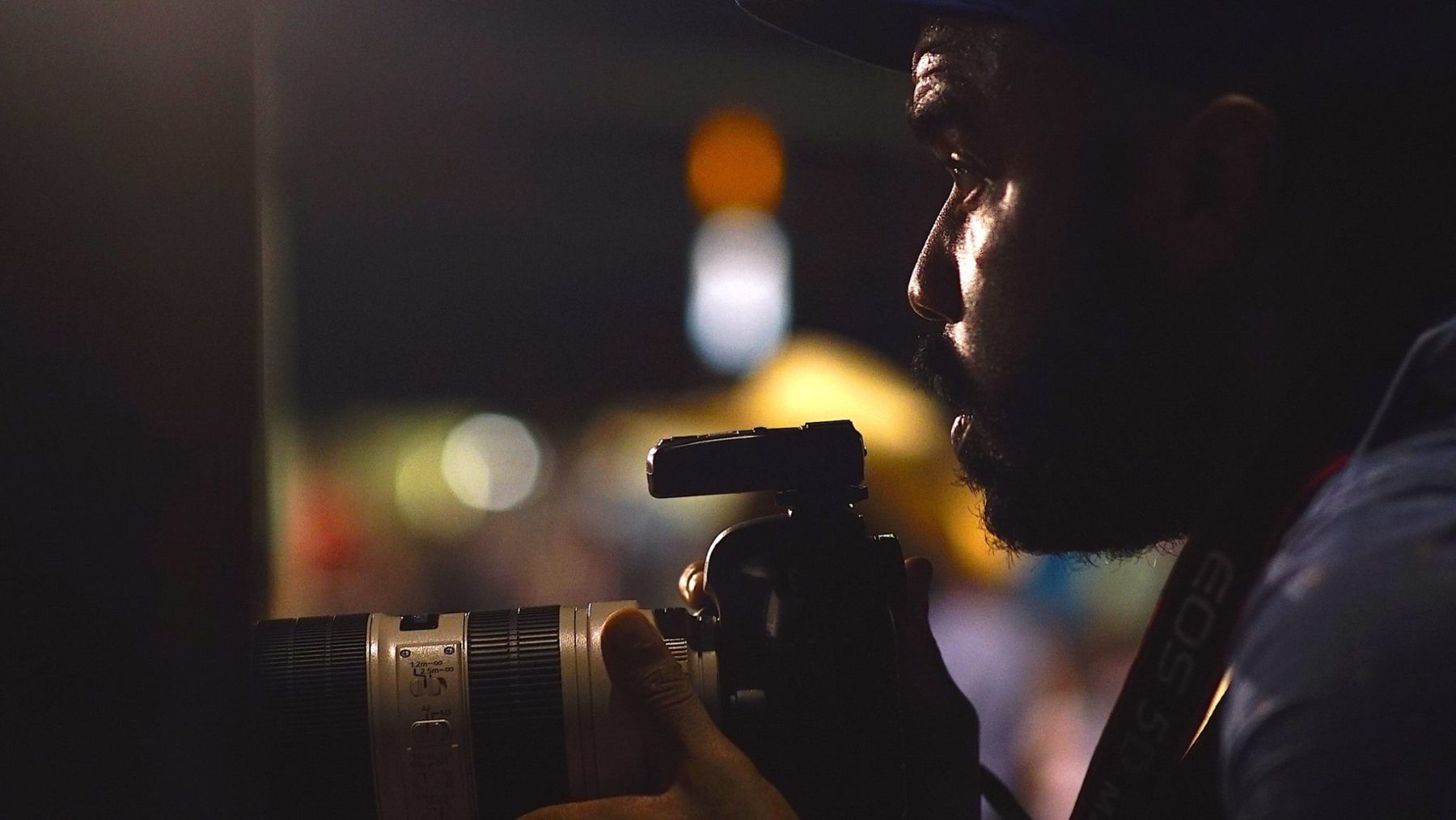
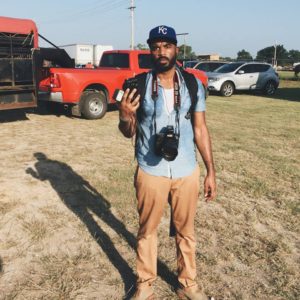
(Photo credit: The Black Cowboy)
Ivan McClellan is a professional photographer and the creator of the Eight Seconds Project, a storytelling project with the goal of extending the cowboy icon to include people of color. Ivan started the project back in 2015, after a series of chance encounters led him to an all-black rodeo in Oklahoma. Over the course of photographing the event, he became enamored with the black cowboy way of life and obsessed with documenting this unique subculture. In the years since, the Eight Seconds Project has garnered the attention of iconic western brands such as Stetson and Wrangler, and Ivan’s work has helped to tell the story of black cowboys to a nationwide, mainstream audience.
A Kansas City native, Ivan grew up in a tough neighborhood were gangs and violence were the norm. Just after high school, he headed east to New York City, where he studied and worked in the arts for many years. A career transition into the advertising business led him to Portland, where he currently lives with his wife and two children. Ivan juggles many commitments—family, a career in advertising, and his photography projects—but through hard work, mindfulness, and obsession, he somehow manages to keep all the balls in the air and continues to evolve as an artist and storyteller.
Ivan and I connected via the internet for a wide-ranging and enlightening conversation. We started out talking about the genesis of the Eight Seconds Project and how a random conversation at a party started the entire project. We talk about Black Cowboy culture, how he came to learn about the community’s deep roots and its ties to the history of the United States and the West. Ivan shares some thoughts on the importance of having creative control over projects, and how hard work, year after year, allowed him to find his true voice as a storyteller. We also chat about mindfulness and how mindfulness practice has improved Ivan’s life and creative output. As usual, we discuss favorite books, films, and Ivan offers some timely words of wisdom.
I loved this conversation, and I felt like it got better and better with each minute. Be sure to check out the episode notes for all of the subjects we covered and links to everything discussed. Hope you enjoy!
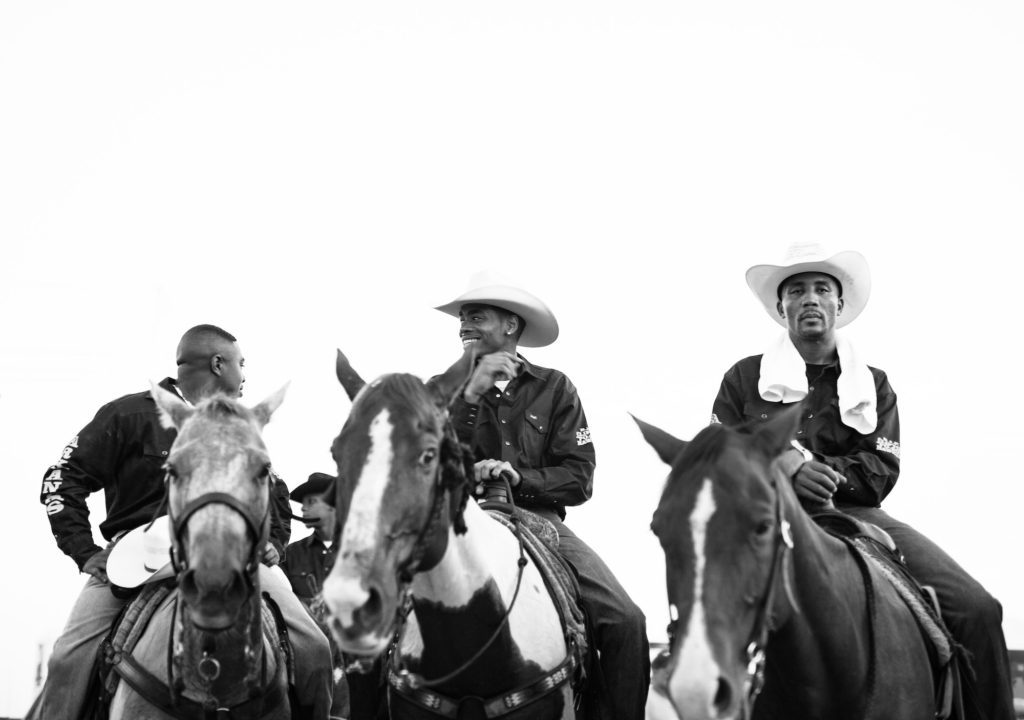
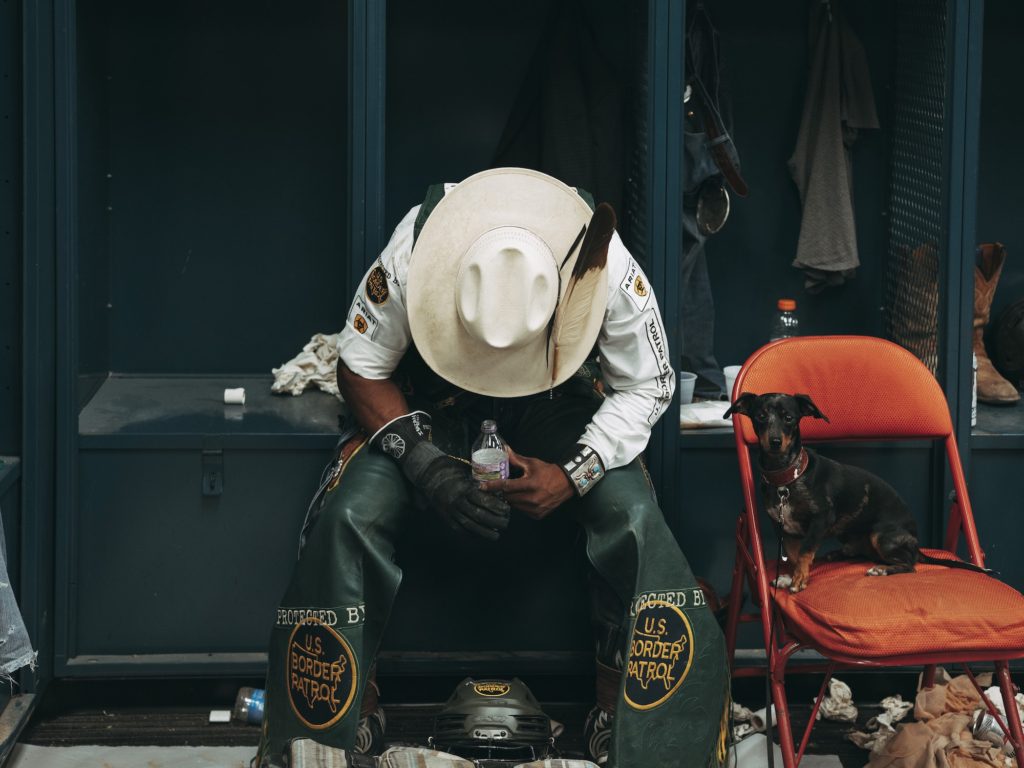

Rodeo photos by Ivan McClennan; photos of Ivan courtesy of The Black Cowboy
Download on Apple Podcasts
—
Download on Spotify
—
Download on Google Podcasts
—
Download on Stitcher
—
EPISODE NOTES
Topics Discussed:
- 4:30 – Background of the Eight Second Project
- 7:00 – Ivan’s first black rodeo in Oklahoma
- 9:30 – Publishing his first black rodeo images
- 11:00 – Working with big brands
- 15:00 – Ivan’s decision to self-fund the Eight Seconds Project
- 16:30 – Treating photography as sacred
- 18:30 – The long road toward creative freedom
- 23:00 – Ability to pivot into other creative niches
- 25:00 – Process of becoming a pro photographer
- 27:30 – Ivan describes his work and process
- 32:00 – History of Black Rodeo in Oklahoma
- 35:00 – Why more black riders aren’t in the PBR
- 39:00 – Shifting into a more equitable “new normal” in rodeo
- 41:00 – Dealing with the frustration of shifting perspectives
- 43:30 – Growing up in Kansas City
- 45:00 – Discovering the need for mindfulness
- 47:30 – Family’s role in mindfulness
- 49:00 – Details on Ivan’s meditation practice
- 52:00 – Mindfulness’s effects on Ivan’s creativity
- 56:00 – Lessons learned from rodeo riders
- 59:00 – Favorite books
- 1:00:30 – Favorite films
- 1:02:30 – Craziest thing Ivan’s every seen at a rodeo
- 1:04:30 – Parting words of wisdom
Information Referenced:
- Ivan on Instagram
- Eight Seconds Project
- Ivan’s Stetson story
- Stetson
- Bill Cunningham
- Bill Cunningham documentary
- Professional Bull Riding (PBR)
- Heath Herring
- Sticky Haynes
- Bill Pickett
- Death Magick Abundance by Akasha Rabut
- Unforgiven
- Bull
- Ezekiel Mitchell
- Keyshawn Whitehorse
Enjoy this episode? Then you might like these as well:
- Gabe Vasquez – Advocate for Equity in the Outdoors
- Daniela Ibarra-Howell – Healing the Land Holistically
- Duke Phillips IV – Living with the Land
- Sara Dant – A Deep Dive Into the History of the West
- Logan Maxwell Hagege – Artistic Evolution
- Pete McBride – A Passion for Water & Wild Places
- Mark Maggiori – A Fresh View of the American West

Good News from the American West!
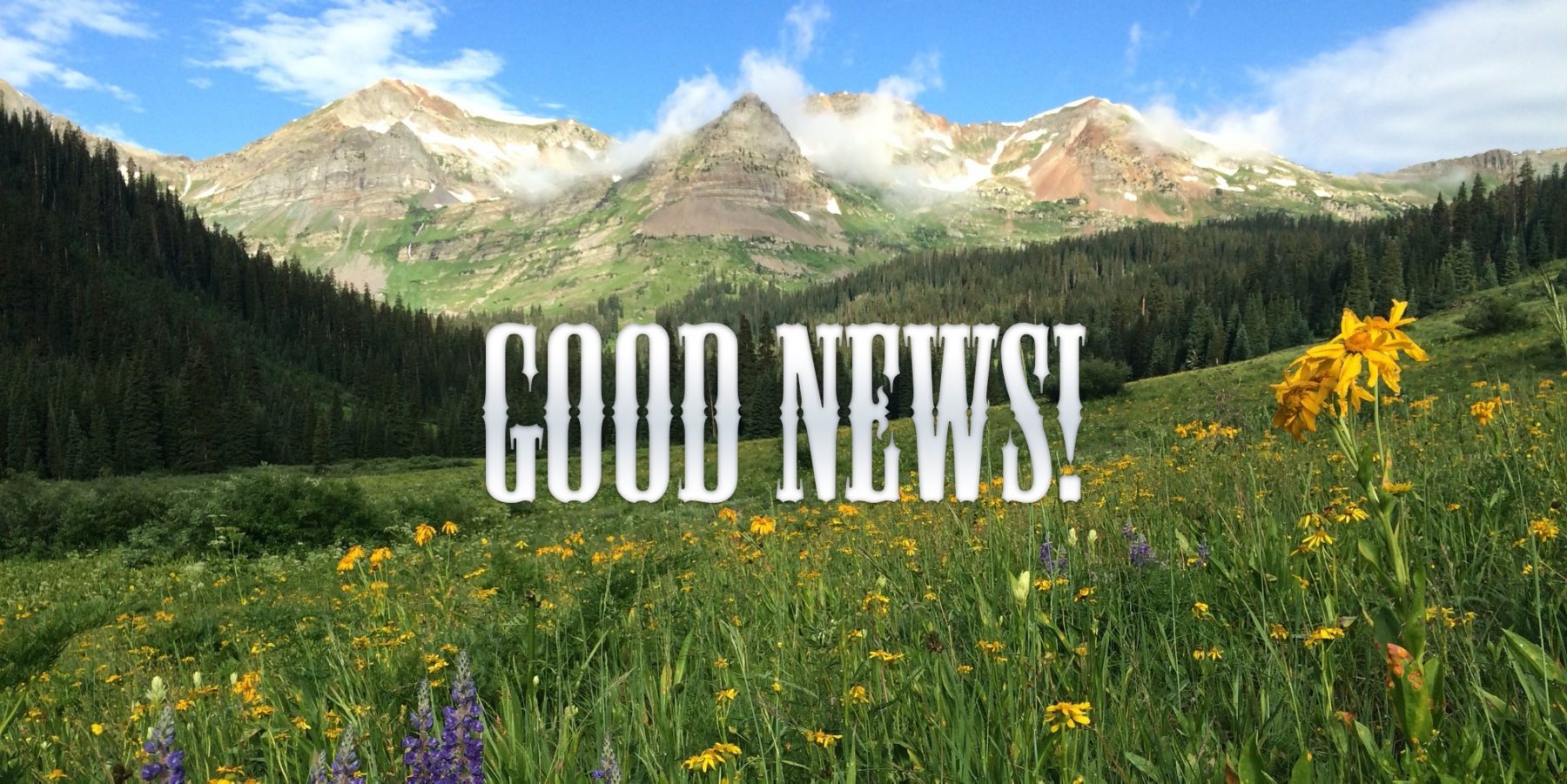
A new weekly emailing featuring ONLY good news from the American West!
Every Wednesday, I send out a handful of upbeat, funny, inspirational, useful, or heart-warming stories—content rooted here in the West that will give you a mid-week boost of positivity and forward momentum.
The email is nothing fancy, and it’s not a time suck—just quick, easy-to-read links to success stories, films, music, job opportunities, podcasts, art, conservation victories, and more… with the occasional inside scoop from some of my past podcast guests.
Gabe Vasquez – Advocate for Equity in the Outdoors
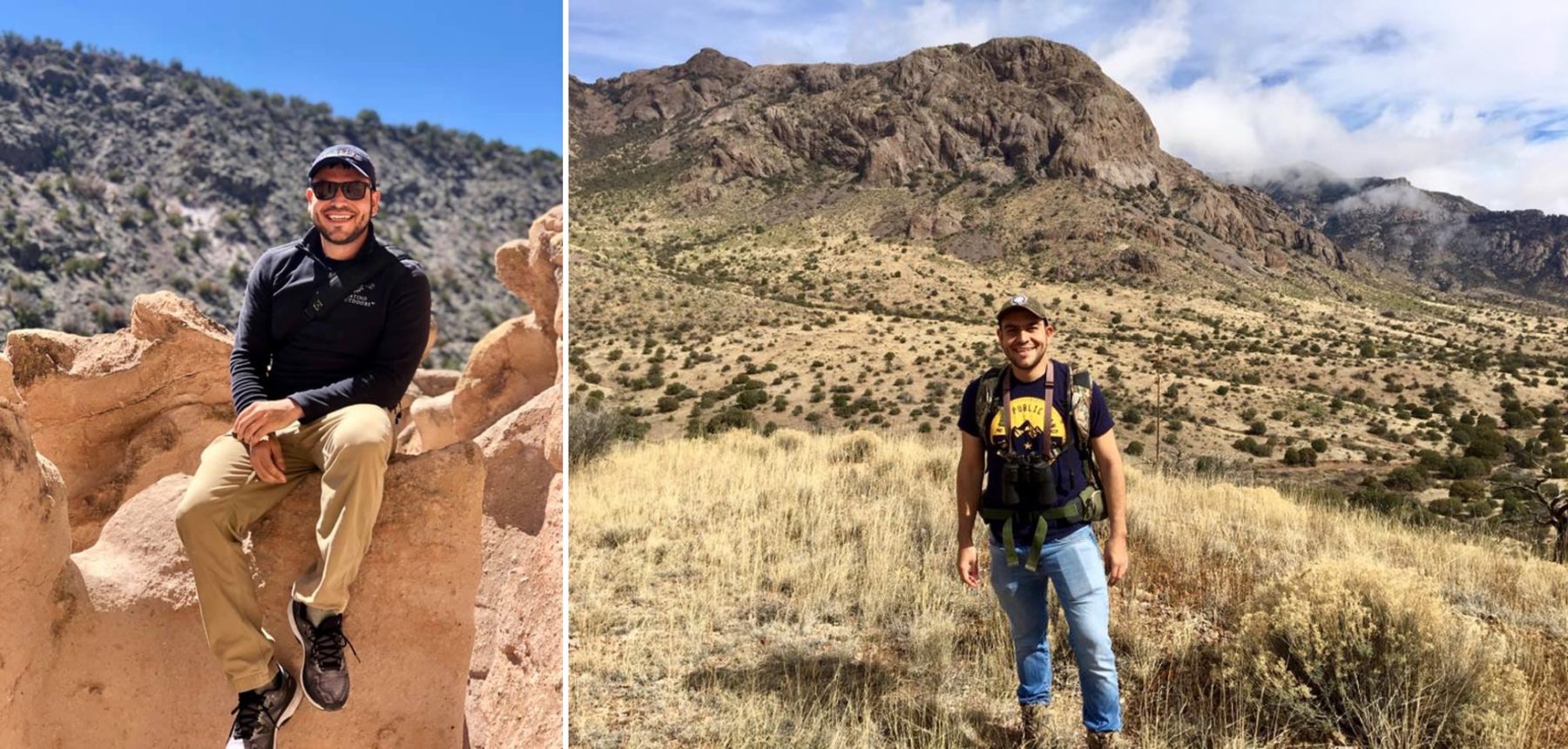
Gabe Vasquez is the founder of the Nuestra Tierra Conservation Project and currently serves as a city councilor in Las Cruces, New Mexico. Gabe has devoted his entire career to advocacy and conservation, specifically for the people and places in the border region of New Mexico. He’s worked for Senator Martin Heinrich, the New Mexico Wildlife Federation, and recently drafted New Mexico’s Outdoor Equity Fund legislation, which was the first of its kind in the nation.
Growing up in Ciudad Juarez, Mexico, Gabe developed a childhood passion for the outdoors while fishing with his father and learning about hunting from his grandfather. The outdoors has remained a focal point of his life, both professionally and personally, whether advising lawmakers on federal land policies or hunting, fishing, and hiking in the Coronado National Forest. But most importantly, Gabe has made it his mission to ensure that people of all socio-economic backgrounds and races can enjoy the outdoors, and hopefully, become advocates for protecting our country’s wild places.
Gabe was scheduled to be a keynote speaker at Colorado Parks and Wildlife’s Partners in the Outdoors Conference, a popular gathering of some of the country’s foremost experts in conservation and recreation. But because of the COVID pandemic, the in-person conference was converted into a virtual conference. And instead of an on-stage keynote, Gabe is now appearing on this podcast with me! As you’ll hear, Gabe’s message of balancing conservation and recreation, while ensuring equitable access to the outdoors, is a perfect fit with the conference’s theme of cultivating common ground to ensure a sustainable future for Colorado’s outdoors.
This was a fascinating interview, and I left the conversation better informed and inspired by Gabe’s leadership and vision. We started out chatting about the formation of the Nuestra Tierra Conservation Project and talking about the history and mission of the organization. Gabe then discussed lessons learned from his time working with Senator Heinrich, and how a brief stint living and working in Washington DC solidified his love for the West. We discuss New Mexico’s Outdoor Equity Fund, and how he played a significant role in creating this historic and cutting-edge, public-private program. We talk in-depth about the importance of getting kids into the outdoors, and the idea of how people need to fall in love with the outdoors before they can advocate for it. And as usual, we discuss favorite books, his favorite place in the West, and Gave offers some timely words of wisdom.
A huge thanks to Gabe for taking the time to chat, and thank you to Colorado Parks and Wildlife for inviting me to be a part of its virtual conference. Visit the episode notes for links to everything we discuss, including the full conference schedule, which will give you access to all presentations from the virtual conference. There’s a ton of exciting and informative content. But in the meantime, enjoy this conversation with Gabe Vasquez.
Photos courtesy of Gabe Vasquez
Download on Apple Podcasts
—
Download on Spotify
—
Download on Google Podcasts
—
Download on Stitcher
—
EPISODE NOTES
Topics Discussed:
- 4:00 – Gabe’s family connection to the outdoors
- 6:00 – Early job with Senator Heinrich
- 8:30 – Moving to Washington DC
- 11:30 – Back out West, working for the NWF
- 14:00 – Formation of Nuestra Tierra
- 19:00 – Why Gabe chose a service-based career
- 24:00 – Lessoned learned from working with Senator Martin Heinrich
- 30:15 – New Mexico’s Outdoor Equity Fund, explained
- 37:00 – What Outdoor Equity Fund funds
- 32:30 – Alternative funding sources for recreation
- 44:00 – Other states’ response to the Outdoor Equity Fund
- 47:00 – Thoughts on privilege and the outdoors
- 51:00 – Creating new generations of conservationists
- 54:00 – Gabe’s role as a City Councilor
- 1:04:00 – Favorite books
- 1:10:00 – Favorite place in New Mexico
- 1:14:00 – Parting words of wisdom
Information Referenced:
- Partners in the Outdoors Conference
- Nuestra Tierra Conservation Project
- Las Cruces, New Mexico
- Senator Martin Heinrich
- Organ Mountain Desert Peaks National Monument
- Antiquities Act
- Reverend Andrew Black
- New Mexico Wildlife Federation
- Hal Herring episode
- Gabe’s episode on Hal Herring’s podcast
- Rep. Angelica Rubio
- Michelle Lujan Grisham
- The Outsiders by SE Hinton
- Frankenstein by Mary Shelley
- The Time Machine by HG Wells
- The Call of the Wild by Jack London
- In-Fisherman
- Field and Stream
- Bill Dance
- There There by Tommy Orange
- Coronado National Forest
- The River and the Wall
- Jay Kleberg episode
Enjoy this episode? Then you might like these as well:
- Hal Herring – A Man of Words & Wild Places
- Mark Kenyon – A Passion for Public Lands
- Juanita Vero – A Deep Love of Place
- Dan Prenzlow – Generous Service, Humble Leadership
- Rachel VandeVoort – Harnessing the Power of Outdoor Recreation
Chris La Tray – Rediscovering His Past, Writing His Future
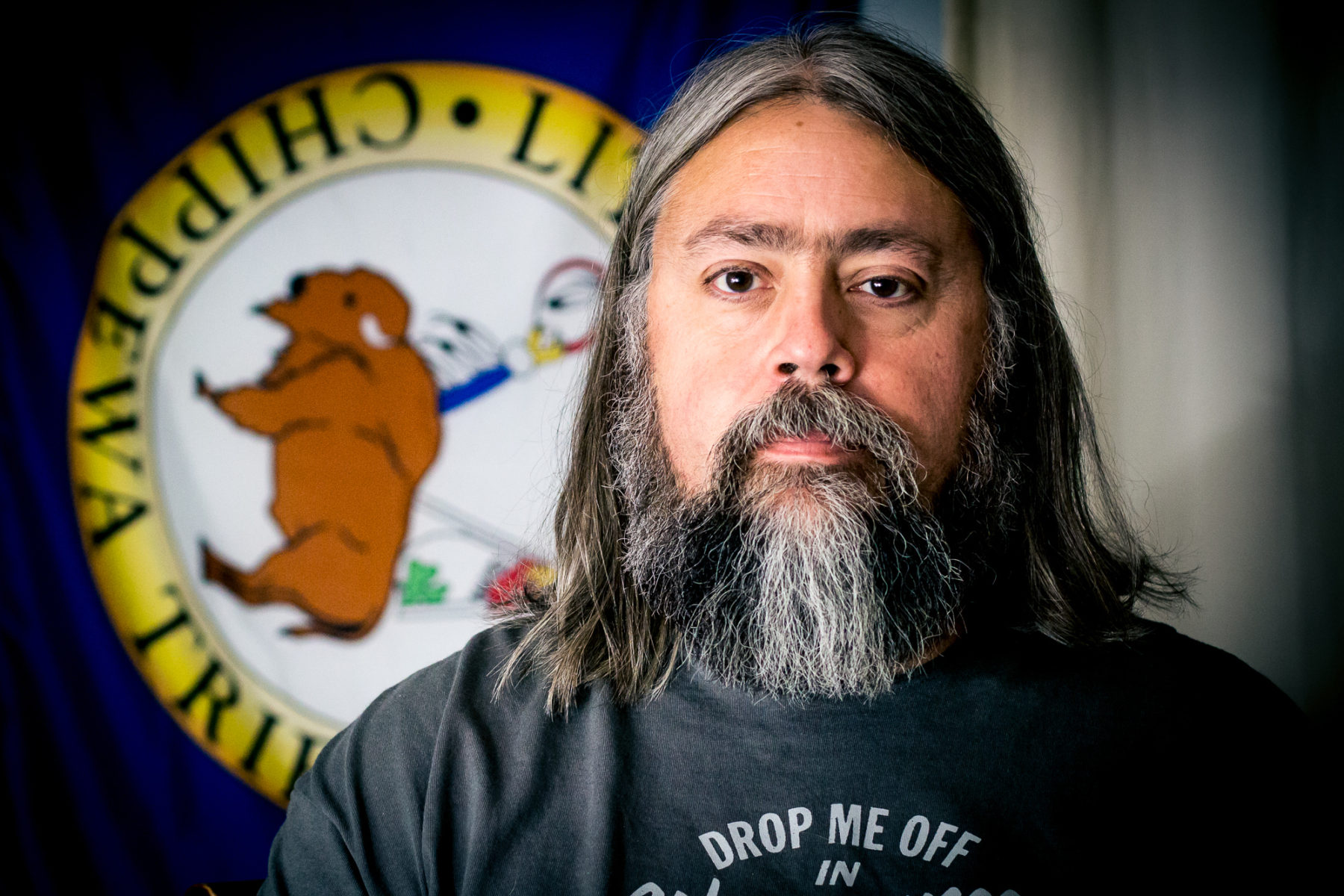
Chris La Tray is a writer, poet, and musician, as well as the author of the award-winning book One Sentence Journal: Short Poems and Essays from the World at Large. Chris is also an enrolled member of the Little Shell Tribe—a Native American tribe that was just recently recognized by the United States government, and prior to the recognition was known as the “landless Indians of Montana.” Chris’s immense talents as a storyteller combined with his unique personal perspective allow him to offer a fresh approach to understanding the complexities of the modern-day American West.
Chris was born and raised in Frenchtown, Montana, a small blue-collar community located just west of Missoula. Growing up with a deep passion for music, Chris headed to Seattle soon after high school to pursue a career as a professional rock musician, but he eventually made his way back to Frenchtown, where he worked for years in the manufacturing industry. But in 2015, following the death of his father, Chris quit his manufacturing consulting job and went all-in on pursuing his dream of being a full-time storyteller. A few years later, he published One Sentence Journal and has been widely recognized as one of the West’s most unique up-and-coming authors.
Chris and I had an interesting and timely conversation about his career, his life as a writer and musician, and his family’s heritage as members of the Little Shell Tribe. We start out by discussing the genesis of his idea for “One Sentence Journal,” how writing the book has changed his life, and a few stories from his many years as a professional musician. Then, we talk in-depth about the long-overdue federal recognition of his tribe and his thoughts on how the tribe can move forward. We also discuss how the long-term treatment of his tribe gives Chris unique insights into the current national discussions around race and privilege here in the United States. Chris also offers up a long list of excellent books on a wide variety of subjects related to the West and Native Americans that I know you will all find useful. Links to everything are in the episode notes.
Thanks to Chris for taking the time to chat, and I encourage you to check out One Sentence Journal. But in the meantime, enjoy this conversation with Chris La Tray.
Photo courtesy of Chris La Tray
Download on Apple Podcasts
—
Download on Spotify
—
Download on Google Podcasts
—
Download on Stitcher
—
EPISODE NOTES
Topics Discussed:
- 6:30 – Influence of Jim Harrison
- 8:40 – Writing practice that led to “One Sentence Journal”
- 11:30 – The amazing community of Montana writers
- 14:30 – The “practice” of creative output
- 16:30 – Decision to leave his manufacturing job
- 19:30 – Early years in Montana and beyond
- 21:30 – Music’s role in Chris’s life
- 24:00 – Becoming a “musician”
- 25:30 – Reading/writing vs music
- 27:00 – Chris’s Little Shell Tribe heritage
- 32:30 – Emotional impact of learning family’s history
- 35:15 – Thoughts on the Little Shell’s federal recognition
- 38:30 – Ideas for the future of the Little Shell Tribe
- 40:00 – Specifics of federal recognition
- 44:00 – How to read to expand knowledge and eliminate blind spots
- 46:30 – Hope for the future?
- 54:00 – Fact and Fiction Bookstore
- 59:00 – Favorite books
- 1:03:30 – Favorite location in the West
- 1:05:30 – Parting words of wisdom
Information Referenced:
- Chris La Tray
- Chris’s email newsletter
- One Sentence Journal by Chris La Tray
- In Search of Small Gods by Jim Harrison
- Returning to Earth by Jim Harrison
- Braided Creek by Jim Harrison
- Frenchtown, MT
- Little Shell Tribe
- “Landless Indians of Montana”
- Métis
- The Heartbeat of Wounded Knee by David Troyer
- Indigenous Peoples’ History of the United States by Roxanne Dunbar-Ortiz
- James Lee Burke
- David Sedaris
- Ellen Meloy
- Anna Maria Spana
- Amy Irvine
- Craig Childs
- Robert Sund
- Heather Durham
- Jim Welch
- Richard Wagamese
- Joy Harjo
- Council Grove
SPECIAL OFFER FOR M&P LISTENERS!
Freeflow Institute is a Montana-based organization focused on re-wilding the creative spirit, connecting people to places, and preserving wild spaces. Freeflow eliminates the barrier between your ideas and your environment by bringing emerging and established writers, leaders, artists, and communicators together into wild landscapes.
On a Freeflow course you can expect to gain perspective and identify new tools to help you be effective in your creative work and build creative community. You can also take Freeflow courses for college credit and infuse your academic career with outdoor learning.
The line-up of Freeflow instructors includes many guests of the Mountain & Prairie Podcast, including Alexis Bonogofsky, Hal Herring, Brendan Leonard, and today’s guest, Chris La Tray. This summer, Freeflow is adapting their programming to meet the challenges of the current moment, and I want to share two specific opportunities with you now.
Starting on July 1, join a small cohort of writers and artists of all backgrounds for a unique, online, five-week Community Workshop Series, the theme of which is SHIFT. SHIFT is meant to empower you to find your voice amid the chaos and tackle the question of how we use our art and words to catalyze positive change, while exploring the natural world closest to and within you. Guest speakers will include Pam Houston, Amy Irvine, and Craig Childs, among others. Scholarships are available, and there are only a few spaces left.
Then, in September, join Pulitzer Prize finalist William DeBuys on a five-day writing workshop on the Green River’s Gates of Lodore, where you’ll spend days floating between canyon walls, analyzing the concept of change in literature, climate, and life, and writing.
Find out more about all of Freeflow Institute’s programs by visiting their website: www.freeflowinstitute.com or shoot them an email at info@freeflowinstitute.com
The first ten Mountain & Prairie listeners who register for SHIFT or the Gates of Lodore Workshop will get $150 off their tuition! Just mention the Podcast when you register.
Enjoy this episode? Then you might like these as well:
- Len Necefer – Indigenous Advocate
- Chris Dombrowski – Words, Water & the West
- Taylor Keen – Tribal Truth Seeker
- Juanita Vero – A Deep Love of Place
- Alexis Bonogofsky – Taking a Stand for the West
Rachel VandeVoort – Harnessing the Power of Outdoor Recreation
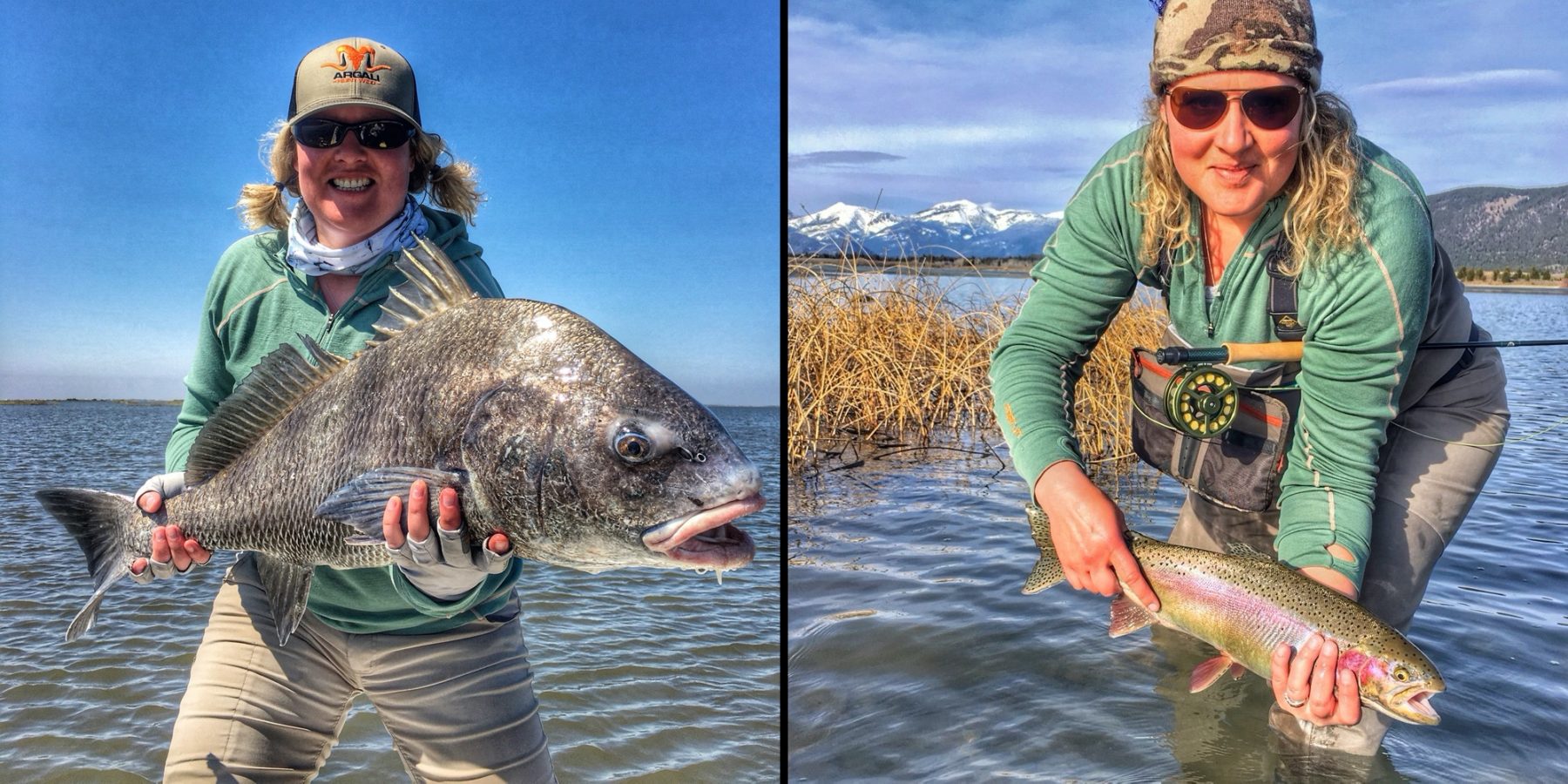
Rachel VandeVoort is the Director of the Montana Office of Outdoor Recreation, an office that advocates for the outdoor recreation industry and works to leverage its numerous benefits to the state. The office was created in 2016 by Montana Governor Steve Bullock, and he tapped Rachel to be its first director, where she built the office from the ground up. Since then, the office has experienced amazing growth in influence and effectiveness, and it has served as a shining example for other states that have formed similar offices.
A native Montanan, Rachel has a diverse background that makes her uniquely qualified for her role as Director. She grew up working for her family’s river guiding business in and around Whitefish, MT and also spent time as a fishing guide. After graduating from the University of Montana, she worked in a wide variety of industries that are closely connected with land and recreation, including organic farming, skiing, and firearms manufacturing. Thanks to her diverse and deep experience in all facets of the outdoor world, Rachel has had great success finding common ground between sometimes-competing stakeholders to harness the collective power of Montana’s recreation industry.
Rachel was slated to be a keynote speaker at Colorado Parks and Wildlife’s Partners in the Outdoors Conference, an annual gathering that brings together stakeholders from all corners of the conservation and outdoor recreation industries. But because of the COVID pandemic, the in-person conference was transformed into a virtual conference—and Rachel’s keynote speech was transformed into this episode of Mountain & Prairie. I was thrilled to have the chance to speak with Rachel because her work aligns so well with the theme of the Partners in the Outdoors Conference, specifically, how do we find common ground and mutually beneficial solutions for balancing conservation and recreation.
We covered a lot in a little over an hour, including the history of her job and the office, the staggering positive economic impacts of the outdoor industry, and ideas around funding conservation through recreation now and into the future. We also talked a lot about Rachel’s eclectic background and how all of her varied experiences make her uniquely qualified for her position. Rachel shares some thoughts on finding common ground among competing stakeholders, the importance of understanding history in the West, and the collaborative nature of the outdoor recreation industry. Be sure the check out the episode notes for a full list of topics discussed.
Big thanks to Rachel for taking the time to chat and to Colorado Parks and Wildlife for partnering with Mountain & Prairie for this series of podcasts. If you have a chance, visit the Partners in the Outdoors website all of the conference content—there’s quite a line up of virtual courses and learning opportunities. But in the meantime, enjoy this educational episode with Rachel VandeVoort.
Photos courtesy of Rachel VandeVoort
Download on Apple Podcasts
—
Download on Spotify
—
Download on Google Podcasts
—
Download on Stitcher
—
EPISODE NOTES
Topics Discussed:
- 3:45 – Montana Office of Outdoor Recreation explained
- 7:45 – Massive economic impacts of outdoor recreation
- 10:00 – Economic impacts in Montana specifically
- 11:30 – Process of creating the office for Montana
- 12:45 – Outdoor infrastructure in Montana
- 15:15 – The positivity of the recreational economy
- 17:45 – Learning from other states’ outdoor rec offices
- 18:45 – How Montana’s rec office differs from Colorado’s
- 20:45 – Rachel’s eclectic background
- 22:45 – Desire to stay in Montana
- 26:00 – First job in organic food
- 29:30 – Starting her job in the firearms industry
- 34:00 – Communication lessons learned from a childhood in recreation
- 37:15 – Techniques for finding common ground between competing stakeholders
- 39:45 – The false premise of “consumptive” vs “non-consumptive” recreation
- 46:45 – Thoughts on Pittman-Robertson, Dingell-Johnson, and the future of conservation funding
- 54:45 – Collaboration between outdoor rec stakeholders
- 59:35 – Favorite books
- 1:01:00 – Favorite films
- 1:02:45 – Rachel’s family history in Montana
- 1:03:45 – Parting words of wisdom
Information Referenced:
- Montana Office Outdoor Recreation
- Colorado Parks and Wildlife
- Partners in the Outdoors Conference
- Governor Steve Bullock
- Statewide Comprehensive Outdoor Recreation Plan
- Wild and Scenic Flathead River
- University of Montana
- Whitefish Mountain Resort
- Kimber Manufacturing
- Hal Herring podcast episode
- Theodore Roosevelt
- Gifford Pinchot
- Pittman Robertson Act
- Sierra Club
- North American Model of Conservation
- Mark Kenyon episode
- That Wild Country by Mark Kenyon
- Self Reliance by Ralph Waldo Emerson
- The Big Burn by Timothy Egan
- A River Runs Through It
Enjoy this episode? Then you might like these as well:
- Dan Prenzlow – Generous Service, Humble Leadership
- Rebecca Jewett, Part 2 – Conservation’s Role During Challenging Times
- Daniela Ibarra-Howell – Healing the Land Holistically
- Kate Kavanaugh – Regeneration & Restoration
- Alexis Bonogofsky – Taking a Stand for the West
- Sara Dant – A Deep Dive Into the History of the West
- Juanita Vero – A Deep Love of Place
Chris Burkard – The Art of Suffering
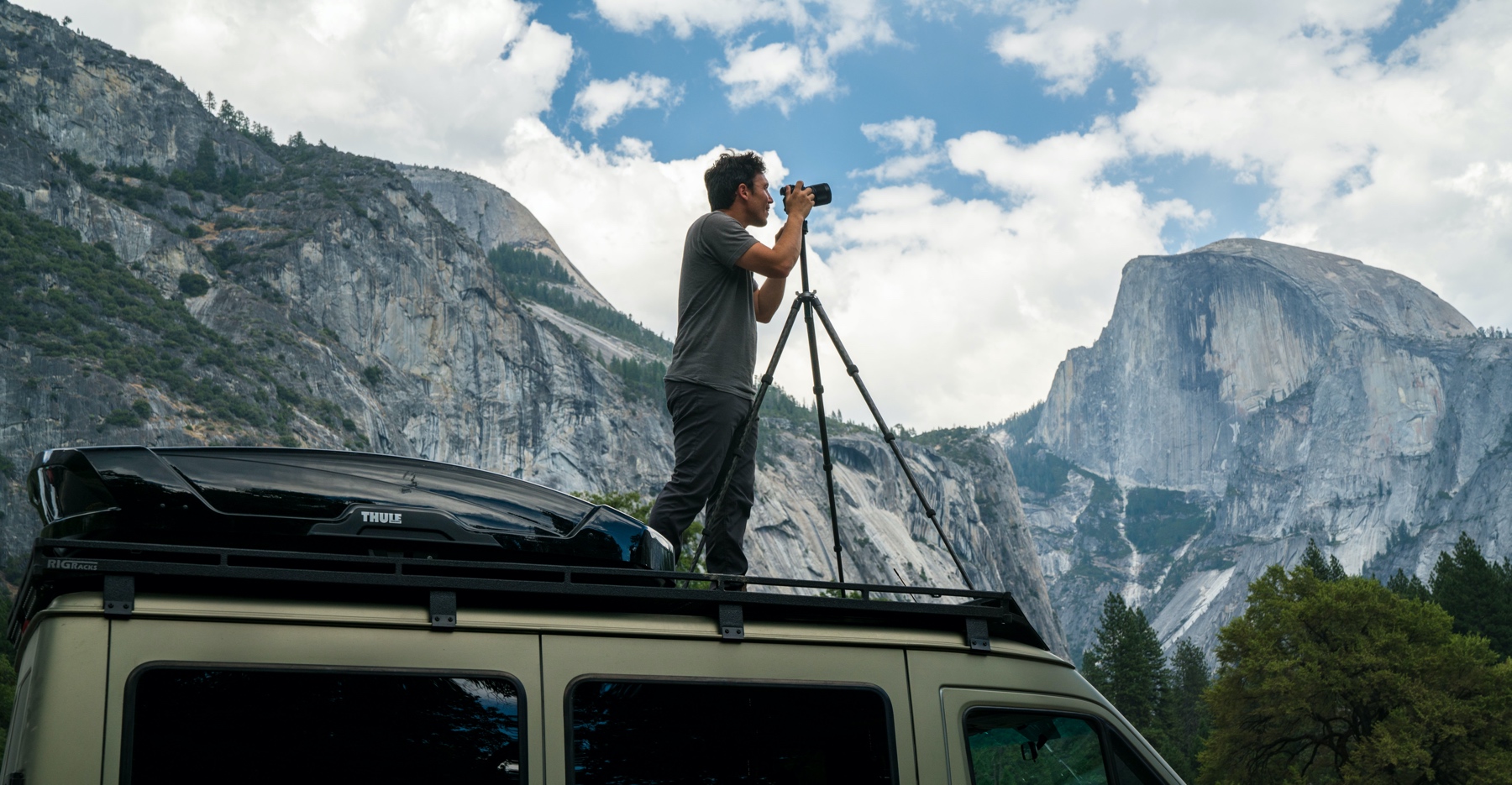
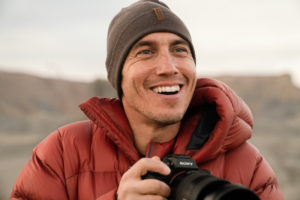
Chris Burkard is a world-renowned photographer, filmmaker, and storyteller whose work captures the beauty and rawness of some of the earth’s wildest places. Whether documenting iconic climbs in Yosemite or frigid surf trips deep in the Arctic Circle, Chris has established himself as a committed artist who is willing to suffer extensively to get the perfect shot. And because of his love and respect for these wild places, Chris is also a committed conservationist, using his artistic skills to showcase the importance of endangered places and effect positive policy changes.
Born and raised on the Central Coast of California, Chris spent much of his youth exploring the mountains and coastline of his home state. During high school, he fell in love with photography and eventually left college to pursue it as a full-time career. After several years of working to establish himself in the business, Chris’s commitment and hard work paid off—he’s now one of the most sought after photographers for a wide range of clients, from corporations like Apple to independent publications such as Surfers Journal or Modern Huntsman. Chris’s career is a testament to the power of hard work, positivity, boundless energy, and laser-like focus.
I’ve been a fan of Chris’s for years, so it was a real pleasure to have the chance to chat with him. We both took a break from our respective quarantines and kid-wrangling duties to meet up via Skype for a fun and wide-ranging conversation. The specifics of Chris’s photography career have been documented extensively in audio and print, so I wanted to learn more about what makes Chris tick—why he chooses to suffer in dangerous environments, how he and his wife engrain grit in their two sons, and how he manages to muster positivity during tough times. We also talked a lot about his commitment to conservation, as well as his commitment to working with smaller, independent outdoor publications. And as usual, we discuss favorite books, places in the West, and Chris offers some timely words of wisdom. Links to everything are in the episode notes.
A huge thanks to Chris for taking the time to chat during such a crazy time. I hope you all enjoy this conversation—it’s a much-need burst of energy and optimism during this challenging time!
Photos courtesy of Chris Burkard
Download on Apple Podcasts
—
Download on Spotify
—
Download on Google Podcasts
—
Download on Stitcher
—
EPISODE NOTES
Topics Discussed:
- 3:30 – “Pain is a shortcut to mindfulness”
- 7:15 – The process of learning to appreciate pain
- 10:00 – Growing up in California
- 14:00- When photography entered Chris’s life
- 16:00 – Deciding to leave school to pursue photography
- 18:30 – Choosing to be positive
- 22:30 – Thoughts on cultivating grit in children
- 25:00 – Striving to live up to one’s full potential
- 27:15 – Outdoor adventure as a parenting tool
- 29:30 – Re-evaluating risk as a parent
- 36:00 – Training for mental stress
- 37:30- Ultra-endurance bike riding
- 42:00 – Meditation training
- 43:00 – Dealing with the stress of COVID-19
- 46:30 – Work in the conservation world
- 53:45 – Commitment to working with smaller outdoor publications
- 58:30 – Favorite books
- 1:02:30 – Favorite places in the West
- 1:04:45 – Parting words of wisdom
Information Referenced:
- Chris Burkard
- Chris on Instagram
- Chris’s books
- Chris’s TED talk
- SURFER Magazine
- Big Sur
- Yosemite
- Zion
- Grit by Angela Duckworth
- Under An Arctic Sky film
- Yvon Chouinard
- Surfers Journal
- Modern Huntsman
- Adventure Journal
- The Boy Who Spoke to the Earth by Chris Burkard
- The Emerald Mile by Kevin Fedarko
- Edward Abbey
- Essentialism by Greg McKeown
- Ansel Adam: An Autobiography by Ansel Adams
- Chris’s interview with Chase Jarvis
- Creative Calling by Chase Jarvis
- Bears Ears
- Valley of the Gods
- Canyonlands
- Paul Nicklen
Enjoy this episode? Then you might like these as well:
- Pete McBride – A Passion for Water & Wild Places
- Hampton Sides – Live at the Aspen Institute
- Brendan Leonard – Grinding It Out
- Jessica Lewis – Doing More With Less
- Heather Hansman – Demystifying Water in the West
- Peter Heller – Chasing the Flow
Dan Prenzlow – Generous Service, Humble Leadership
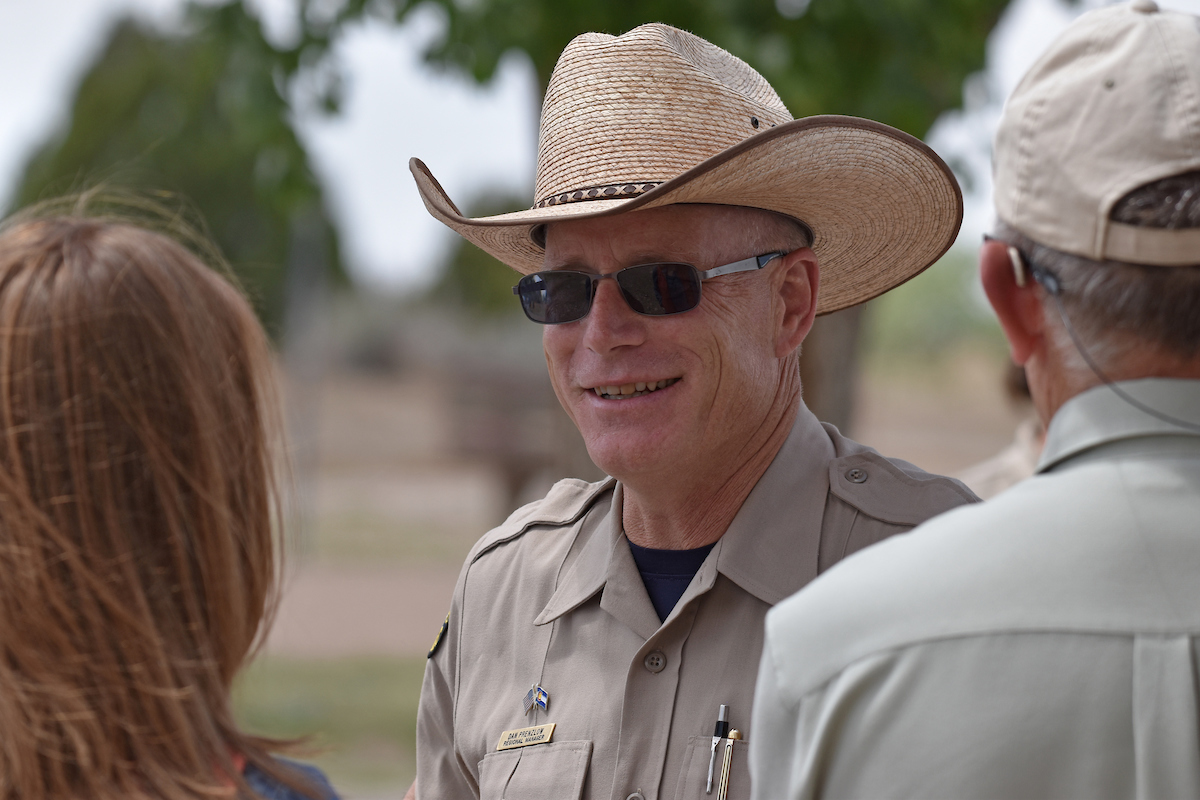
Dan Prenzlow is the Director of Colorado Parks and Wildlife (CPW), the agency charged with managing wildlife, lands, natural resources, and outdoor recreation throughout the great state of Colorado. Dan started with the agency back in 1986 as a District Wildlife Manager and steadily worked his way through the ranks, assuming the role of Director in the spring of 2019. Born and raised in Colorado, Dan has had a lifelong love of recreating in the state’s open spaces and wild places, and he has devoted his entire career toward protecting and managing them for the benefit of present and future generations.
Dan and I were scheduled to meet at CPW’s annual Partners in the Outdoors Conference, an extremely popular gathering that brings together stakeholders from all corners of the conservation and outdoor recreation sectors. The conference has become the foremost opportunity for organizations, businesses, agencies, universities, and more to come together to find common ground and mutually beneficial solutions for balancing conservation and recreation here in Colorado. Unfortunately, the COVID-19 pandemic made the in-person conference impossible, but thankfully the amazing team at CPW was able to move the conference online, and this podcast is a part of the new virtual conference.
If you love spending time outdoors, whether here in Colorado or anywhere else, I know you’ll glean lots of valuable information from this conversation. Dan and I spend the first half of the conversation discussing some of the specifics around CPW—the organization’s history, the success of the Partners in the Outdoors Conference, CPW’s important role in private land conservation, and CPW’s role as a national leader in balancing conservation and recreation. During the second half of the conversation, we discuss Dan’s personal backstory—why he decided to pursue public service as a career, his family’s long history of service-minded work, and how he worked his way up to the role of Director. Dan also shares many valuable leadership lessons, including the importance of humility, empathy, and surrounding yourself with a strong team.
As usual, there is a ton of valuable information in this episode, so I encourage you to check out the episode notes for a full list of the topics we discussed and links to all of the information we reference. And if you’d like more information about how you can participate in Partners in the Outdoors Virtual Conference, that link is in the episode notes as well.
Thanks to Dan and his team at CPW for all of their important work. I hope you enjoy this conversation as much as I did!

Photos courtesy of Colorado Parks and Wildlife
Download on Apple Podcasts
—
Download on Spotify
—
Download on Google Play
—
Download on Stitcher
—
EPISODE NOTES
Topics Discussed:
- 3:30 – Colorado Parks and Wildlife (“CPW”) described
- 6:50 – CPW’s “Partners in the Outdoors” program
- 11:45 – Colorado’s population boom and its impact on CPW’s work
- 16:00 – CPW as a trusted conservation partner
- 21:30 – CPW’s “Ranching for Wildlife” program
- 26:30 – Partnership successes that can result from adversity
- 28:00 – CPW as a national leader in conservation and recreation
- 22:30 – Dan’s personal journey to CPW
- 37:30 – The importance of service for Dan and his family
- 40:30 – Leadership lessons gleaned from rising through the ranks at CPW
- 45:30 – What characteristics Dan looks for in employees
- 50:45 – Techniques for finding common ground between competing stakeholders
- 57:00 – Favorite books
- 58:50 – Favorite location in Colorado
Information Referenced:
- Director Dan Prenzlow
- Colorado Parks and Wildlife
- 2020 Partners in the Outdoors Virtual Conference
- CPW on Instagram
- Colorado State Parks
- Colorado Fishing
- Colorado Hunting
- Colorado population projection article
- CPW’s Wildlife Habitat Program
- Great Outdoors Colorado (“GOCO”)
- Ranching for Wildlife
- Forbes Trinchera Ranch
- Colorado State University
- Meeker, Colorado
- CPW Internship program
- Coach Bill McCartney – CU Football
- Holy Bible
- Your First 100 Days in a New Executive Job by Robert Hargrove
- Palmer Land Trust
Enjoy this episode? Then you might like these as well:
- Rebecca Jewett, Part 2 – Conservation’s Role During Challenging Times
- Hal Herring – A Man of Words & Wild Places
- Mark Kenyon – A Passion for Public Lands
- Duke Phillips IV – Living with the Land
- Alexis Bonogofsky – Taking a Stand for the West
- Pete McBride – A Passion for Water & Wild Places
- Adam Foss – Lessons Learned From a Life Afield
- Bryce Andrews – People, Predators, and the American West
- Sara Dant – A Deep Dive Into the History of the West

Callan Wink – A New Voice for the New West
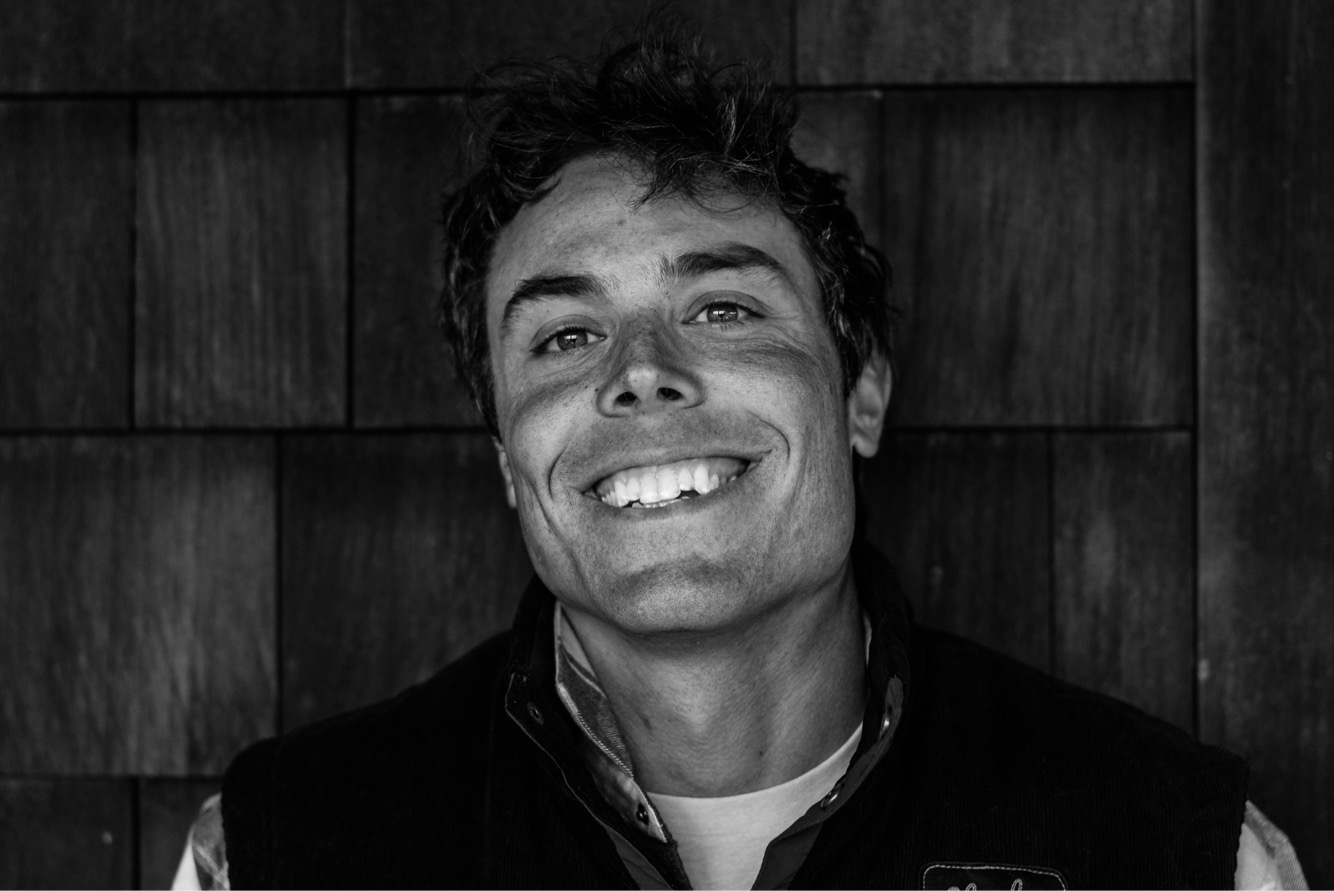
Callan Wink is a writer, novelist, fishing guide, and surfer who currently splits his time between Livingston, Montana and Santa Cruz, California. He’s the author of the newly released novel August, as well as the highly regarded short story collection Dog Run Moon, books that I recently read and thoroughly enjoyed. Callan’s writing speaks for itself, but if you’re looking for credentials, he’s got those too—he’s been published in The New Yorker, Men’s Journal, The Best American Short Stories Anthology, and more. He’s also been awarded fellowships by the National Endowment for the Arts and Stanford University, where he was a Wallace Stegner Fellow.
A native of Michigan, Callan moved west soon after high school, where he began guiding on some of Montana’s most renowned rivers. In the ensuing years, writing became more and more of a focus, and eventually, he published Dog Run Moon. Currently, Callan writes seasonally—he guides in Montana during the warm months, then moves to California during the winter, where he focuses exclusively on writing, with surfing filling the remainder of his non-writing time.
Callan and I connected via the internet from our respective quarantines and had a fun conversation about fishing, writing, reading, creativity, and more. We started out talking about his upbringing in Michigan and how fishing eventually led him to build a life in the West. We discuss the pros and cons of his seasonal approach to writing, and how working as a fishing guide helps to fuel his writing career. We talk about the importance of being a keen observer of people, and we also discuss where and how he finds inspiration for his characters. We also talk about his friendship with the legendary author Jim Harrison, and how that relationship has positively affected his life and work.
I encourage you to check out August and Dog Run Moon—I think you’ll enjoy them both. But in the meantime, enjoy this wide-ranging conversation with Callan Wink.
Photo courtesy of Callan Wink
Download on Apple Podcasts
—
Download on Spotify
—
Download on Google Play
—
Download on Stitcher
—
EPISODE NOTES
Topics Discussed:
- 6:30 – Heading to Montana to fish
- 10:30 – Childhood obsession with reading
- 12:30 – Progress toward becoming a professional writer
- 18:30 – Lessons learned from grad school
- 21:00 – Balancing writing and fishing
- 23:30 – Gathering material for characters
- 30:15 – Callan’s writing routine
- 33:30 – How an idea becomes a short story or novel
- 37:00 – How the novel August evolved from a short story
- 39:30 – Outlining versus organic growth of a story
- 43:00 – Jim Harrison’s influence
- 45:45 – Poetry Recommendations
- 51:00 – Callan’s current reading habits
- 54:00 – Advice for aspiring writers
- 58:30 – Favorite books
- 1:00:30 – The magic of Road House
- 1:01:30 – Favorite location in the West
- 1:04:00 – Best advice ever received
Information Referenced:
- Callan Wink
- Callan on Instagram
- August: A Novel by Callan Wink
- Dog Run Moon by Callan Wink
- Beth Loffreda
- Brad Watson
- Joy Williams
- Jim Harrison
- Dead Man’s Float by Jim Harrison
- Michael Earl Craig
- Tap Out by Edgar Kunz
- Breath by Tim Winton
- The Shepard’s Hut by Tim Winton
- Stegner Fellowship at Stanford
- Blood Meridian by Corman McCarthy
- Housekeeping by Marilynne Robinson
- Angle of Repose by Wallace Stegner
- Rock Springs by Richard Ford
- Road House
- Yellowstone River
Enjoy this episode? Then you might like these as well:
- Chris Dombrowski – Words, Water & the West
- Peter Heller – Chasing the Flow
- David Gessner, Part 2 – Ambition, Art, and Arête
- Hampton Sides, Part 2 – How to Tell a Damn Good Story
- Heather Hansman – Demystifying Water in the West
- Emilene Ostlind – Storytelling for the New West
- Mark Kenyon – A Passion for Public Lands

Rebecca Jewett, Part 2 – Conservation’s Role During Challenging Times
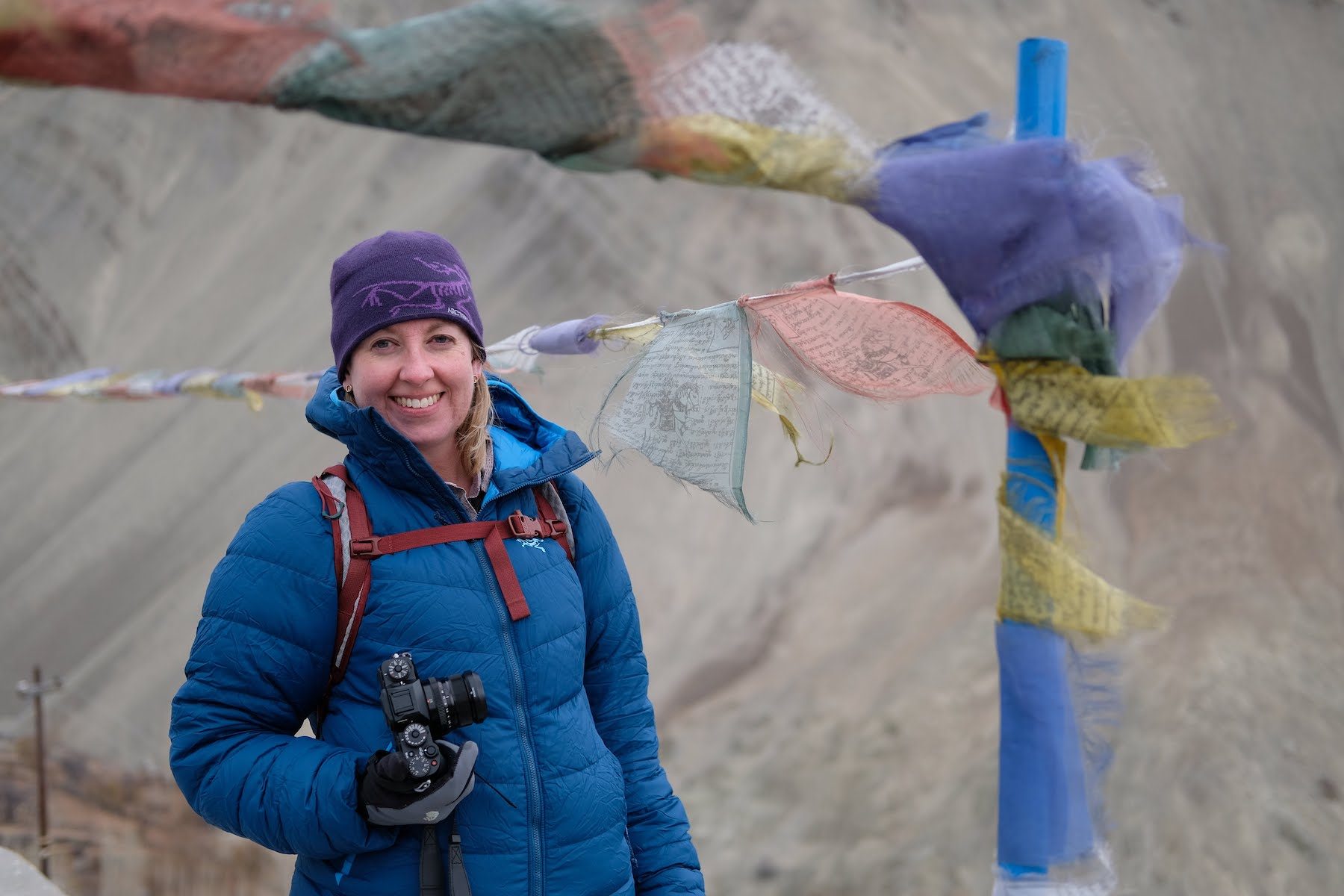

Rebecca Jewett is President and CEO of Palmer Land Trust, a conservation organization that works to conserve land and water resources in southeastern Colorado. Palmer Land Trust is one of the twenty largest land trusts in the nation based on acreage conserved, with over 135,000 acres of land protected in perpetuity. Rebecca has led the organization since 2014, expanding and diversifying its conservation initiatives and building Palmer into a national force in the land conservation sector.
If Rebecca and Palmer Land Trust sound familiar, it’s because this is Rebecca’s second time on the podcast and I work at Palmer as a Conservation Director. In the midst of this unprecedented COVID crisis, I thought it would be timely to have Rebecca join me again, this time to discuss how the crisis is affecting conservation and how she sees conservation evolving in its aftermath. Once the all-important work of the first responders has been completed, what role will the conservation of working farms and ranches, as well as public recreational open space, play in our recovery and rebuilding? For those of you who love land and the communities tied to it, this is a must-listen conversation.
And if you’re like me and often feel completely overwhelmed with COVID talk, rest assured that this conversation is upbeat and solution-oriented. I imagine you will finish the discussion inspired by the opportunities that our new future holds—and inspiration is something that we can all use more of these days. Rebecca and I cover a lot, including the importance of farming and ranching during this crisis and the role that Palmer plays in supporting agricultural producers. We talk about the need to focus on community building and strong partnerships, as well as the conservation opportunities that could arise post-COVID. Finally, we discuss leadership lessons and how the birth of her daughter has made her a better leader.
Obviously, I’m a big fan of Rebecca’s. And I’m sure that after this conversation, you will be, too. Hope you enjoy!.
Photos courtesy of Rebecca Jewett
Download on Apple Podcasts
—
Download on Spotify
—
Download on Google Play
—
Download on Stitcher
—
EPISODE NOTES
Topics Discussed:
- 3:45 – Palmer Land Trust explained
- 6:15 – Land conservation and COVID-19
- 9:00 – Community as a focus of conservation
- 13:45 – Importance of agriculture in the face of COVID
- 18:45 – Win-Win-Wins that are possible in conservation
- 21:15 – How a diversified “business model” will allow effective conservation post-COVID
- 26:30 – Importance of strong partnerships during COVID
- 30:35 – Importance of storytelling in conservation
- 35:45 – How conservation will evolve in the coming years
- 40:45 – Thoughts on leadership during challenging times
- 47:45 – How motherhood has changed her perspective, professionally and personally
- 53:45 – Importance of optimism in parenting and life
- 56:15 – Good books on parenting
- 57:45 – Other good books
- 58:45 – Favorite podcasts
- 1:00:45 – Parting words of wisdom
Information Referenced:
- Rebecca Jewett – first podcast episode
- Palmer Land Trust
- Conservation easements explained
- Gates Family Foundation
- Great Outdoors Colorado (“GOCO”)
- Russ Schnitzer podcast episode
- Seth Godin
- This is Marketing by Seth Godin
- Hampton Sides
- Hampton Sides M&P episodes One and Two
- Bringing Up Bebe by Pamela Druckerman
- Happiest Baby on the Block by Harvey Karp
- Ed’s book recommendations
- Dare to Lead by Brene Brown
- Marketplace
- Make Me Smart
- The Daily
- Fresh Air
- The Moth
- Chronicle of Higher Ed article referenced
Enjoy this episode? Then you might like these as well:
- Daniela Ibarra-Howell – Healing the Land Holistically
- Sarah Wentzel-Fisher – Conservation in the Radical Center
- Alexis Bonogofsky – Taking a Stand for the West
- Sara Dant – A Deep Dive Into the History of the West
- Emilene Ostlind – Storytelling for the New West
- Live in Bozeman – Cate Havstad, Jillian Lukiwski, Becca Skinner & Juanita Vero

New Designs, New Shop
Just a quick heads up that I recently launched a new online shop featuring a fresh batch of Mountain & Prairie swag– shirts, coffee mugs, and stickers.
I’m very excited about these designs, and I hope you are too. Head over the store to check out the full collection of broc busters, sugar skulls, charging bison, and, of course, TR!
Mountain & Prairie Shop
George Hodgin – Mission-Driven Entrepreneur

George Hodgin is the founder and CEO of Biopharmaceutical Research Company (BRC), a California-based business with the mission of providing federally legal cannabis for approved researchers in the United States. Prior to starting BRC, George served as a US Navy SEAL officer, leading counterterrorism operations in combat zones such as Afghanistan. And to top it all off, he’s a graduate of the Stanford University Graduate School of Business and the University of North Carolina, where he was a Morehead-Cain Scholar. With a resume like this, it’s safe to assume that George is a driven, hard-working guy.
From a very young age, George knew he wanted to be a Navy SEAL. So after participating in ROTC during his undergraduate years, he began the Navy SEAL training, also known as BUD/S, immediately after graduation. After nearly seven years in the SEAL teams, George left the military to pursue his MBA at Stanford. During grad school, while helping one of his SEAL teammates seek treatment for combat injuries, George was shocked by the inability of doctors to advise patients on the use of marijuana for therapeutic, healing purposes. Despite being legal in many states, it is still illegal at the federal level, and therefore unable to be studied by federally approved researchers and doctors. George and his company seek to change this status-quo so that cannabis can be better understood and more widely prescribed as an alternative to opioids and other drugs.
The state-legal marijuana business has its roots in the American West, so I’ve wanted to speak with a cannabis entrepreneur for some time now. George offers excellent insights into the industry, discussing the challenges, governmental roadblocks, and opportunities for optimistic, innovative entrepreneurs. We also talk about why he decided to become an entrepreneur, and why he has consistently chosen some of the most challenging careers imaginable. We talk a lot about his service in the Navy, including the common traits of SEALs, the lessons learned from service, and the challenges of transitioning from the military into civilian life. Since we recorded this episode a few weeks into the Coronavirus crisis, he offers some hard-earned wisdom on how best to deal with high-stress, potentially dangerous situations like the one we all find ourselves in now.
George and I were supposed to record this episode in person, but the Coronavirus had other plans. But we still made it happen– each of us holed up in our homes and connected via Zoom– so I hope this episode offers some entertainment and motivation during this challenging time. Thanks for listening.
Photos courtesy of George Hodgin
Click Here to Download on iTunes
—
Click Here to Download on Spotify
—
Click Here to Download on Google Play
—
Click Here to Download on Stitcher
—
EPISODE NOTES
Topics Discussed:
- 4:00 – BRC explained
- 7:00 – Genesis of the idea for BRC
- 10:15 – Decision to be an entrepreneur
- 13:00 – Complexity of the cannabis business
- 16:00 – What fuels his passion for BRC
- 18:00 – Early years in NC
- 21:30 – Morehead-Cain Scholarship explained
- 24:00 – Early desire to be a SEAL
- 26:00 – Path from college to BUD/S
- 31:30 – Common trait of successful SEALs
- 34:30 – Transition from the Navy to civilian life
- 38:00 – Finding purpose outside of the SEALs
- 43:00 – Military lessons applied to business
- 47:30 – Main business challenge facing BRC
- 53:30 – Thoughts on the Coronavirus
- 57:45 – Favorite books
- 1:00:00 – Favorite Films
Information Referenced:
- Biopharmaceutical Research Company (BRC)
- Navy SEALs
- Stanford Graduate School of Business
- Morehead-Cain Scholarship
- National Outdoor Leadership School
- Navy SEALS movie clip
- BUD/S
- Navy SEAL Foundation
- “Commander’s Intent”
- Good to Great by Jim Collins
- The Cruelest Miles Gay Salisbury
- Washington’s Farewell by John Avalon
- Man’s Search for Meaning by Victor Frankl
- Daniel Day-Lewis
- Lincoln
- Gangs of New York
- Becoming Warren Buffett
Enjoy this episode? Then you might like these as well:
- Auden Schendler – The Optimistic Pragmatist
- Christine Su – The Business of Healthy Grasslands
- Matt Barber & Joel Doub – Stewards of a Fly Fishing Legacy
- Mike Reilly – Helping Combat Veterans Rediscover Purpose
- Jason Schlarb – Service, Adventure, and Ultra-Endurance

Kyle Richardson – Mountains & Music
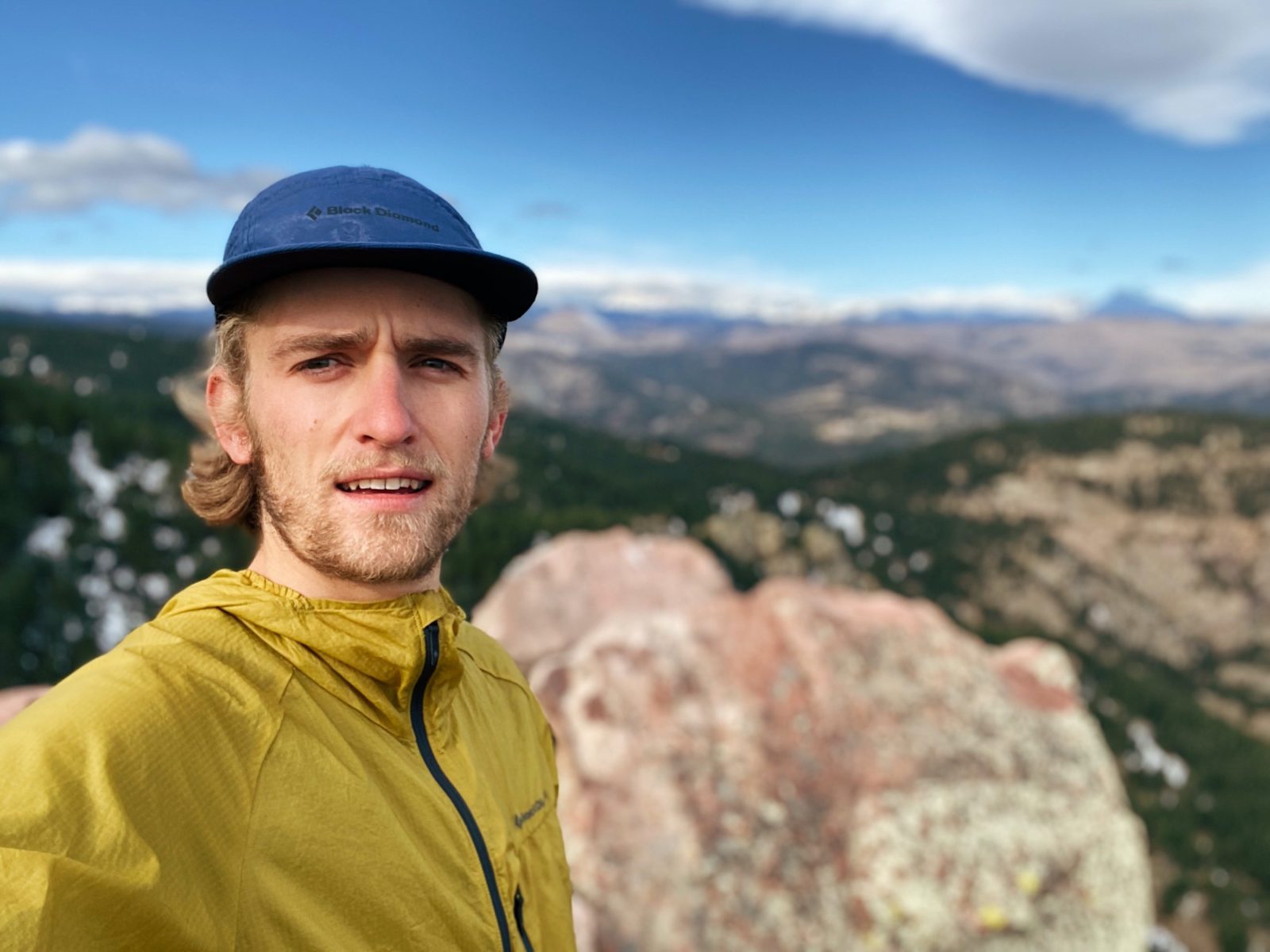
Kyle Richardson is a Colorado-based professional runner and mountain athlete who is best known for his high-stakes, high-speed endurance feats in the Rocky Mountains. Over the past two years, Kyle has set several Fastest Known Time (“FKT”) records in the Colorado mountains—most notably on Boulder’s First and Third Flatirons, as well as the renowned LA Freeway route that stretches from Longs Peak to Arapahoe Peak. Away from his endurance feats, Kyle is a formally trained musician, and he composes original music for filmmakers and outdoor brands such as Black Diamond and La Sportiva.
Born and raised in Austin, Texas, Kyle’s youth was defined by time in the outdoors with his family and a deep commitment to music and playing the drums. His love of the West’s wide-open spaces led him to college at the University of Colorado at Boulder, where he began to realize his talent for endurance and moving quickly through the mountains. After several years of running and climbing throughout Colorado, he captured the attention of the endurance community with his record-setting time on the LA Freeway, a difficult and exposed route that combines running, scrambling, and rock climbing. Since then, he has earned sponsorships from major outdoor brands that have allowed him to pursue his adventures in the mountains with full focus and intensity.
I met up with Kyle in Boulder, where we had a wide-ranging conversation about his passion for the mountains and music. We started by discussing his athletic career and some of the details around his fastest known times on well-known mountain routes. We also discussed Kyle’s love of the process of training—in both athletics and music—and how his commitment to preparation gives him the confidence to pursue challenging and sometimes dangerous goals. We discuss the common skills required to be great in both endurance sports and music, and Kyle talks about some of the mentors and heroes who have shaped his career. Kyle is a voracious reader, so we talk a lot about books, and Kyle reveals a very interesting personal tie to one of my favorite history books, Empire of the Summer Moon.
Kyle is humble and thoughtful, and it was a real pleasure getting to know him. Hope you enjoy this conversation as much as I did.
Photos courtesy of the Kyle Richardson
Click Here to Download on iTunes
—
Click Here to Download on Spotify
—
Click Here to Download on Google Play
—
Click Here to Download on Stitcher
—
Episode Notes
Topics Discussed:
- 3:00 – How Kyle describes his athletic pursuits
- 6:00 – Kyle and Fastest Known Times (“FKT”)
- 10:30 – FKTs in the Boulder’s Flatirons
- 16:00 – Training routine
- 18:00 – Growing up in Texas
- 20:30 – Music and how it informs athletics
- 22:50 – Film scoring, composing, and music industry
- 26:30 – Heroes and mentors in the music world
- 28:00 – Drums, running, and excess energy as a kid
- 29:30 – When people began to take note of Kyles running
- 32:30 – Athletic mentors
- 38:30 – Artistic, cerebral aspects to mountain sports
- 39:30 – Assessing risk in the mountains
- 42:30 – Nature making you feel small
- 46:30 – Kyle’s parent’s support for his career
- 48:30 – Running goals for 2020
- 52:00 – Books he’s currently reading
- 54:15 – Favorite books about the West
- 56:00 – Limiting screens and social media
- 57:30 – Favorite location in the West
- 58:45 – Most powerful outdoor experience
- 1:00:25 – Parting words of wisdom
Information Referenced:
- Kyle Richardson
- Kyle on Instagram
- Black Diamond
- La Sportiva
- Peter Bakwin
- FKT website
- FKT podcast
- Third Flatiron
- Art Blakey
- Jeremiah Green
- Carter Beauford
- Wilco
- LA Freeway
- Buzz Burrell
- Longs Peak
- Joe Grant
- Joe Grant podcast episode
- Anton Krupicka
- The Rut
- The Big Wonderful Thing by Stephen Harrigan
- The Amazing Adventures of Kavalier and Clay Michael Chabon?
- Blood and Thunder by Hampton Sides
- Hampton Sides podcast interview
- Empire of the Summer Moon by SC Gwynne
Enjoy this episode? Then you might like these as well:
- Joe Grant – Self-Powered Alpine Adventurer
- Justin Simoni – The Ultra-Endurance Artist
- Brendan Leonard – Grinding It Out
- Pete McBride – A Passion for Water & Wild Places
- Brady Robinson – Climber, Educator, Outdoor Advocate
15 Books That Will Give You Strength During Challenging Times
15 Books That Will Give You Strength During Challenging Times
I’m not an epidemiologist, nor do I play one on the internet. So I don’t have anything useful to add to the ubiquitous, high-voltage analysis of our new viral nemesis.
But I do compulsively read books, so I wanted to offer up a few titles that may be useful during these trying times. If I’ve learned anything from my love of history and reading, it’s that tough times can bring out the best in people, and almost everyone who has made a difference in the world has endured suffering in one form or another.
Easier said than done, for sure. One of my biggest worries around our current situation is wondering if I’ll be able to muster the toughness and steadiness of mind to co-lead my family through what will likely be a rough time for the entire world. I guess we’ll see. But I have found solace and wisdom in the books below, so I hope you will too.
[I’ve linked to Amazon for all of these books so you can click through to learn more and read reviews. But if you choose to buy one, please do so through your local bookseller. Owning a local bookstore is a tough business even in the best of times, so they would appreciate your patronage now more than ever.]
Tribe: On Homecoming and Belonging by Sebastian Junger – A short, powerful book that discusses how the most brutal of circumstances can reveal the best in the human race. Junger also explores how tragedy and challenge can refine our focus and strengthen our community bonds. One of the most influential and paradigm-shifting books I’ve ever read.
Man’s Search for Meaning by Viktor Frankl – Frankl was an Austrian psychologist who was imprisoned for years in a German concentration camp during World War II. Even amid such horrific evil, suffering, and death, he was able to find purpose and contentment—and then pass along this valuable wisdom to us, the reader.
When Things Fall Apart: Heart Advice for Difficult Times; The Places That Scare You: A Guide to Fearlessness in Difficult Times; Start Where You Are: A Guide to Compassionate Living by Pema Chodron – As far as I’m concerned, Pema is one of the wisest humans on earth. Her writings and speeches have improved my life in innumerable ways, and I whole-heartedly recommend all of her work. These three books are collections of short, easy-to-read essays that pack a serious punch.
Endurance: Shackleton’s Incredible Journey by Alfred Lansing – Shackleton and his crew were stranded on an inhospitable Antarctic ice shelf for nearly two years, yet Shackleton managed to keep his men optimistic, energized, and alive for the full duration. It’s a case study in the importance of routine, exercise, camaraderie, and positivity, even during the direst circumstances.
The Worst Hard Time: The Untold Story of Those Who Survived the Great American Dust Bowl by Timothy Egan – Don’t let the relative cushiness of the past 60 years fool you—there’s a long history of suffering in North America. The Dust Bowl is one of many examples of how Americans were able to survive epic ecological and economic turmoil and emerge from the crisis much tougher and stronger than before.
Waking Up: A Guide to Spirituality Without Religion by Sam Harris – This book offers a straightforward, practical guide to mindfulness and meditation, without any of the spiritual lingo that can be off-putting to many. It’s a guide to training your mind, recognizing thought patterns, and not getting jerked around by your emotions—essential skills to have in your tool belt in the coming months.
The Obstacle is the Way: The Ancient Art of Turning Adversity to Advantage by Ryan Holiday – Holiday draws on Stoic philosophy and historical figures to drive home the point that challenges and tragedies are inevitable—it’s how we deal with them that makes all the difference. Rather than dwell on the unfairness of it all, why not use these challenges to make ourselves better?
The Long Walk: The True Story of a Trek to Freedom by Slavomir Rawicz – A mind-blowing tale of just how much suffering humans can tolerate when times get tough. It follows the journey of Soviet soldiers who escape from a prison camp, only to have to cross a desert and the damn Himalayas to secure their freedom.
D-Day: June 6, 1944: The Climactic Battle of World War II by Stephen Ambrose – This book reminds me that when the chips are down, humans are capable of unbelievably complex cooperation and staggering heroism. It also reminds me that sitting around my house “social distancing” is a small price to pay for my community, country, and the world—much lower price than running directly into Nazi gunfire.
On the Shortness of Life: Life Is Long if You Know How to Use It by Seneca – Given current events, the title may seem somewhat morose, but the book’s overall lesson is clear—don’t fritter away your life. Make the most of it, because you might have 50 more years or you might have five more days. For some reason, I feel better about many of my internal struggles knowing that folks like Seneca struggled with the same issues 2,000 years ago.
The Daily Stoic: 366 Meditations on Wisdom, Perseverance, and the Art of Living by Ryan Holiday – Daily meditations that feature one short quote by a Stoic philosopher such as Seneca above, followed by a few paragraphs applying the principle to modern-day life. This book has been recommended by many of my podcast guests, and I read it (almost) everyday.
The Rise of Theodore Roosevelt by Edmund Morris – Just because I include this book on every list. And because TR knew how to make the most out of any circumstance. In the next few weeks, when deciding between watching Youtube videos or going for a run, wallowing in self-pity or doing art with your child, scrolling through Twitter or reading a book; just ask yourself, “What would TR do?”
Lonesome Dove by Larry McMurtry – Not interested in endless self-analysis or examining the fragility of life? Fair enough. Unplug and enjoy my favorite fiction book of all time. It will make you happy.
Daniela Ibarra-Howell – Healing the Land Holistically
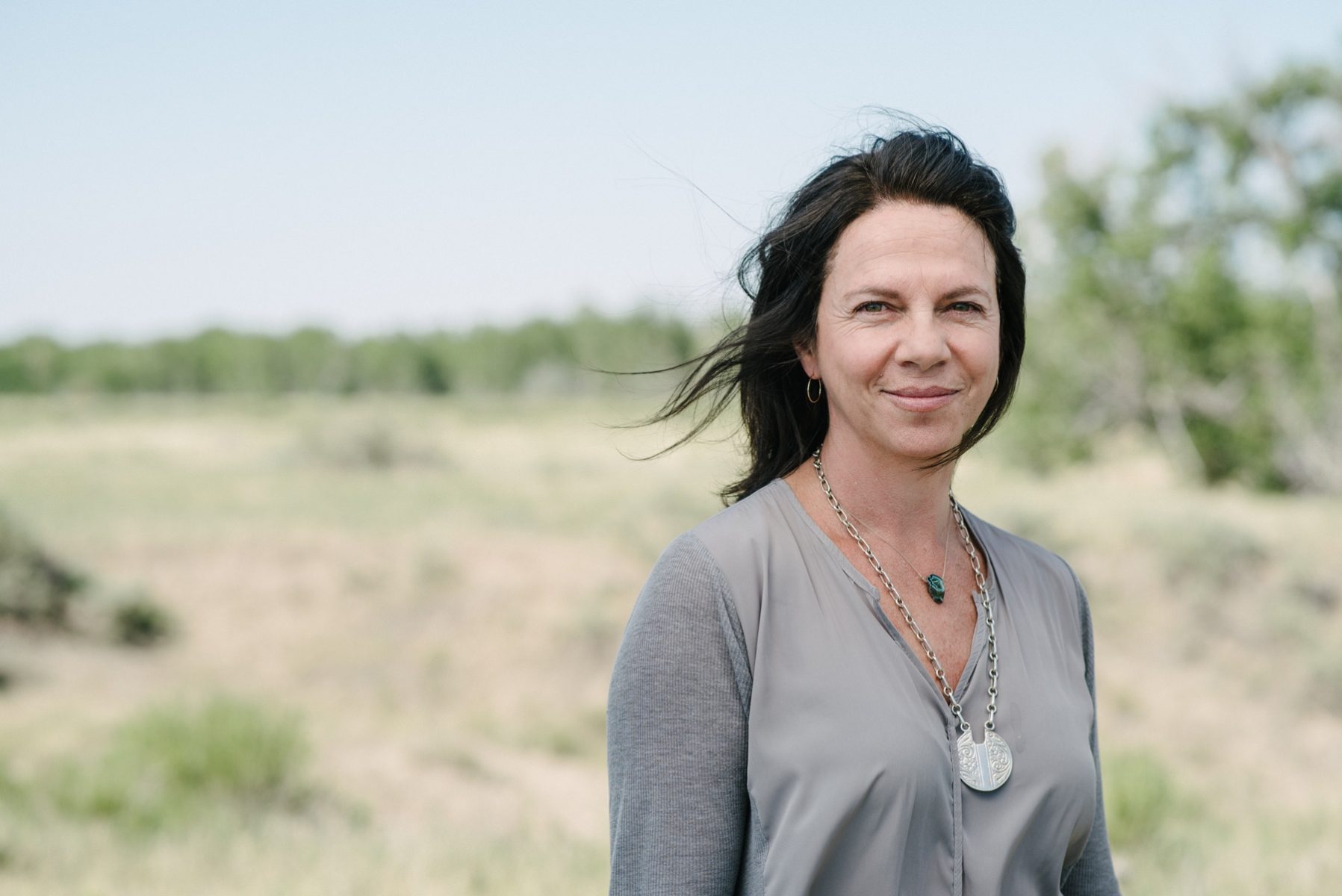
Daniela Ibarra-Howell is the CEO and a co-founder of the Savory Institute, an organization whose mission is to regenerate the world’s grasslands through holistic management. By restoring and protecting grasslands– both in the American West and around the globe– Daniela and her team at Savory effectively address pressing issues such as climate change, economic well-being, and food and water insecurity. Through inspiring leadership, masterful storytelling, and cutting-edge research, Savory is shifting the paradigm around agriculture’s role as a solution to many of the world’s challenges.
Daniela was born and raised in Argentina, and from a very young age, she loved the land, agriculture, and adventure. Her studies of agronomy led her to some of the far reaches of the globe, including New Zealand, where she met her now-husband Jim Howell. After many years managing ranches and working in the trenches of holistic management, they helped to found the Savory Institute in 2009, and Daniela took the reigns as CEO in 2011. Since then, the organization has grown and evolved, and Daniela has become one of the world’s leading voices for Holistic Management.
I was thrilled to finally get the chance to chat with Daniela on the podcast because my guests and I have referenced the Savory Institute so many times over the years. We started by discussing the organization– its mission, goals, structure, and global reach. We then talk about Daniela’s leadership philosophy and how she values thoughtful action, failing fast, and embracing complexity in all aspects of life. We talk about her upbringing in Argentina, her adventurous personality, and her partnership with her husband, Jim. We also talk about motherhood and how she has managed to balance such a high-performing career with raising two impressive and accomplished daughters. Whether you are interested in agriculture, leadership, or parenting, there are many lessons to be learned from Daniela, so I hope you enjoy!
Photos courtesy of the Savory Institute
Click Here to Download on iTunes
—
Click Here to Download on Spotify
—
Click Here to Download on Google Play
—
Click Here to Download on Stitcher
—
Episode Notes
Topics Discussed:
- 5:00 – Savory Institute explained
- 9:30 – Growth and evolution of Savory
- 14:00 – On taking risks and failing fast
- 16:00 – “Holistic Management” defined
- 18:30 – “Regenerative Agriculture” defined
- 21:00 – Business inertia in agriculture
- 27:00 – Importance of storytelling (and data!)
- 31:00 – Will Harris and White Oak Pastures as storytellers
- 34:45 – Daniela’s upbringing and education in Argentina and beyond
- 40:30 – Meeting Jim in New Zealand
- 44:00 – How managing ranches made her a better leader of people
- 52:00 – Heroes and mentors in business and leadership
- 56:00 – Balancing action and planning
- 1:00:30 – Thoughts on motherhood and raising children
- 1:07:00 – Important books on agriculture
- 1:12:30 – Parting words of wisdom
Information Referenced:
- Savory Institute
- Savory Hubs
- Allan Savory
- Jody Butterfield
- Jim Howell (episodes 1 and 2)
- Grasslands LLC
- Paris Agreement of 2015
- Will Harris – White Oak Pastures
- Wilbur Smith
- Indiana Jones
- Holistic Management by Allan Savory
- Savory’s Land to Market Project
- Tre Cates
- Auden Schendler episode
- The Continuum Concept by Jean Leidloff
- The More Beautiful World Our Hearts Know is Possible by Charles Eisenstein
- For the Love of Land by Jim Howell
This episode is brought to you by the FREEFLOW INSTITUTE. The first ten Mountain & Prairie listeners who register for a 2020 summer course will get $100 off their tuition. Just mention the Podcast when you register. For more information go to freeflowinstitute.com or shoot them an email at info@freeflowinstitute.com.
Enjoy this episode? Then you might like these as well:
- Jim Howell – Conserving and Restoring the World’s Grasslands
- Sarah King – Collaborative Conservation in the American Southwest
- Jim Howell, Part II – Restoring Ecological Capital Through Grazing
- Rebecca Jewett – Big Ideas for the New West
- Alexis Bonogofsky – Taking a Stand for the West
Andrew Ramiro Tirado – Stoking His Artistic Fire
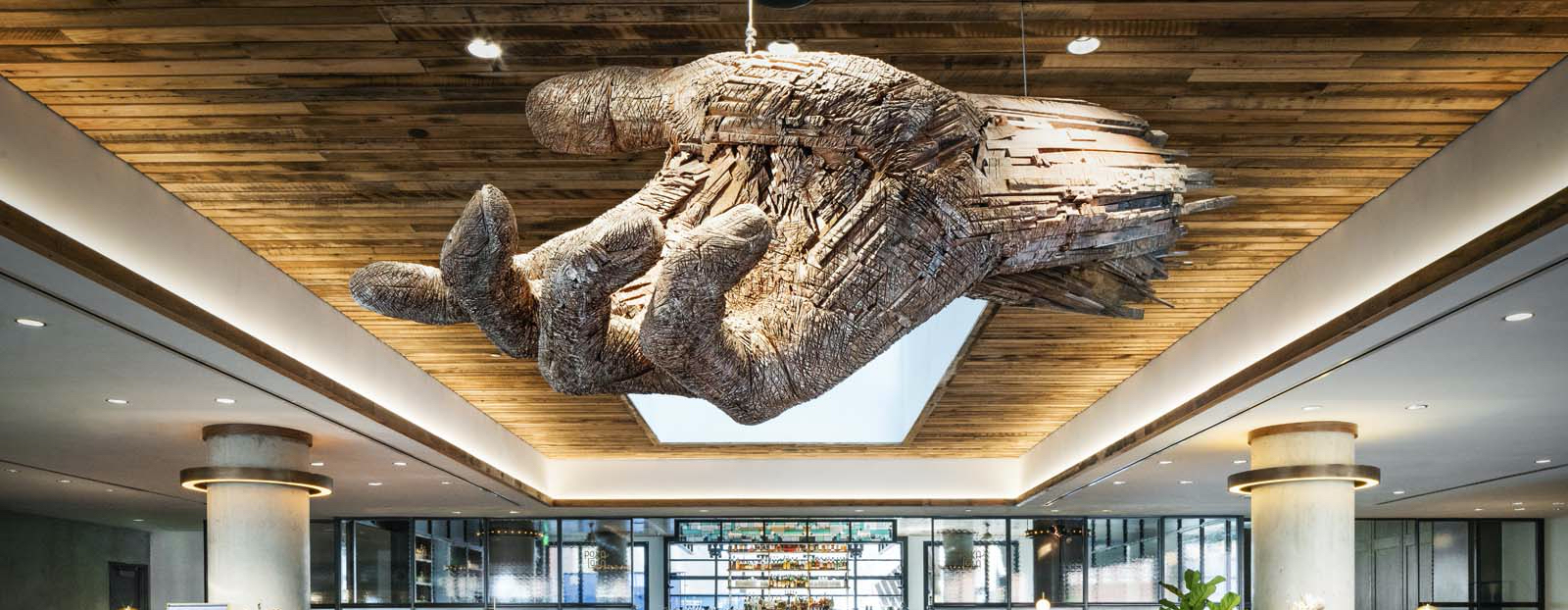
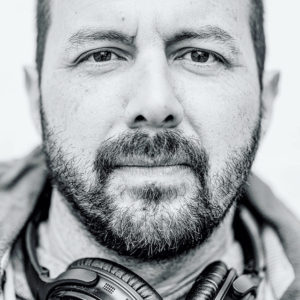
Andrew Ramiro Tirado is a Colorado-based artist who is best known for his award-winning large-scale sculptures and paintings of human hands. Using wood, metal, or traditional paint and canvas, Andrew combines his unique artistic eye with decades of experience as a craftsman to create remarkable pieces that are stunning in both their size and presentation. His hand sculptures can exceed ten feet in length and are sometimes displayed hanging from the ceilings of galleries or buildings—when you see Andrew’s work, there is no mistaking who created it!
Andrew grew up in Colorado and graduated high school with the intention of studying and pursuing art as a vocation. During college, he landed a job in New York City, working as an assistant for the renowned artist Chuck Close—a coveted position for any budding artist. But soon after leaving New York, Andrew decided to walk away from making art, and he stayed away for 23 years. But in 2012, a serendipitous life-changing event rekindled his interest in making art, and he returned to the art world with full focus and passion. Just four years later, in 2016, Andrew resigned from his job at Colorado College and began pursuing art full time… and has never looked back.
We met at Andrew’s brand new Colorado Springs studio, which happens to be just a few blocks from my own house. We had a wide-ranging discussion covering everything from making art to mountain climbing to the realities of life as a full-time artist. We started out by discussing his upbringing in Colorado Springs and how he found his way to art school and eventually, New York City working for the world-famous Chuck Close. Then we discuss his decision to leave the art world, and why—after more than two decades away—he decided to return to making art. We talked about the importance of writing to Andrew’s artistic process, as well as lessons he’s learned from spending time up high in the Colorado mountains. And finally, we talk about artistic heroes, favorite books, favorite films, and Andrew offers wisdom to those who dream of pursuing art as a full-time vocation.
Andrew is an amazingly thoughtful and humble guy, and I greatly admire his soft-spoken and wise approach to chasing his dreams. Be sure to check out all of Andrew’s art on his website, but for right now, enjoy this insightful conversation with Andrew Ramiro Tirado!
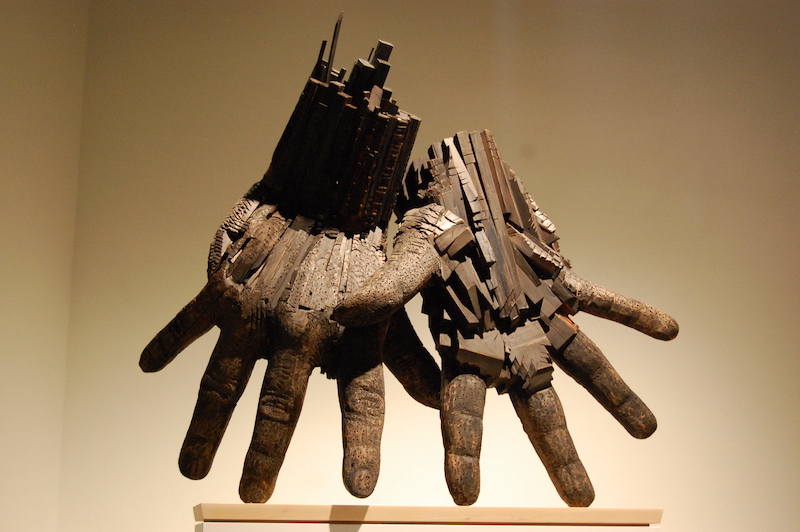
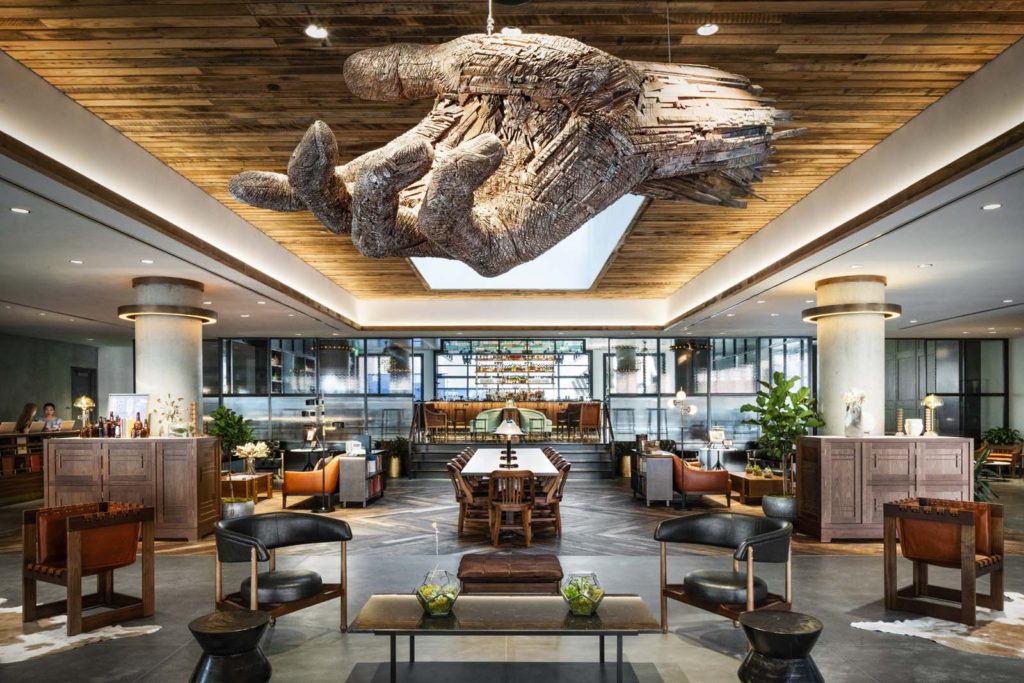

Photos courtesy of Andrew Tirado, headshot by James Cochrane
Click Here to Download on iTunes
—
Click Here to Download on Spotify
—
Click Here to Download on Google Play
—
Click Here to Download on Stitcher
—
Episode Notes
Topics Discussed:
- 4:00 – Andrew’s background
- 6:15 – Studying art in school
- 8:00 – Working for Chuck Close
- 11:00 – “Leaning in” to opportunities
- 12:00 – Lessons learned from Chuck Close
- 15:30 – The importance of self-imposed limitations
- 18:00 – Taking a hiatus from art
- 21:30 – The moment he decided to return to art
- 25:30 – Making his first-hand art piece
- 31:00 – Discovering a demand for his art
- 34:00 – Decision to pursue art full time
- 36:00 – Chasing the feeling of “peak experiences”
- 41:00 – Importance of “inflection points”
- 42:30 – Importance of writing to Andrew’s writing process
- 47:30 – How time in the mountains has affected his art
- 50:00 – Andrew’s artistic heroes
- 52:45 – Favorite books
- 55:00 – Films
- 59:00 – Favorite location in the West
Information Referenced:
- Andrew Ramiro Tirado
- Andrew’s Blog
- Andrew on Instagram
- Floyd Tunson
- Chuck Close
- Bemis School of Art
- Colorado College
- Strand Book Store
- Canoecraft by Ted Moores
- Masters of Scale Podcast
- James Surls
- James Herriot
- All Creatures Great and Small by James Harriet
- Lawrence of Arabia
- Road House
- NOLS
- Art Institute of Chicago
Enjoy this episode? Then you might like these as well:
- Geoffrey Keating – Built to Last
- Cate Havstad – Cultivating Creativity & Craftsmanship
- Rebecca Jewett – Big Ideas for the New West
- Peter Heller – Chasing the Flow
- Camrin Dengel – Slow Living in the American West
Jessica Ilalaole – Creating Home in the High Desert

Jessica Ilalaole is a New Mexico-based artist who specializes in handcrafted jewelry inspired by the natural world and the landscapes of the American West. Through her online store CobraCult Jewelry, Jessica has built a loyal following of customers and admirers who are drawn to her uniquely stunning designs, as well as her authentic and unconventional lifestyle. Jessica’s personality is a unique mix of confident yet humble, social yet solitary, fiercely independent yet fully devoted to her friends and family– a special blend of traits that have allowed her to create unique art and one-of-a-kind life.
Jessica grew up in Hawaii but now lives on a spectacular property in Northern New Mexico on the western slope of the Sangre de Cristo mountain range. Her jewelry studio looks out onto the mountains, and she and her partner Cody are in the process of building an adobe cabin from the ground up. But while the views are spectacular, their lives are currently fully focused on hard work– home construction, jewelry making, and the day-to-day realities of running Jessica’s business. Their vision and work ethic are extremely inspiring, and it was a pleasure to meet and record this episode at the property.
We sat down in Jessica’s studio and had a wonderful and wide-ranging conversation. We started by chatting about the property– how they decided to move there, how they acquired it, and their plans for it. We then talked about Jessica’s journey as an artist, and when and why she decided to make a go of it as a full-time jewelry maker. We discuss the influence of her parents, her artistic influences, her love of motorcycles and tattoos, and how social media has helped her to grow her business. We also discuss her commitment to positivity, the roots of her independent streak, and she offers some excellent advice for other aspiring artists. And as usual, we discuss favorite books, films, the best advice she’s ever received, and more.
Be sure to check the episode notes for links to everything. Hope you enjoy!
Photos courtesy of Jessica Ilalaole
Click Here to Download on iTunes
—
Click Here to Download on Spotify
—
Click Here to Download on Google Play
—
Click Here to Download on Stitcher
—
Episode Notes
Topics Discussed:
- 3:10 – Jessica describes her property
- 5:40 – Growing up in Hawaii
- 8:10 – Being considered a haole
- 10:10 – Source of Jessica’s independent streak
- 11:10 – Similarity to parents
- 15:55 – Early years as an artist and jewelry maker
- 18:00 – Decision to make jewelry making a full-time job
- 20:00 – Skills learned from taking jewelry classes
- 22:00 – Deciding to take become a full-time artist
- 24:10 – Challenges of working solo while being a social person
- 25:40 – Relationship with Cody and building their cabin
- 30:10 – Artistic influences
- 31:10 – Riding motorcycles
- 37:00 – Jessica’s connection to tattoos
- 39:40 – Independent streak revisited
- 42:00 – Daily routines
- 44:40 – Exciting personal news!
- 47:30 – Long-term plans
- 49:10 – Influences or heroes
- 51:40 – Meaning of CobraCult
- 54:00 – Instagram’s role in her business and life
- 59:30 – Favorite books
- 1:03:00 – FAvorite documentary
- 1:04:00 – Favorite location in the West
- 1:05:30 – Best advice ever received
- 1:09:30 – Advice for aspiring artists
Information Referenced:
- CobraCult Jewelry
- Jessica on Instagram
- Cody’s Instagram
- Questa, NM
- Hawaiian telescope controversy
- Haole
- Buffalo Exchange
- Oregon College of Art and Craft
- Hayfork, California
- Trinity Alps
- Emerald Triangle
- Long Way Round
- Cheyenne Sawyer tattoo artist
- Make Your Bed by Admiral William McRaven
- Daily Stoic by Ryan Holiday
- Temperance Creek by Pamela
- Chris Eyer / Muledragger episode
- Happy People documentary
- Wind River Range
- Creative process meme
Enjoy this episode? Then you might like these as well:
- Cate Havstad – Cultivating Creativity & Craftsmanship
- Jillian Lukiwski – Art and Adventure in the American West
- Jessica Lewis – Doing More With Less
- Live in Bozeman – Cate Havstad, Jillian Lukiwski, Becca Skinner & Juanita Vero
- Stephen Smith, Part 2 – Evolution & Reinvention
- Robert Krapfel – On Living a Purpose-Driven Life
My 12 Favorite Books of 2019
My 12 Favorite Books of 2019
I thoroughly enjoyed every single book that I recommended in 2019—I sure as hell wouldn’t have recommended them otherwise! But for one reason or another, the twelve titles below managed to carve out a special spot in my brain.
Here, in the order that I read them, are my favorite books of 2019:
Body of Water: A Sage, A Seeker, and the World’s Most Elusive Fish by Chris Dombrowski – Dombrowski is a gifted poet and a highly skilled angler, giving him the perfect literary toolbox to tell the heartwarming and heartbreaking story of a legendary Bahamian bonefishing guide. Body of Water has all the ingredients I love: honest memoir, outdoor adventure, fascinating history, captivating characters, and lyrical nature writing.
Return on Courage: A Business Playbook for Courageous Change by Ryan Berman – In today’s disorientingly fast-paced world, playing it safe or embracing the status quo will, more often than not, drive organizations into the ground. Taking lessons from everyone from Navy SEALs to CEOs, Berman lays out his case for embracing courage in all aspects of business and life.
The Dog Stars by Peter Heller – An action-packed, sometimes-violent, always-thrilling tale of life along Colorado’s Front Range… post-apocalypse. If you love the landscapes of northern Colorado and also enjoy scaring the shit out of yourself, this is your book.
The Crowded Hour: Theodore Roosevelt, the Rough Riders, and the Dawn of the American Century by Clay Risen – I’ve read way too many TR books, and my standards are snobbishly high when it comes to any newcomers’ attempts to tell the 26th President’s story. But Risen nails it. Enough TR antidotes to placate a superfan like me, balanced with fascinating history of everything from the Spanish-American War to the individual character sketches of Rough Riders.
Downriver: Into the Future of Water in the West by Heather Hansman – Most of my professional life revolves around water in the West, and this is my favorite book on the subject to date. A perfect blend of adventure narrative and educational lesson, this book is an ideal entry point for people looking to learn more about water issues facing the West, minus the Ambien-like side effects that accompany most water-related books.
On Writing: A Memoir of the Craft by Stephen King – This book had been recommended to me time and time again, and I’m so glad I finally read it. Part memoir, part writing mechanics, and part creative motivation, the book lays out the dedication and obsession required to be a successful author.
The River by Peter Heller – This is Heller’s most recent book and the one I identify with the most. Two college-age guys head out on a wilderness adventure (which I did many times), and the whole thing devolves into a murderous nightmare (which I thankfully never experienced!).
Creative Calling: Establish a Daily Practice, Infuse Your World with Meaning, and Succeed in Work + Life by Chase Jarvis – A practical guide to pursuing creative endeavors, whether as a full-time job or a side passion project. This book ranks alongside The War of Art and all of Seth Godin’s books for the most useful books on producing creative work.
That Wild Country: An Epic Journey through the Past, Present, and Future of America’s Public Lands by Mark Kenyon – Most citizens who love the outdoors are aware that our public lands are under attack. But I’d wager that few understand the rich history of these places, nor the specific threats to this uniquely American birthright. Kenyon educates and entertains, and the end product is a book that should be required reading for all public lands users.
Civilized to Death: The Price of Progress by Christopher Ryan – For millions of years, humans evolved to live in certain ways, eat certain foods, and maintain certain social structures, many of which are now impossible thanks to modern society. Yes, humans have made “progress,” but are we better off as a result? This book explores that question brilliantly.
Querencia by Stephen Bodio – I was lucky enough to receive this memoir as a gift, and I devoured it in just a few sittings. Beautifully written, deeply personal, and at times hilarious, I consider it a “must-read” for any native easterner who moves West of the 100th Meridian.
River of Traps: A New Mexico Mountain Life by William deBuys & Alex Harris – A book that combines stunning prose and striking photographs, this memoir masterfully describes the unique landscape, culture, and history of life in the northern New Mexico foothills. A moving tribute to immersion in new cultures and a way of life that has all but disappeared.
